Fleetlog
The Happiness Index
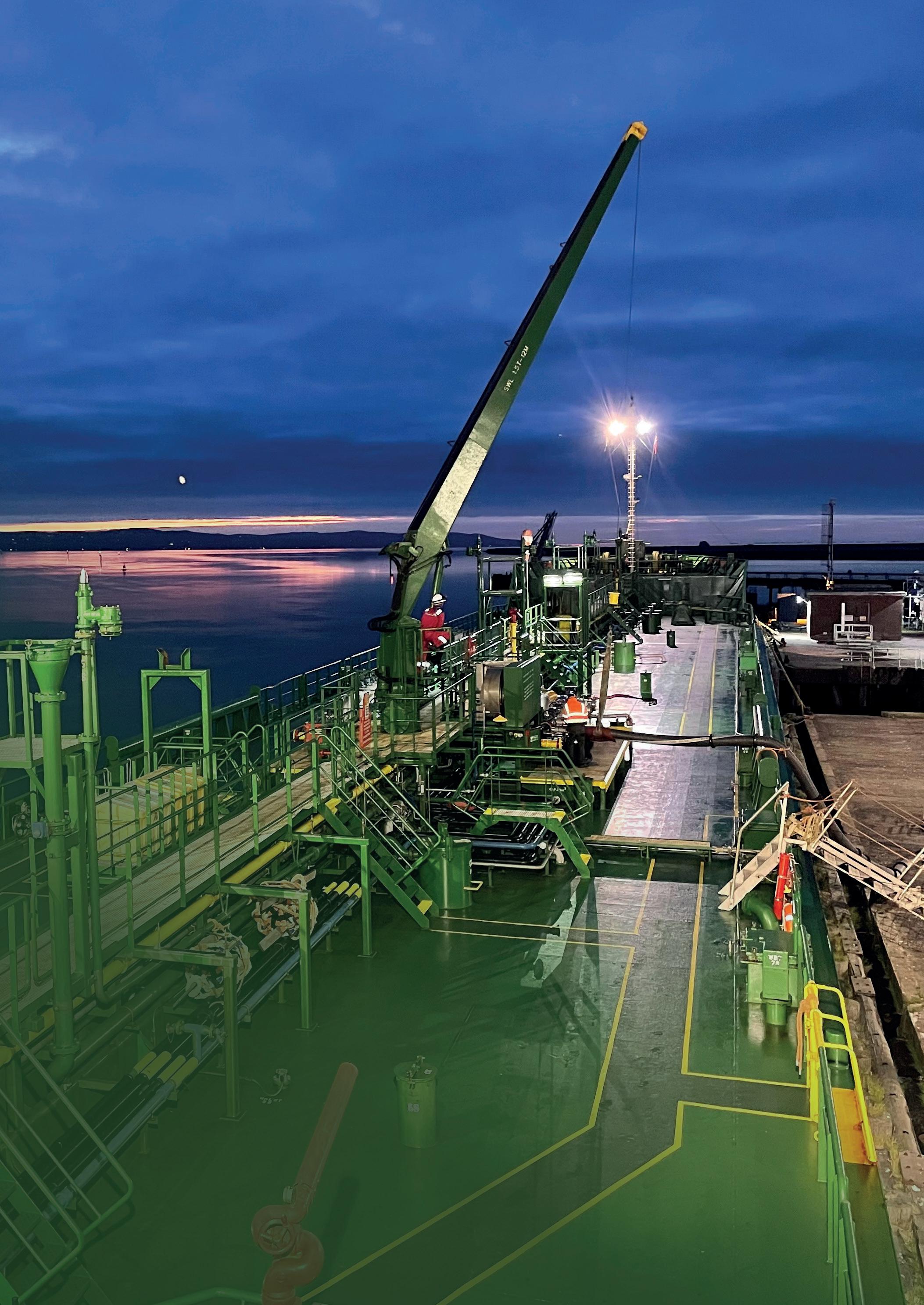
In this issue
Air
A Breath of Fresh
Maritime Just Transition Task Force
Volume 63 September 2023
Editor
Renée Seggelinck
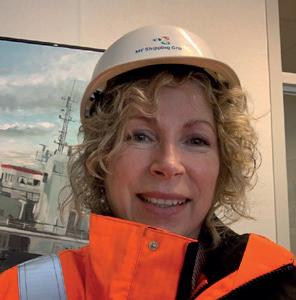
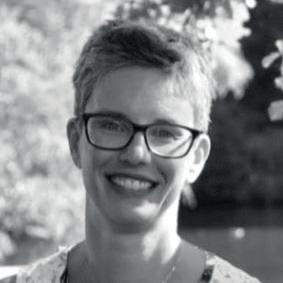
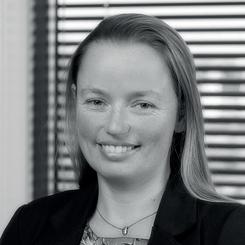
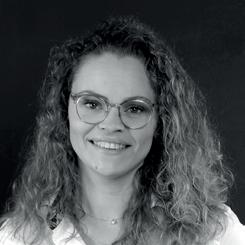
Ideas, comments and input can be send to:
MF Shipping Group
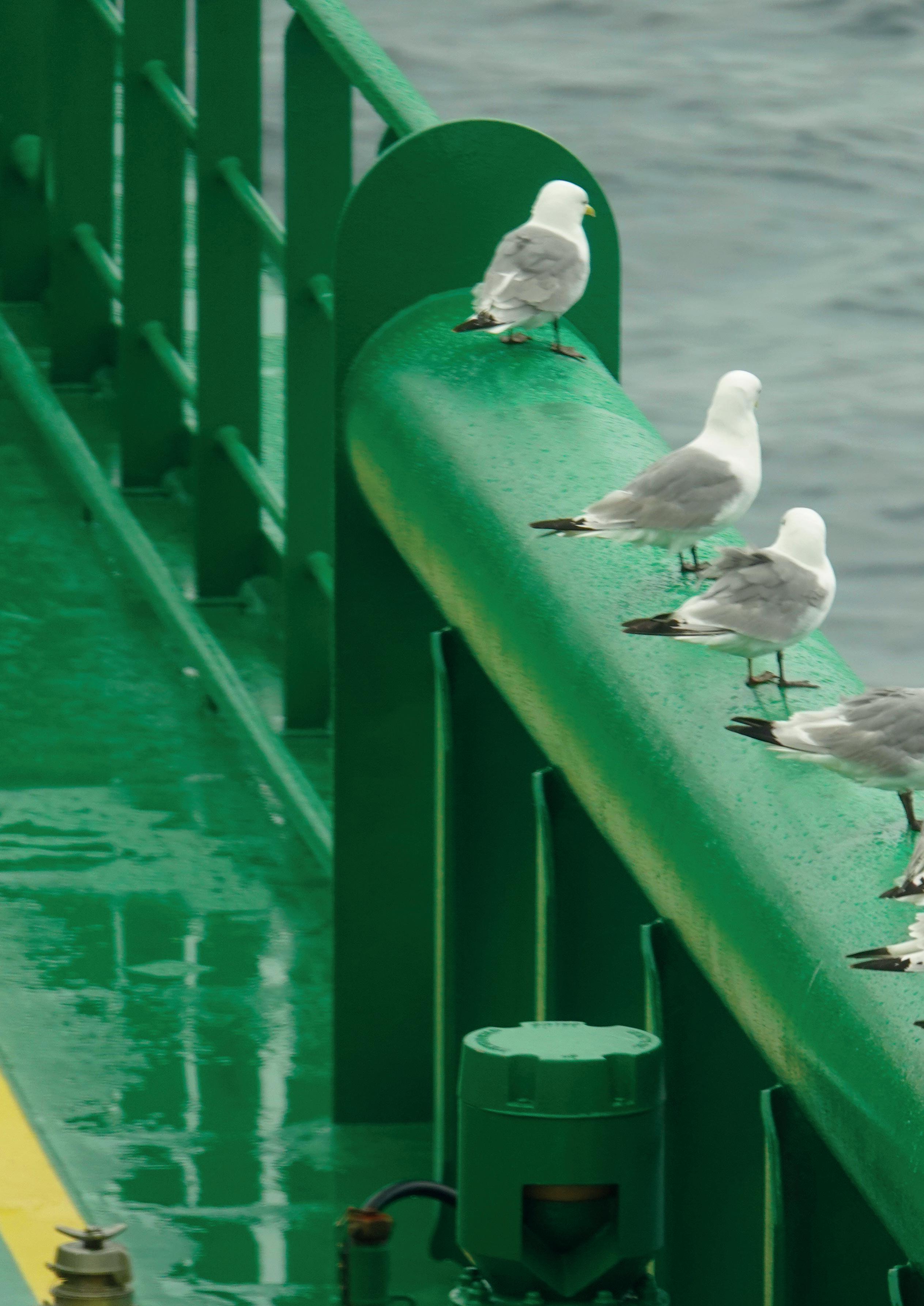
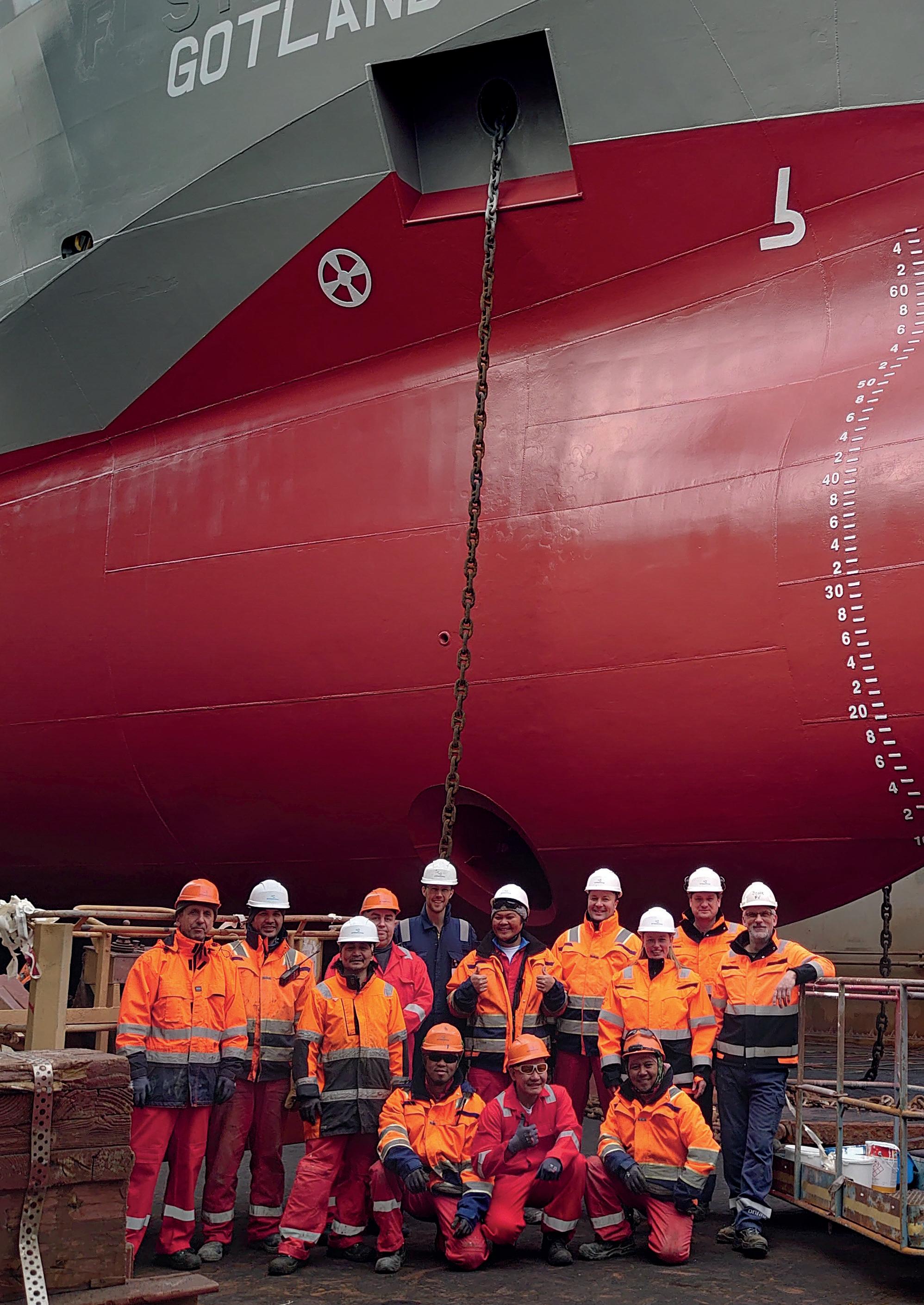
Attn.: Editorial team Fleetlog
P.O Box 86, 9930 AB Delfzijl
The Netherlands
Phone: +316 13 65 34 28
Email: communication@mfgroup.nl
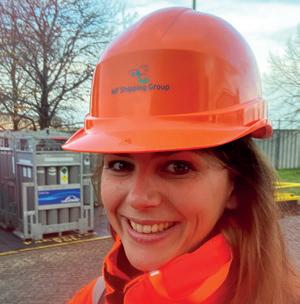
Editorial Team:
Legal:
The contents and/or opinions expressed by writers of articles must be in line with our company values and company objectives. The editorial team has the right to adjust or refuse placement of an article when it is inconsistent and/or offensive.
Fleetlog online
Concept & realization:
www.tombrok.nl
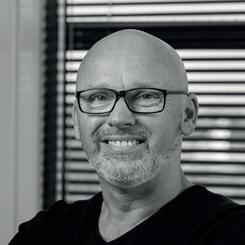 Colofon
Ellen Brugma Stephanie Kanon René Boerema Wendy van der Laan
Editor
Lucie Nicolai
Colofon
Ellen Brugma Stephanie Kanon René Boerema Wendy van der Laan
Editor
Lucie Nicolai
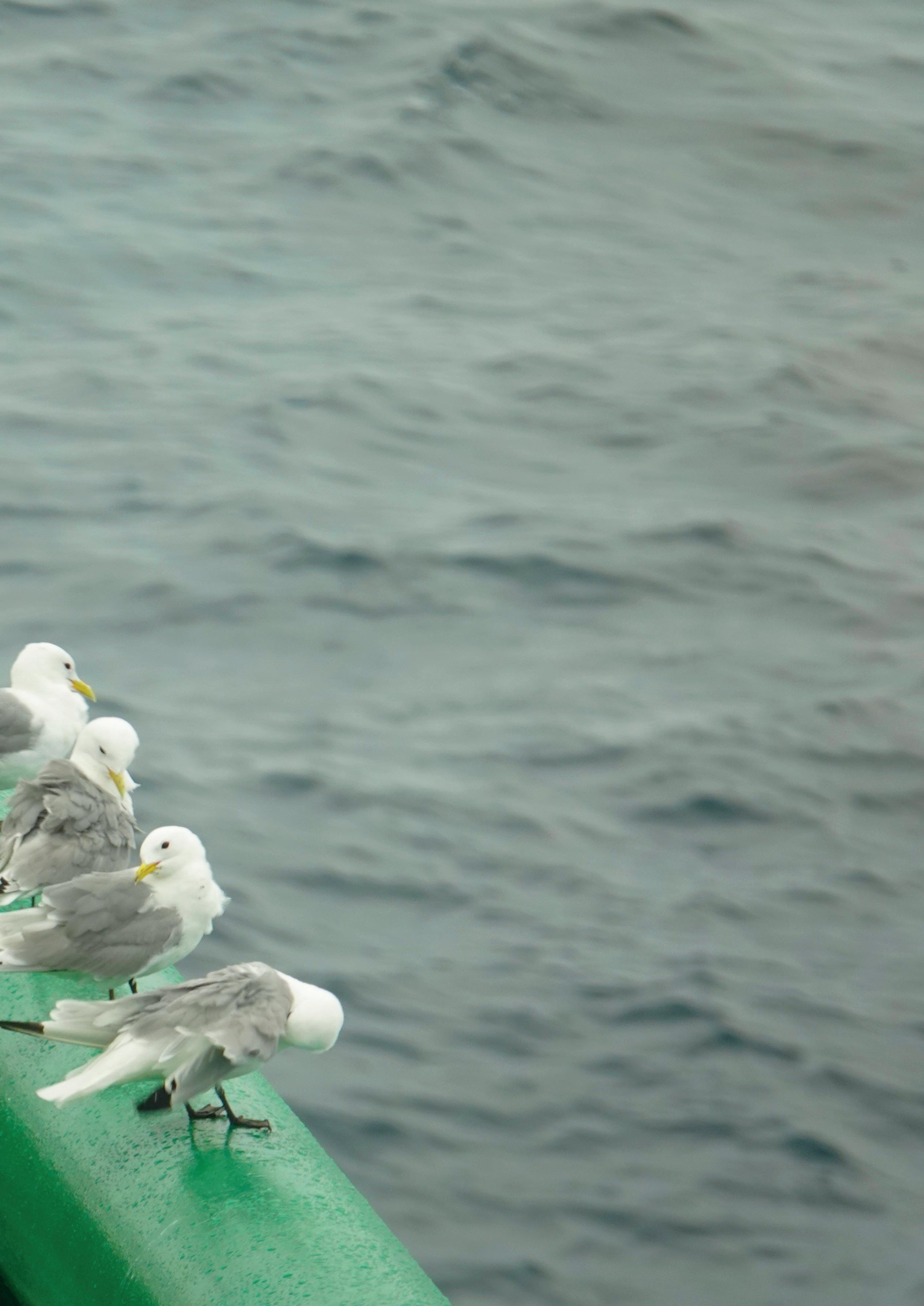
Dry docking of the Thun L-Vessels In this issue 3 Porte State Control, Vettings & Audits A Breath of Fresh Air Keep it in the Family Maritime Just Transition Task Force 04 06 10 12 The EU Emissions Trading System (EU ETS) Drugs & Alcohol Testing The Passion of.... How are you doing? 16 23 18 20 Corporate Personnel Overview 26 28 A Shot in the Dark 32 Welcome on Board A Life Full of Variety at Sea and Ashore The Happiness Index 34 38 40 Crew on Board 42
A breath of fresh air
Discover our refreshed corporate identity
It’s time for a new look! Just as a vessel needs a docking from time to time, sometimes a corporate identity needs a subtle refresh. It is important to keep up to date, because an outdated logo or corporate identity can give the impression that we are not keeping up with the times. So we opted for a refresh that reflects what MF Shipping Group stands for: Moving forward as a leading partner in safe and sustainable ship management.
In this editorial, we would like to tell you why we have taken this step and what changes we have made. More importantly, we want to emphasize that it’s the people, that’s all of you, behind the scenes, as well as the vessels, that form the very heart of our business. We’re not just about maritime expertise and shipping operations; we’re about the passions, talents, and dedication that each member of our team brings to the table. Our colleagues, like Sergei Ivanchikov, exemplify the multifaceted talents that make our MF Shipping Group family exceptional. Through these stories, we aim to showcase not only the vessels we operate but also the remarkable individuals who breathe life into our organization, making it more than just a business; it’s a community of passionate individuals dedicated to our shared success.
In light of our commitment to maintaining our recognizable identity without jeopardizing the trust, recognition, and goodwill we’ve diligently built over the years, we decided to reevaluate our core values and logo. This process drew inspiration from established brands such as Coca-Cola and Volvo, which have successfully made subtle adjustments over time. While our goal is to evolve and adapt, we also recognize the importance of preserving the essence of our logo and brand that our stakeholders have come to know and trust.

Editorial
4
So what are the subtle changes?
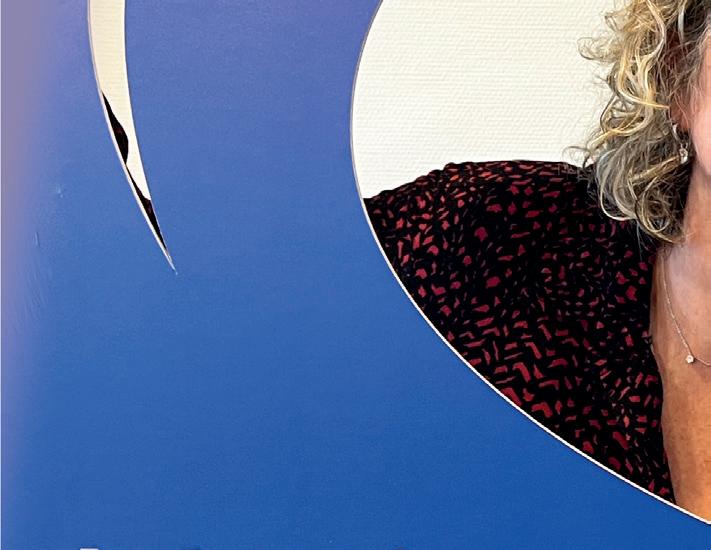
We have refreshed the colours of the radars to create more contrast, which is important in digital representations. We have also changed the font and used sections of the radar as a stylistic element. You will first see these changes in this Fleetlog, our first major appearance of the refresh.
Did you know that the three spheres in our logo, symbolising vessel radars, originally stood for different divisions? Now they represent our core values and what MF Shipping Group stands for. Radar is essential for safe navigation at sea, providing constant surveillance to avoid hazards and ensure the safety of ship and crew. With its accuracy and reliability, radar provides essential data for detecting objects and navigating in complex maritime environments. And by integrating radar with digital technologies, we are demonstrating our innovative and forward-looking approach with a focus on sustainable ship management.
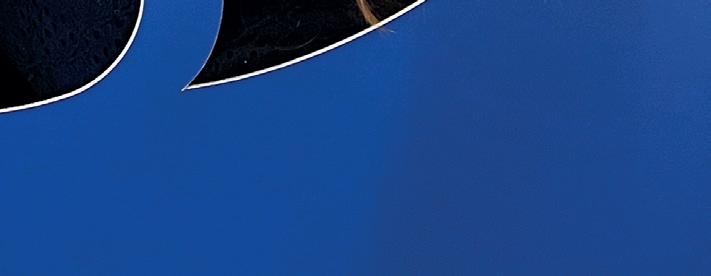
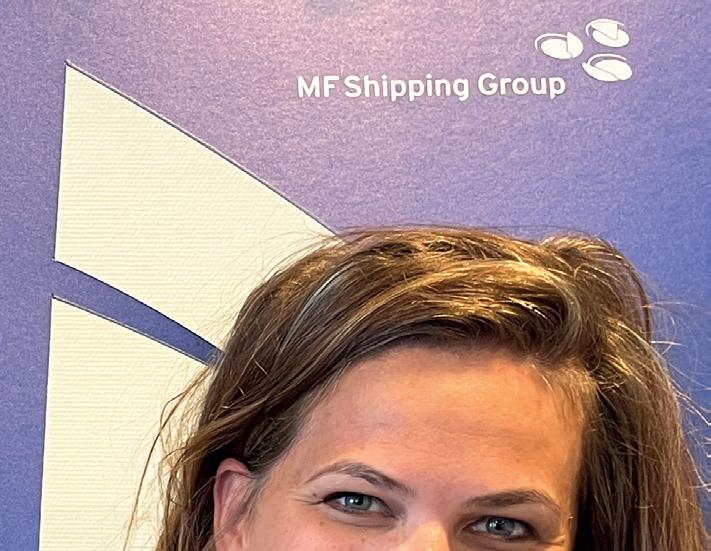
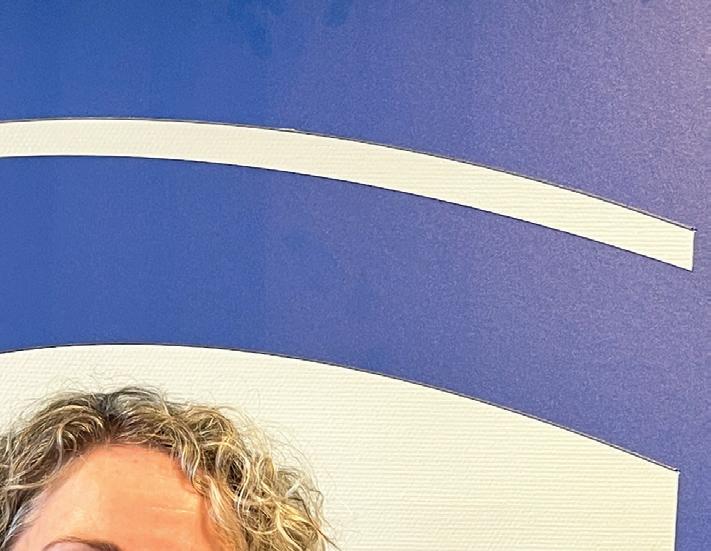
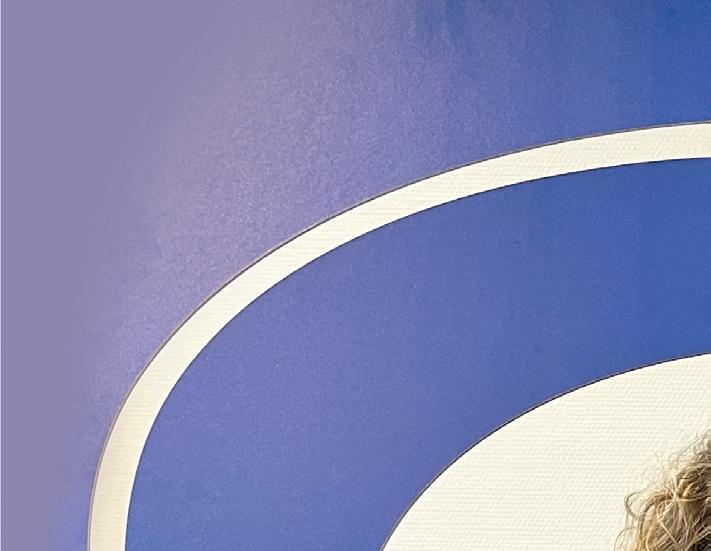
The refreshing of our corporate identity is just the beginning. We will gradually implement this new identity across all our communication channels and marketing materials, including a greater focus on the people behind our organisation. We want to share stories and highlight the diversity of our team to give a more complete picture of who we are and what we do. You are most welcome to send us stories, photos and comments.
We are proud of our new look and believe it will help us stand out and be recognised. We hope that you are as excited about it as we are.
We hope you enjoy reading this edition of the Fleetlog!
 Lucie Nicolai, Chief Corporate Communications & PR Officer Renée Seggelinck, PR & Communications Specialist
Lucie Nicolai, Chief Corporate Communications & PR Officer Renée Seggelinck, PR & Communications Specialist
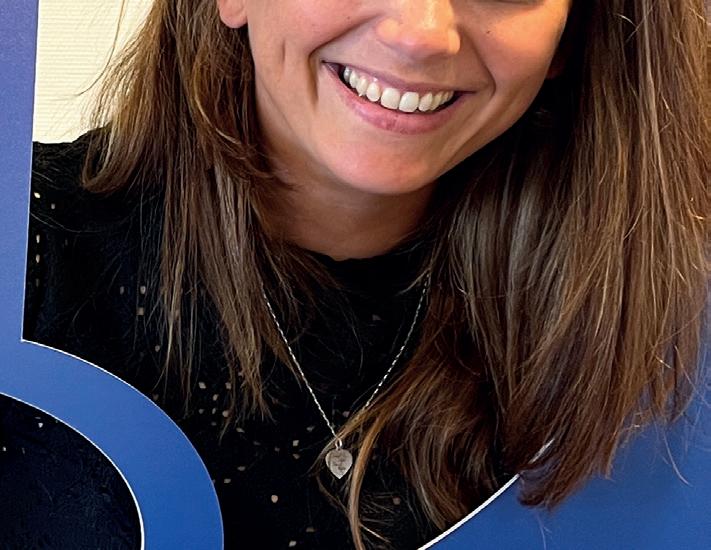
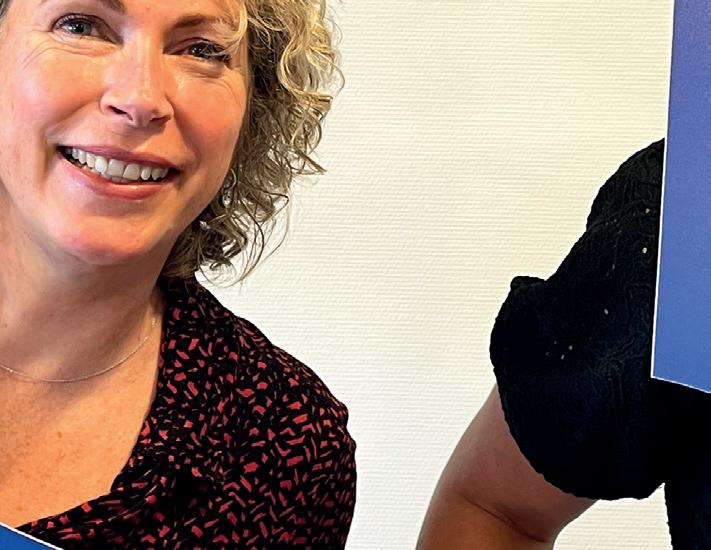
5
Keep it in the Family
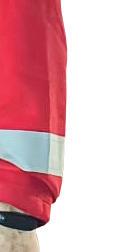
Sharing a similar maritime passion within the same company. At MF Shipping Group we are proud to have crew on board our vessels who are both family and colleagues! A good reason for us to interview these family members and find out more about the journey that led them to our company. A story of seafaring generations. This time the story of father and son Raisuotis. Olegas is Chief Engineer onboard Thun Eos and his son Romanas is Chief Engineer onboard Thun Garland.
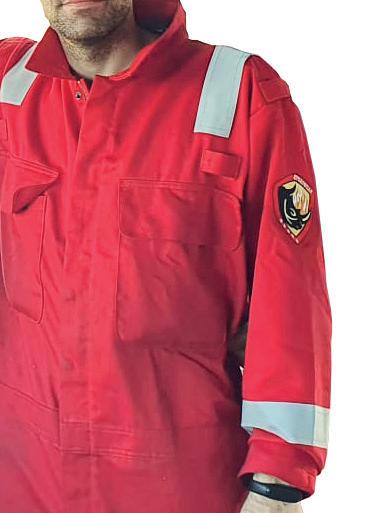
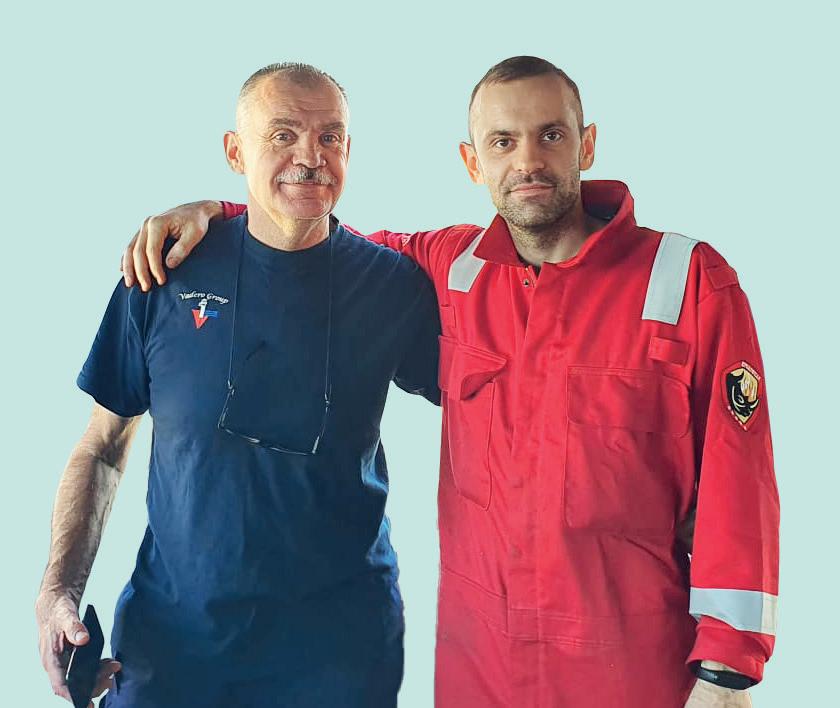
How did you both end up in the maritime world?
Olegas: I grew up in a seafaring family in a port town and, conveniently, the Marine College was just across the road from the house where my parents and I lived. This greatly influenced my decision to pursue a career in shipping. I qualified as a marine engineer in 1981. My first experience at sea was onboard a sailing vessel as a cadet. Over the years, I’ve had the privilege of working on a wide range of vessel types, including fishing vessels, tugs, bulk carriers, timber carriers and tankers, in a variety of positions. These opportunities have taken me to many exotic countries, where I’ve even spent up to a year in one place.
Romanas: My journey into the maritime industry began on 18 June 2011, when I embarked on my first contract as an engine cadet on board the vessel “CORONEL”, a modest coaster. Strangely enough, I have a lasting memory of all the ships I’ve been on. In June 2013, I successfully completed my studies and obtained a Master’s degree in marine engineering. On 1 February 2014, my career as an engineer officially began. I started as the fourth engineer on the large chemical tanker “mt RIMAR”. This period holds a special place in my memory as I achieved a significant milestone by transitioning from an Engineer Cadet to an Engineer Officer while facing challenges in Africa, particularly in Nigeria where our vessel was detained. Fast forward less than 9 years and I now hold the esteemed position of Chief Engineer on the Thun Garland. Reflecting on the hurdles I’ve overcome during this time, I’m pleased with my professional growth and achievements.
Was it always your dream to become Chief Engineer?
Olegas: If you interpret the saying: “Those cadets are bad who don’t dream of becoming an admiral”, it is clear that it is essential to strive for higher positions and goals. But seriously, yes, I did.

Romanas: Let me put it this way. In 2008, when I finished school and was thinking about my next steps, I initially set my sights on becoming a naval officer. However, that year fate intervened and my university didn’t offer a programme for Navigational Officers. As a result, I found myself on the engineering track. A year later, the university introduced a Navigational Officer programme, but by then I had already made up my mind to stay with Engineering. Fate seemed to have guided my decision, and I’m aware that my father is proud of the path I’ve chosen. To summarise the story and answer the question directly: Yes, I wanted to be a Chief Engineer. This is in line with the focus of our studies and the purpose of our chosen careers.
What aspects of your job do you enjoy the most?
Olegas: Honestly, it’s kind off tough for me to put my finger on what I like the absolute most about my job. I mean, over all these years, the job has sort of become a part of me, and vice versa. It might sound simple, but I just genuinely enjoy it.
Romanas: From a practical angle, I really dig that our work engages both our hands and our brains. On the moral side of being a seafarer, it’s like this: you spend half the year out there on the ship, and the other half at home, with your family by your side every single moment.
Can you recall the best moment in your career so far?
Olegas: Sometimes, you just get this feeling that your job really matters, not just to you but to the people around you as well. And during one encounter, a Master I had sailed with before, whom I met again after a year, called me a “lucky man.” And you know what? I’d say, yes, I am!
Romanas: I can say with certainty that a few years back, I was part of the emergency response team during some salvage operations. Saving lives, pulling people out of the water.
7
It’s a rush of adrenaline, for sure. But what’s certain is that at least once in your life, you know you’ve done something good.
Have you ever sailed together on a vessel?
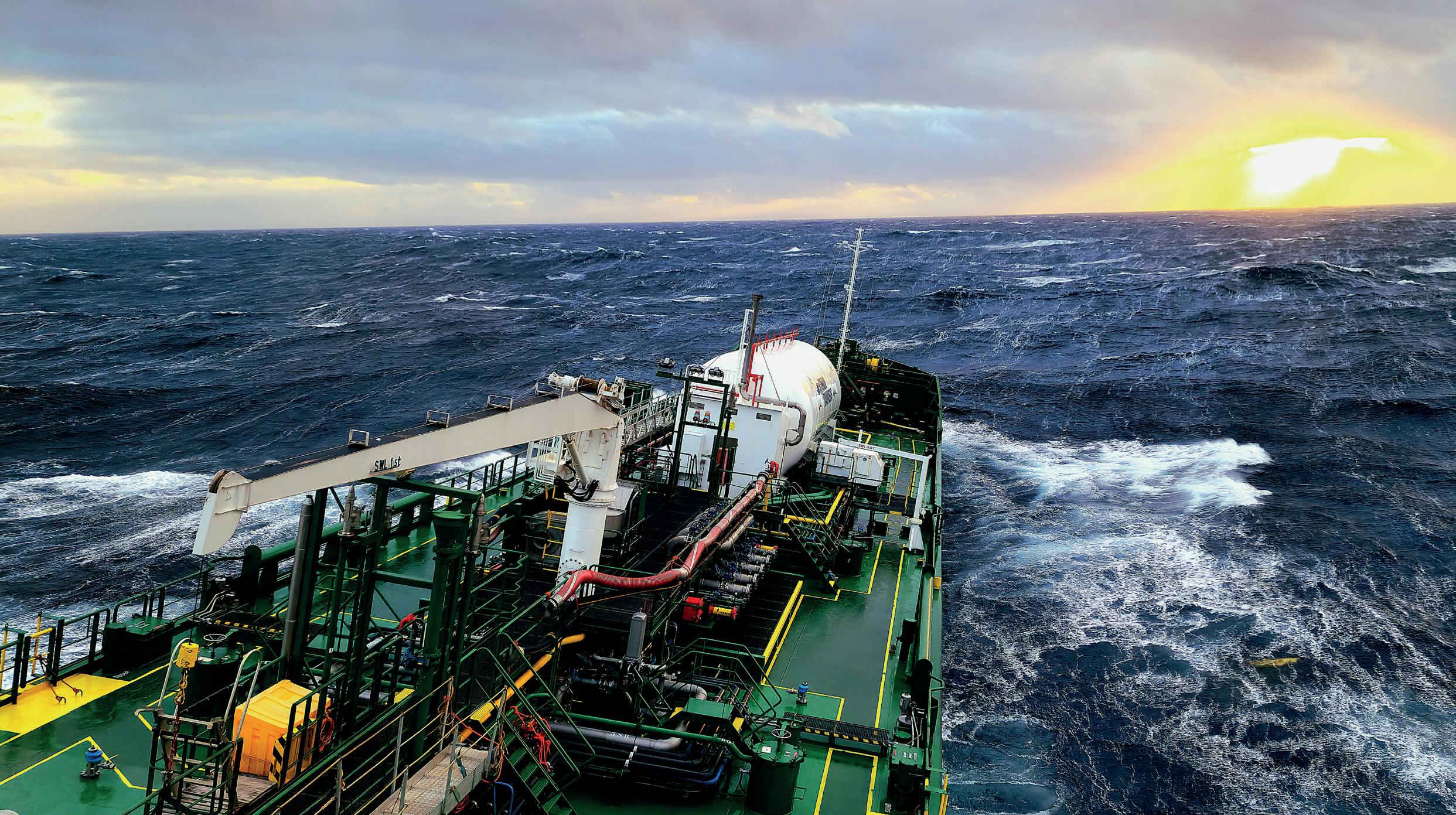
Olegas: No, not yet. But who knows, maybe we’ll try a yacht on holiday ;)
Romanas: No, we haven’t sailed together on a ship. But we have crossed paths twice. Both times we worked for the same company. I think it was in 2018, I was on the ‘Thun Gratitude’ and my father was on the ‘Thun Granite’ in Dublin harbour. The second time was in 2022, when I was on the Thun Equality and my father was on the Thun Eos based in Slagen harbour. Both times were in November. The second time was quite interesting - I arrived during their coffee break and within 4 hours he was waving me goodbye as he signed off in this port.
What did you learn from each other?
Olegas: We are in a constant state of learning, constantly exchanging experiences, sharing solutions to problems and various challenges.
Romanas: Learning from each other is a continuous process for us. Fortunately, we’re in the 21st century and we have Internet access on our ships. That goes for work. As for life’s moments, he gives me a wealth of wisdom. In his eyes, I’m
still his child. I hope I’ll stay that way! His words will always carry a lot of weight for me.
What do you think your father/son is best at?
Olegas & Romanas: It is a bit complicated to define the exact roles of expertise. One of us brings more experience to certain aspects, while the other excels in other areas. But one thing is clear: when challenges arise, we work together to find solutions.
Do you ever consult each other?
Olegas & Romanas: Absolutely, we’re lucky enough to have internet access on board, and if we encounter uncertainties, unknown problems or need information, we simply use our devices to connect. We both try to help each other as quickly and thoroughly as possible, even if it means putting our work aside for a moment.
Do you have a family?
Olegas: Yes, I have a wife, a daughter, a son Romanas (as you know) and four lovely grandsons.
Romanas: I have a family too, a wife and two wonderful sons.
8
How does your family feel about you both working in this profession?
Romanas: I don’t think my mother is very happy that we are both seafarers. The stress she experiences when we’re on board is quite obvious. However, she understands that it was our choice and respects it. As for my dad’s situation, she married him while he was finishing his degree, so I think she had a good sense of what she was getting into. On the other hand, she’s very happy when we’re both back home.
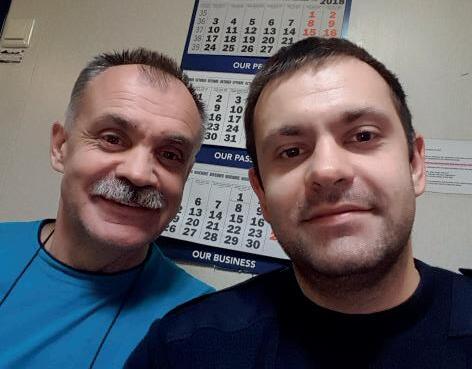
Would you recommend this work to your children?
Olegas: My son’s choice is the answer.
Romanas: At the moment my children are too young to make such decisions. We will see in the future.
What do you think will be the biggest change in the near future?
Olegas: Artificial intelligence is playing a bigger and bigger role in our lives, but... only time will tell how it all develops.
Romanas: The maritime industry will undoubtedly see a surge in robots, AI, automation and more. But one thing is for sure: without seafarers, it won’t work!
What are you most proud of?
Olegas: I consider myself a happy man.
Romanas: That’s a tricky question. I could playfully say “I, I and I, cha-cha”! I am proud of my life and what has been passed on to me in my roots.
If you could have been anything else, would you still have chosen to be a Chief Engineer, or would you have made a different choice?
Olegas: Time and circumstances can influence our choices, but I think I would still have chosen a career similar to mine.
Romanas: As my uncle says: “Why didn’t I study ‘How to become a billionaire’?” That would have been something. It’s a joke, of course, or maybe not quite... When I was a kid, I dreamed of becoming a captain, and sometimes an astronaut, to see if the earth was flat or not. You may be aware that many scientists are still debating this question. However, over time I have come to realise that I really enjoy my job.
What advice do you have for the new generation of seafarers?
Olegas: Trust yourself and always respect others.
Romanas: Follow your dreams, set goals and pursue them. Learn from your mistakes, gain experience and develop your own opinions - they will make you stronger. And above all, remember the famous phrase: “Don’t worry, be happy!
9
Artificial intelligence is playing a bigger and bigger role in our lives, but one thing is for sure: without seafarers, it won’t work
Port State Control, Vettings & Audits
Congratulations to the captains and crew on their excellent results!
mv Gotland
PSC Vetting - 04 July 2023
Crew on board during vetting: Captain S. Sergejev., C/O S. Gayday, 2/O J. Lago, C/E S. Markov, Fitter Y. Mykhalchenko, AB E. Rosales, AB I. Baylon, AB R. De la Rosa, Cook R. Garcia Pagtulon-an.
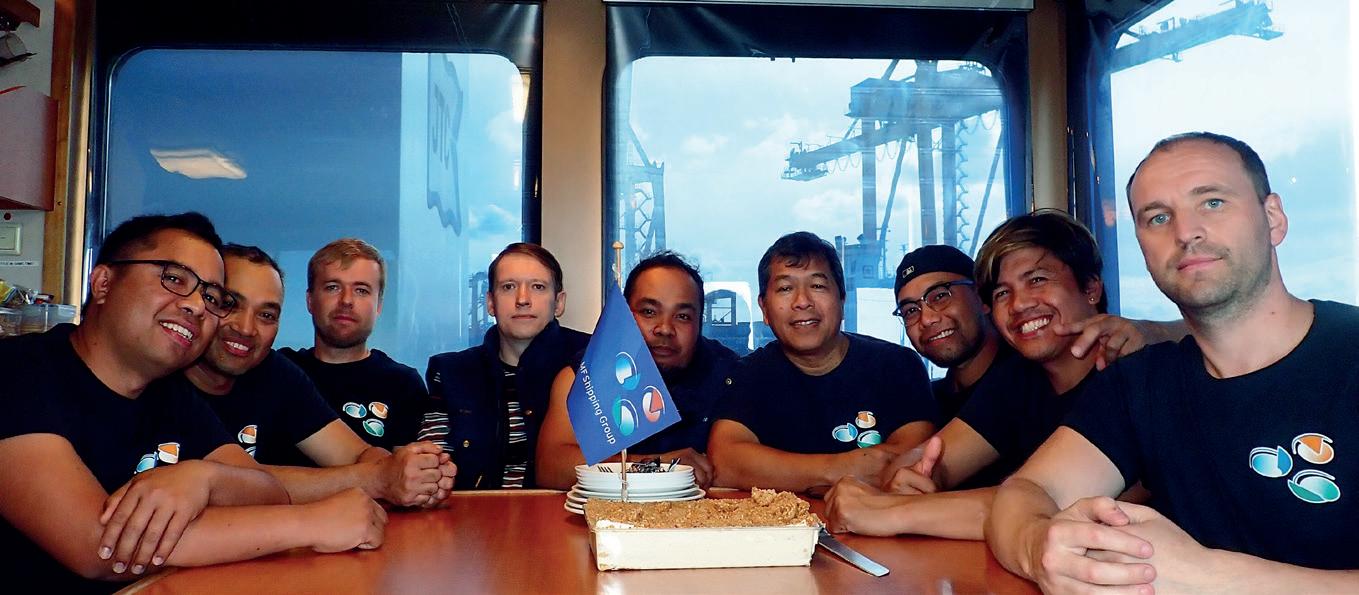
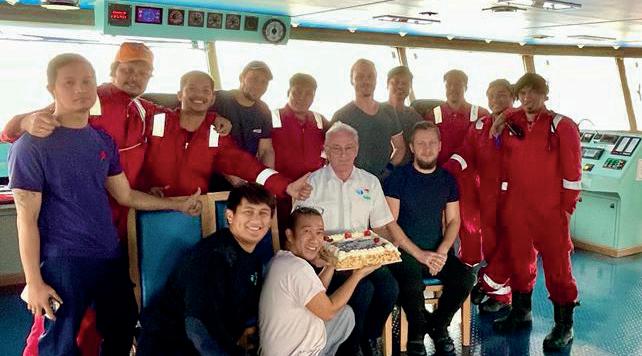
mt Thun Lidköping
VALERO Vetting - 15 July 2023
Crew on board during vetting: Captain F. van der Elsen, C/O I. Novikov, 2/O J. Jumawid, 2/O D. Krashnikov, 3/O J. Cajucom, C/E M. Wieczorek, 2/E D. Santalov, 3/E J. Dumaran, Cook, F. Wania, Bosun M. Barbon, AB R. Malinis, AB E. Undaloc, AB R. Zarate, OS, J. Felisilda
mv Iceland
PSC Vetting - 26 July 2023
From left to right: C/O N. Ayuda, AB A. Valmoria, C/E A. Kuklin, 3/E V. Bezrodnyy, AB J. Arbiz, AB/Cook R. Penaso, 2/O K. Llanes, AB J. Magnawa, Captain E. Kizimov
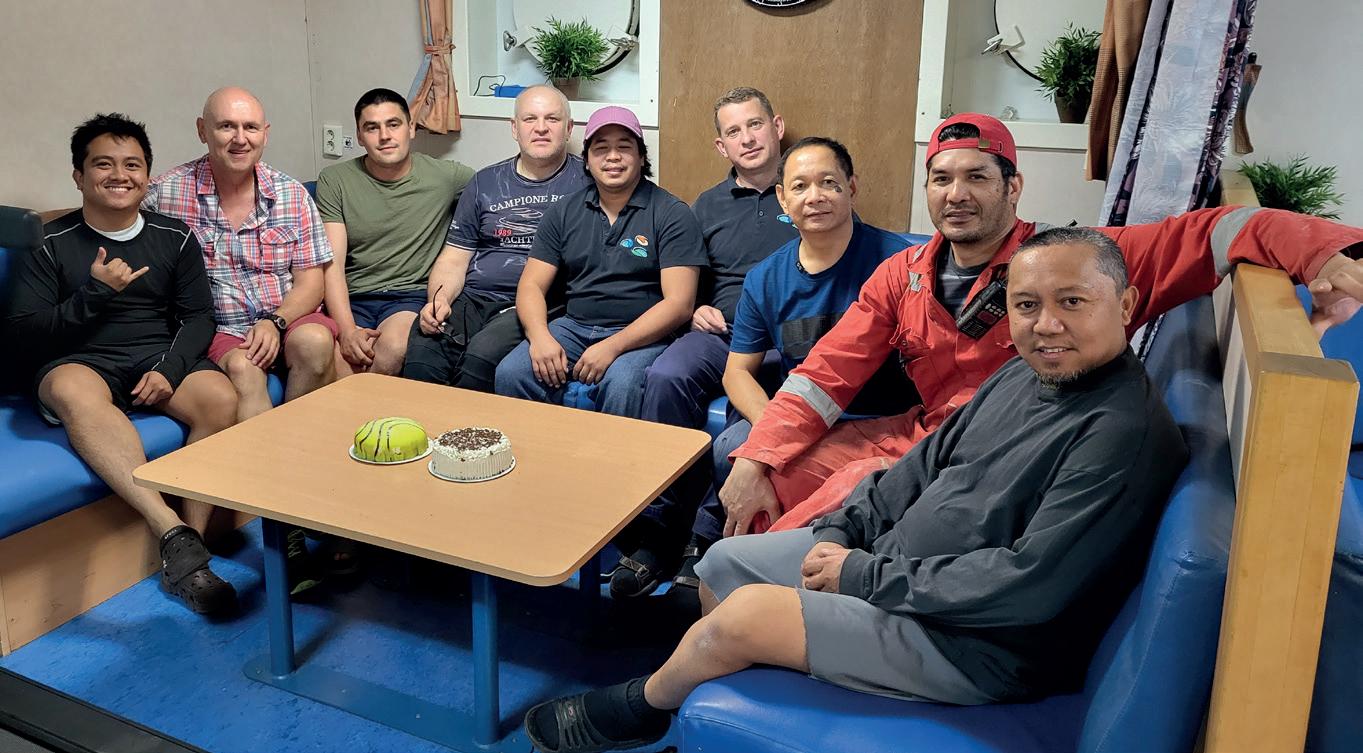
10
mt Thun Liffey
VALERO Vetting - 26 August 2023
From left to right: AB V. Demchenko, C/O A. Syrovatkin, Captain P. van Houten, 2/E C. De Jesus, Cadet S. Schaap, 3/O M. Victorino,; C/E A. Axalan, OS J. Ramos, AB J. Colo, AB V. Pavloskii, Elec R. Sumampong, 3/E O. Mutalienko. Sitting from left to right: Cook L. Onas, Cadet M. Woning, 3/O C. Turalde, Bosun G. Jimenez, 2/O A. Ushakov. Missing on photo: Captain A. Kononov (on board during vetting)
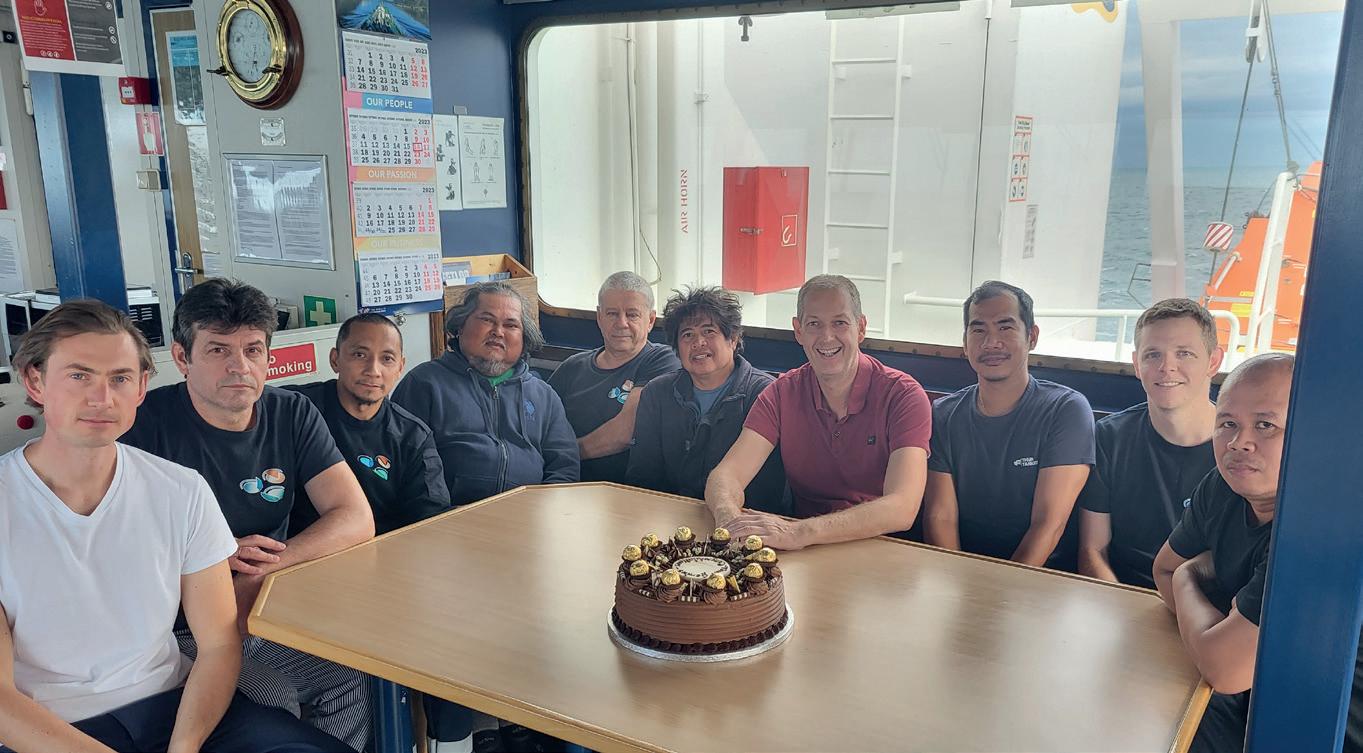
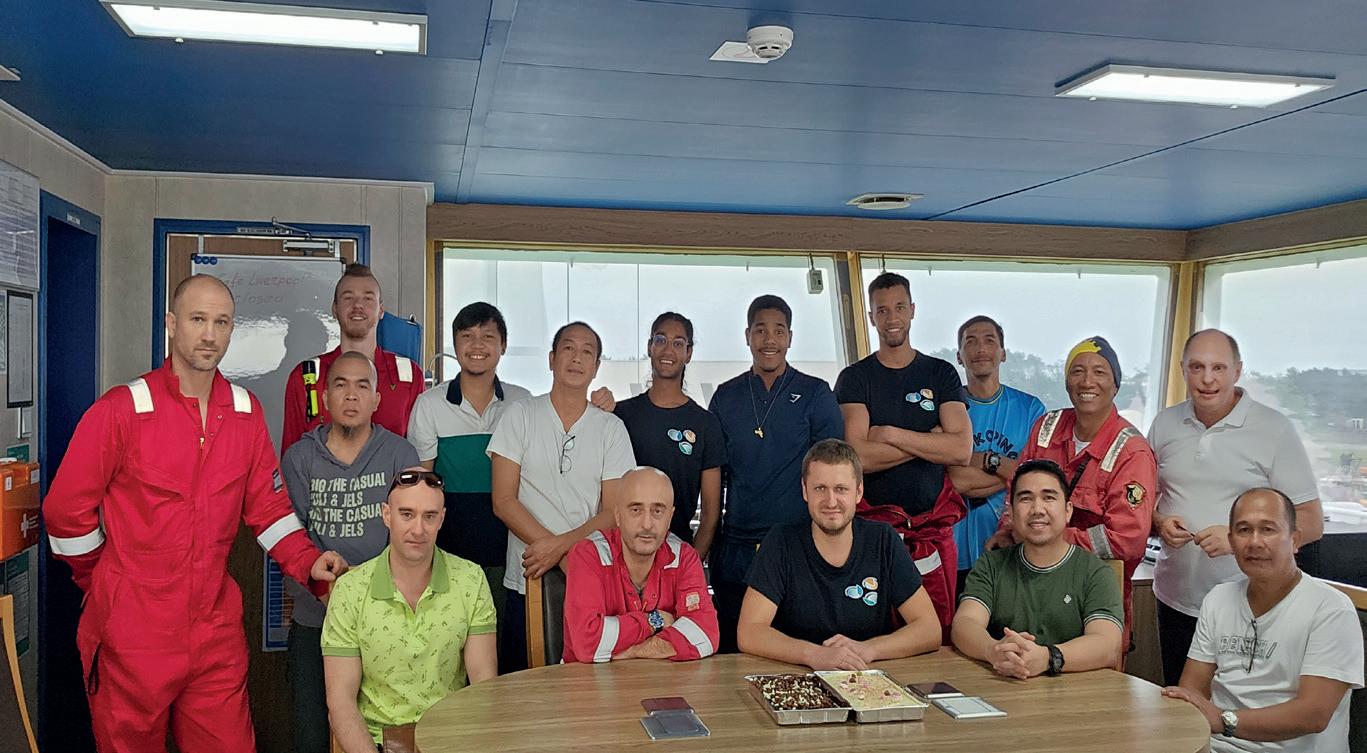

mt Thun Garland
PREEM Vetting - 02 September 2023
From left to right: AB A. Asturias, 3/O A. Surdivillar, 3/O B. Bibat, AB C. Reyes, Captain I. Chumakov, AB D. Cole, C/E D. Fedorin, 2/O J. Lagunday, Standing: 2/E O. Serikov, Cook A. Brieva Jr. Photo was captured by C/O P. Valery.
mt Thun Liverpool
PREEM Vetting - 04 September 2023
From left to right: 2/E G. Garin, AB R.l Dizon, 3/E C. Post (on top), O/S J. Abueva, Cook H. Bognot, Cadet J. Autar, 3/O B. Verginie, 3/O M. Hodge, Bosun Tommy Torres, AB J. Abalorio, Captain Yury Batashev. Sitting from left to right: Off-signing 2/E A. Pochestev, C/E D. Lupescu, C/O D. Lisitskiy, 2/O J. De Los Reyes, A/B J. Palmes
mt Thun Genius
CIRKLE K Vetting - 10 September 2023
From left to right: C/O D. Gashkov, Cook/AB M. Kinash, 2/O D. Ramirez, AB N. Bernil, C/E A. Dubinin, AB T. Evora Tolentino, Captain H. Kat, 2/E M. Gocela, 2/O, C. Arends, AB D. Barrera
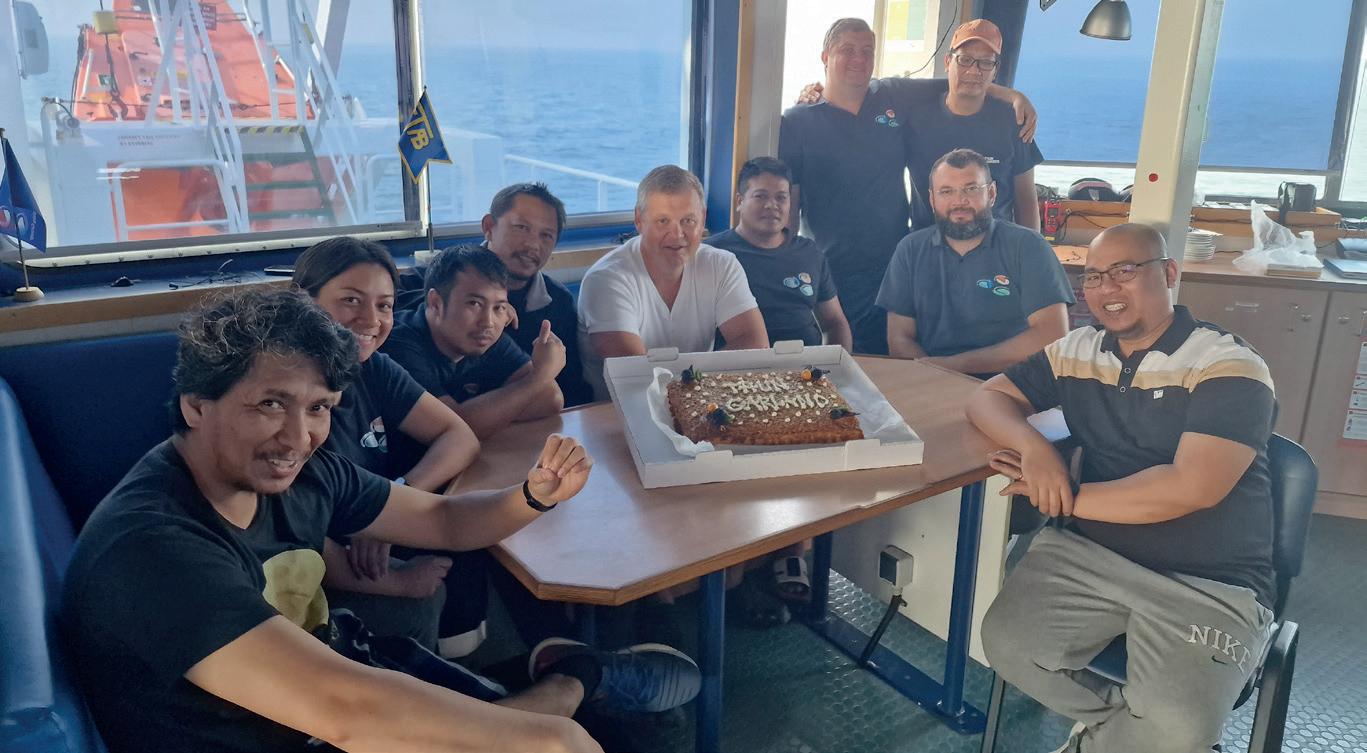
11
Maritime Just Transition Task Force
In light of the pressing global need to decrease Greenhouse Gas Emissions and adopt environmentally friendly practices, we stand at a critical juncture. Every sector, including our own, is obliged to play a role in this shift towards sustainable energy practices. This shift has repercussions not only for companies and customers but also for entire societies, and notably, the workforce.
At MF Shipping Group, we recognize the profound impact of this transition on our employees and the maritime industry as a whole. That is why we participate actively in the Maritime Just Transition Task Force. To find out more, we spoke to Sturla Henriksen.
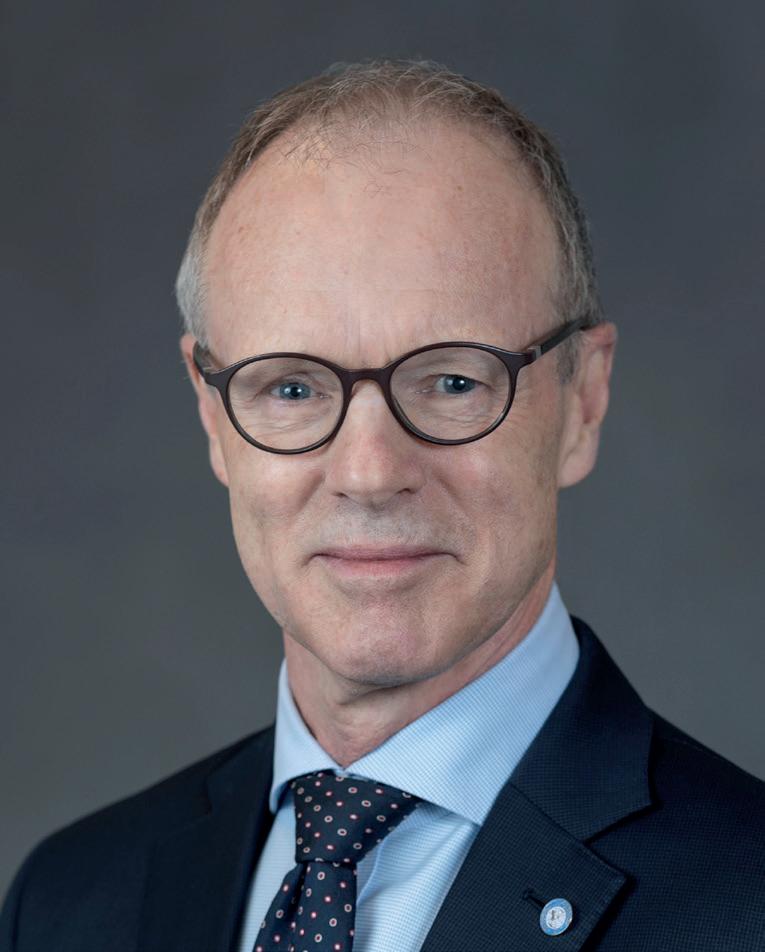
Can you tell us about yourself and what you do?
My name is Sturla Henriksen, and I am the Special Advisor on Ocean for the UN Global Compact. The UN Global Compact is the world’s largest corporate sustainability initiative, anchored at the top of the United Nations. In this capacity I work with international companies – including shipping majors – to support them implement sustainable practices.
What is the Maritime Just Transition Task Force, and what is its goal?
All industries will be part of the energy transition as the world races to cut its Greenhouse Gas Emissions. This transition will impact communities, countries, consumers – and of course workers. For example, those currently working in fossil fuel industries will have to be retrained and acquire new skills to work in different sectors, including new renewable energies.
The shipping sector is no different. Low- and zero-carbon fuels, technologies and ships are expected to introduce new skillsets and training needs for seafarers, requiring a healthand-safety-first approach. A maritime just transition for seafarers, will therefore ensure that they have the adequate skills, education, training and familiarization, to operate new technology systems on board and to manage new fuels.
The Maritime Just Transition Task Force was established during COP26 in November 2021, by the International Chamber of Shipping (ICS), the International Transport Workers’ Federation (ITF), the United Nations Global Compact, the International Labour Organization (ILO) and the International Maritime Organization (IMO). It was formed to ensure that shipping’s response to the climate emergency puts seafarers and communities at the heart of the solution. It represents an unprecedented international collaboration.
It marks the first sector coming together in a tripartite framework – convening unions, industry, and the relevant UN
12
Interview
Bodies - to collectively discuss how to secure a Just Transition for an industry. Top priorities involve supporting the 1.9 million- strong seafarer workforce to transition to a net zero shipping industry.
Where does the initiative stand now, and what has already been achieved?
The first phase of the initiative involved producing a major report which:
• Provided insights into seafarer training and skills needed to support shipping’s decarbonization;
• Provided an overview of the challenges that training seafarers throughout the transition will entail; and
• Explored how best to support seafarers during shipping’s transition.
The report, entitled “Insights into seafarer training and skills needed to support a decarbonized shipping industry”, models three emission reduction scenarios to estimate the number of seafarers requiring additional training to handle alternative fuels up to 2050. From the report it was clear that no matter which fuel or fuels are ultimately favoured, transitioning to a decarbonized shipping industry will require additional training to at least hundreds of thousands of seafarers up to 2050.
Informed by the findings of the DNV report, the Maritime Just Transition Task Force Secretariat (in consultation with other Task Force Members, IMO and ILO) developed a forward looking 10-point-action plan for international organizations, industry, workers and academia (including training providers), setting out concrete recommendations to unlock the seafarer skills needed to support shipping’s decarbonisation goals.
Collaboration is key. Can you talk about that, and what has been your experience so far? Do you notice any differences in how the issue is
approached from various countries, historical backgrounds, cultures, etc.? And are there things that bring people together?
Given the uncertainties around future fuels and training, collaboration and sharing best practice is important, as are monitoring and anticipating skills needs. In general, shipping is an industry that is collaborating well – especially since the COVID-19 pandemic when shipowners, managers, seafarer representatives and governments came together. This cooperative spirit and trust has remained and contributed to the establishment of the Task Force. The vast majority of stakeholders – regardless of country or historical background – agree that workplaces must be safe, both to protect the employee as well as the environment. Training and skills development are critical to human safety, so ensuring that seafarers and other maritime workers have the skills required to handle new potentially dangerous fuels is a noncontroversial, non-negotiable issue across borders.
What do you see as the opportunities and challenges on the path to 2050?
Green shipping presents several opportunities to attract new workers into the industry and develop new skillsets. Some emerging green industries are already leveraging the green transition in their recruitment strategies. This needs to be grasped to ensure the industry has a competent workforce in place to support its decarbonization. The 10-point action plan identifies one such opportunity: to grow our sector to have a more diverse workforce through the transition. Diversifying the maritime workforce is critical to allowing the sector to draw on a wider and deeper talent pool to achieve the green transition. Expanding our workforce in a more diverse direction represents a major opportunity for the sector to harness skills of individuals who may not have
13
In general, shipping is an industry that is collaborating well – especially since the COVID-19 pandemic when shipowners, managers, seafarer representatives and governments came together
10-point Action Plan to Achieve a Just Transition for Seafarers
Global labour standards
Ensure that Just Transition planning, as part of wider decarbonization plans in the maritime industry, is aligned with globally established labor standards under the Maritime Labour Convention, as amended (MLC, 2006), underpinned by social dialogue and stakeholder engagement
Gender and diversity
Champion ‘Diversity, Equity and Inclusion’ on board ships as a driver for better performance and risk management in the transition and beyond
Healt h and safety
Ensure a health and safety-first approach to de-risk shipping’s green transition with fit-for-purpose training and familiarization onboard ships
Establish consensus to unlock training
To unlock the investments needed to equip the maritime workforce with essential skills necessary for a decarbonized shipping industry, urgently establish global consensus on an ambitious decarbonization goal for shipping, that is more explicitly aligned with the 1.5ºC temperature goal of the Paris Agreement. This will provide the certainty needed to stimulate the uptake of alternative fuels and clean energy technologies for shipping
Skillsandtraining Recruitment and attrition
Support seafarer career pat hways
Support seafaring careers both at sea and ashore, by establishing mobility frameworks for seafarers to develop transferable skills over their time on board, preparing them for a career ashore, beyond seafaring
Address attrition and recruitment
Take active steps to address seafarer attrition, which represents a significant challenge to attract and retain seafarers (including women) for shipping’s green transition
Investing in skills
Ensure decarbonization plans, including spending and investment, are aligned with the globally established ILO just transition guidelines, taking full account of the maritime industry’s growing need for skills to support its green transition
Strengt hening global training standards
Strengthen global training standards for seafarers, in the ongoing comprehensive review of the IMO STCW Convention and Code, identifying areas for revision. This includes replacing or updating obsolete competencies and knowledge, understanding and proficiency (KUP) in line with shipping’s digitalization evolution and decarbonization trajectory
Delivering fair training
Deliver equitable training models for all seafarers to keep up with technological advances needed to support the industry’s decarbonization and avoid a widening skills and training gap, which disadvantages seafarers, in particular from developing countries, Small Island Developing States (SIDS) and Least Developed Countries (LDCs)
Monitoring skills
Develop national maritime skills councils, as advisory bodies, to complement the STCW training framework, including giving special attention to the additional skills that the maritime workforce will need to handle alternative fuels
5
latnemadnuF jtsu t r a ns itionprinciples
14
been considered previously, and those that may themselves not have considered a career in maritime. This can look like recruiting from a broader range of countries, geographical locations, ethnic backgrounds, genders and ranges of physical ability for the varied roles that do (and will) exist.
However, there are several challenges shipping and training seafarers will likely face in the run-up to 2050. These include:
• Slow pace of regulatory development and lack of clarity surrounding the viability and uptake of alternative fuel options and decarbonization trajectories, which makes investment in seafarer training challenging;
• A need to increase investment in training centres and upto-date equipment;
• A lack of competent trainers; and
• A shortage of experienced seafarers.
Besides cleaner fuels, what will be the biggest changes compared to the present? Are there any potential side effects on infrastructure, digitization, etc.?
Other mega trends such as automation and digitalization also impacts seafarers and port workers. When it comes to automating the industry, the highest potential for automation and job replacement is in low-skilled jobs, which are intensive on predictable physical activities and data processing. However, the further introduction of automation will also create a demand for new types of jobs e.g. remote operators. The jobs thus won’t disappear, rather the requirements will be different and the skills profiles will change.
In addition, adapting to climate change will also change shipping – in particular port infrastructure. Vulnerable ports will need to enhance their flood defences and take other measures to protect its infrastructure against more extreme weather e.g. cyclones.
How is MF Shipping Group connected to this initiative?
The Task Force is supported by a ‘Global Industry Peer Learning Group’, comprising representatives from international organisations, private companies, workers and academia (including training providers). This international collaborative group serves as a platform for these global partners to engage in strategic and social dialogue around maritime just transition.
MF Shipping Group it a vital member of the peer learning group, sharing insights and best practices with other companies and relevant stakeholders. This kind of exchange and collaboration is important for a successful green transition.
The initiative also clearly focuses on the human element. What does this transition mean for seafarers? What should they do in the coming years to be prepared, and what competencies and skills will be needed?
The introduction of alternative fuel technologies is expected to have a significant impact on maritime operations on board ships and will require seafarers to develop and acquire new skills and competencies to ensure safe and efficient operations in the decades up to 2050 and beyond. Increased IT, digital, technical, Science, Technology, Engineering, Math (STEM), and organizational competences will be needed in future education to meet decarbonization demands, and this will need to be reflected in seafarer education. For instance, understanding fuel specific chemistry and physics; handling more digitalized and manual systems on bridge, deck and engine.
Soft skills are also increasingly important. Personal, organizational and management skills will be a prerequisite to exploit the possibilities of future decarbonization-related technology. These include personal skills such as creativity and innovation, as well as other organization skills, including change management, people management and coordinating teams working remotely/dispersed teams.
These are further presented in table 8.1 of DNVs report:
15
Focus on: Drugs & Alcohol testing
As informed earlier this year, we have decided to intensify the number of external D&A tests on board. All vessels will now be visited by a Collecting Officer minimum 3 times a year.
The use of alcohol and/or other drugs in general is increasing globally, and the impact of substance abuse can be seen in the workplace. At the same time the existence of a comprehensive alcohol and drug abuse program does not necessarily mean that problems exist. Rather, that activities and programmes are being implemented to promote health and safety and to prevent harm and the occurrence of hazardous situations. Successful prevention efforts are “pro-active” rather than “reactive”.
Maritime accidents occur due to many different factors, but those caused by drug and alcohol use are some of the most
devastating. According to the United States Coast Guard report, alcohol use is the primary reason for fatal maritime accidents. When maritime workers are under the influence of alcohol or drugs, they can cause accidents that lead to horrific consequences.
Maritime workers must remain attentive and alert at all times, and that’s unlikely to happen for those under the influence of substances. While these employees certainly bear some responsibility for their actions on the job, their employers may also be held liable for the damage they cause.
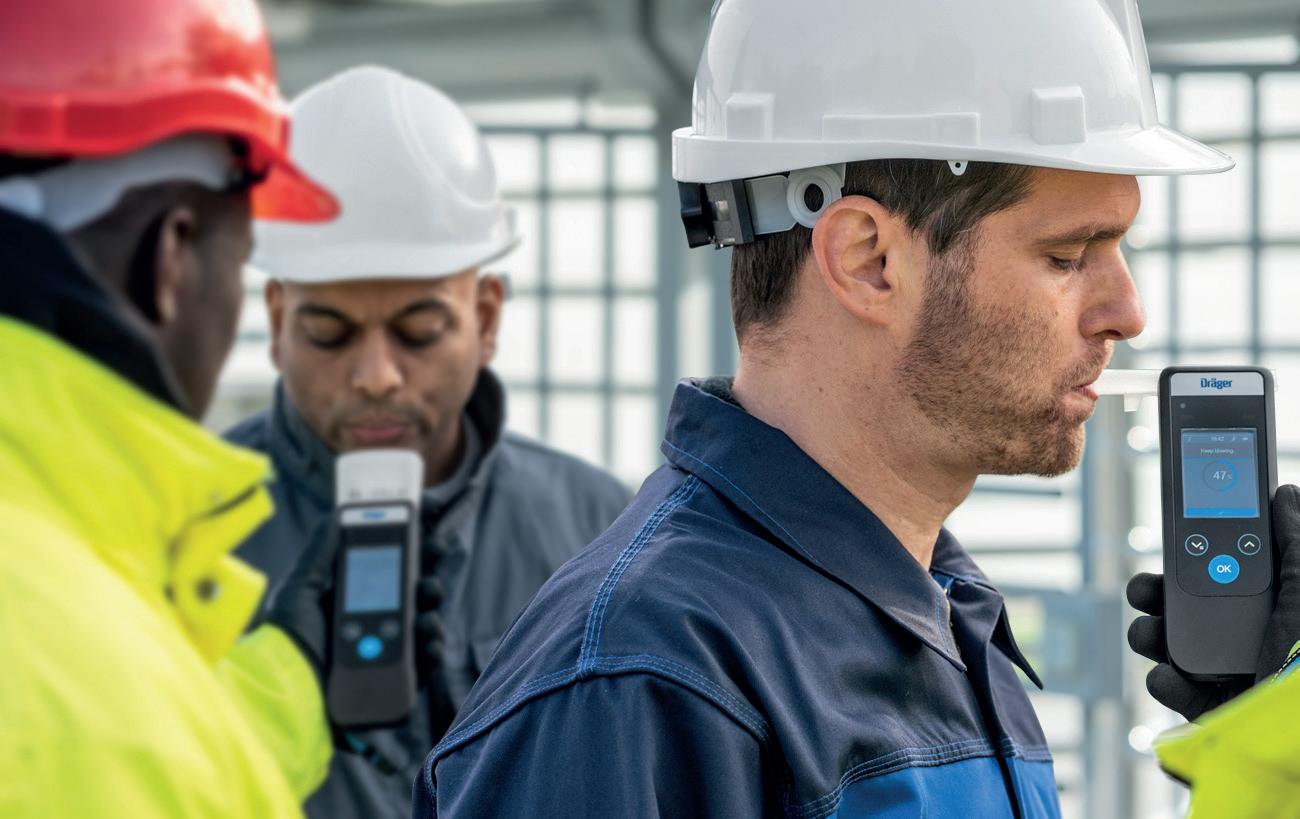
16
A responsible maritime employer will:
• Have strict policies prohibiting the use of alcohol and drugs.
• Enforce their ban on substance use through routine drug and alcohol testing.
• Remove employees from positions when their substance use jeopardizes the safety of others.
When maritime employees work under the influence of alcohol or drugs, they may cause serious accidents such as:
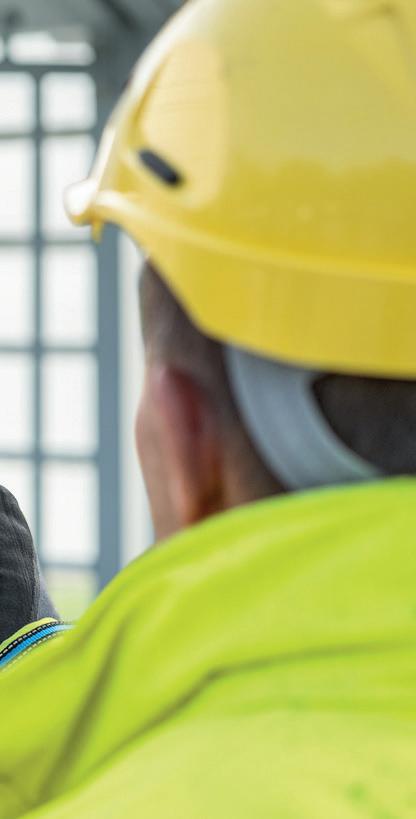
• Crane incidents
Cranes are inherently dangerous since they often handle loads weighing hundreds or even thousands of pounds. Operating a crane while under the influence of drugs or alcohol may cause a worker to drop the load on other employees or strike them when the load swings out of control. Injuries caused by these accidents may include neck and back problems, broken bones, lacerations, and crushed or severed limbs.
• Collisions
A maritime worker operating a vessel under the influence of alcohol or illicit substances may cause a devastating collision with another ship, a bridge, or a pier. Accidents like these often result in co-workers suffering broken and fractured bones, hypothermia and shock, and even drowning.
We have a global testing partner that turn up unannounced, they have received specific training to serve the maritime industry and are following the very specific procedure that you will all be familiar with. Once the collector disembarks the vessel, the samples will be shipped to a laboratory for analysis. This may take up to 5 working days upon receipt in the laboratory.
Luckily positive results are rare, but they do happen. In such case there will be additional testing to double check the outcome and to see if the results may relate to a type of medicine that has been reported by the donor. In connection we can’t stress enough to always inform the Master and Collector about any type of medicine, tincture, homeopathic remedy, or protein powder you might be using. This might explain a lot in regard to the outcome of an analysis and, with the right information, turn an initial positive result into a negative one.
17
Activities and programmes are being implemented to promote health and safety
How are you doing? Adrian Neil C. Urbano
In this topic, one of our crew members gets interviewed to tell a bit more about themselves. This edition we continue our story with Adrian Urbano, 29 years old and sailing as a 3rd officer on several tankers in our fleet. His motto: “Time is the most valuable thing a man can spend”. To me, time is the most precious gem of all. It’s unpredictable and that is what makes it challenging.
DO YOU HAVE A NICKNAME, AND CAN YOU EXPLAIN WHY THEY GIVE THIS NAME?
My friends, relatives and parents call me “Ian”. I don’t really think there is a reason behind this nickname rather than being shorter of my first name Adrian Neil.
WHEN DID YOU START SAILING, HOW DID YOUR CAREER PATH CONTINUE AND WHAT ARE YOUR PLANS FOR THE FUTURE?
I started as a cadet in the dry cargo fleet, onboard mv Yvonne K, in mid-2023. After being a cadet I joined the tanker fleet where I started as an ordinary seaman. I am still on the tanker fleet today, sailing as 3rd officer. I am happy and satisfied with my current position on board and becoming an officer is one of my achievements. Of course, I am not stopping there. I am currently studying for my Masters in Maritime Management and will hopefully graduate in a few months. After that, I want to continue to follow my dream and gain more and more experience in life. If you ask me what my plans are for the future, I have a simple answer: I want to lead my own team on board!
WHAT IS YOUR GREATEST FAILURE, AND WHAT DID YOU LEARN FROM IT?
There are instances when I am ignorant and disregard simple instructions, thus creating troublesome situations. This troublesome situation is my fault. As I grow older and have more realisations, I become more attentive to instructions and procedures, even to the smallest detail, because from there I learn from my past mistakes, but I’m still happy and willing to have more. According to Albert Einstein; “He who has never made a mistake has never tried anything new.”
WHAT’S THE BEST SERIE YOU’VE SEEN IN THE LAST YEAR?
I am a fan of The Big Bang Theory, The Good Doctor, Suits and Young Sheldon. I am quite fascinated by shows that feature extraordinary characters.
WHO IS YOUR INSPIRATION?
It is always my family; they are my greatest inspiration.
WHAT WOULD YOUR PARTNER, KIDS, OR FRIENDS SAY ABOUT YOU IF WE ASKED THEM?
They always say that I am on time and that I hate being late. Well, I want to be on time. It’s the most precious thing of all.
WHAT ALWAYS MAKES YOU SMILE EVEN ON THE BLUE DAYS?
I would say good food and good music. Depending on the setting/situation, I also prefer just deep silence.
WHAT IS YOUR GREATEST ACHIEVEMENT OUTSIDE OF WORK?
I can’t really call this an achievement, but I am happy to own a small farm with a native bamboo hut.
HOW ARE YOU MANAGING WORK-LIFE BALANCE THESE DAYS?
These days, balancing work and life is achievable. Good planning and time management skills can be one solution. Avoiding unconstructive discussions is another.
WHAT ARE YOUR FAVOURITE DESTINATIONS TO SAIL TO, AND WHY?
Of all the countries I have visited, I would say Norway is my favourite. Tourists pay a lot of money to come and see Norway’s spectacular northern lights and beautiful landscapes. It doesn’t matter if it’s summer or winter.
WHAT DO YOU FIND MOST FASCINATING ABOUT YOUR ROLE AT SEA?
As a mate, I ensure that life-saving and fire-fighting equipment is in good working order. Apart from that, I also help to take care of the cargo, the crew and the assets of the vessel. The fascinating thing about this job is that I get to visit and experience tourist sites for free.
18
WHAT IS YOUR FAVOURITE DRINK FOOD OR SNACK ONBOARD?
I am not very selective when it comes to food. But there is one that I really appreciate and that is Pork Adobo (a Filipino dish). What is important to me is that the food is prepared properly and it is clean. However, I am allergic to some of the good stuff like shrimp, lobster and crab. Pity, although less bad cholesterol for me, right?
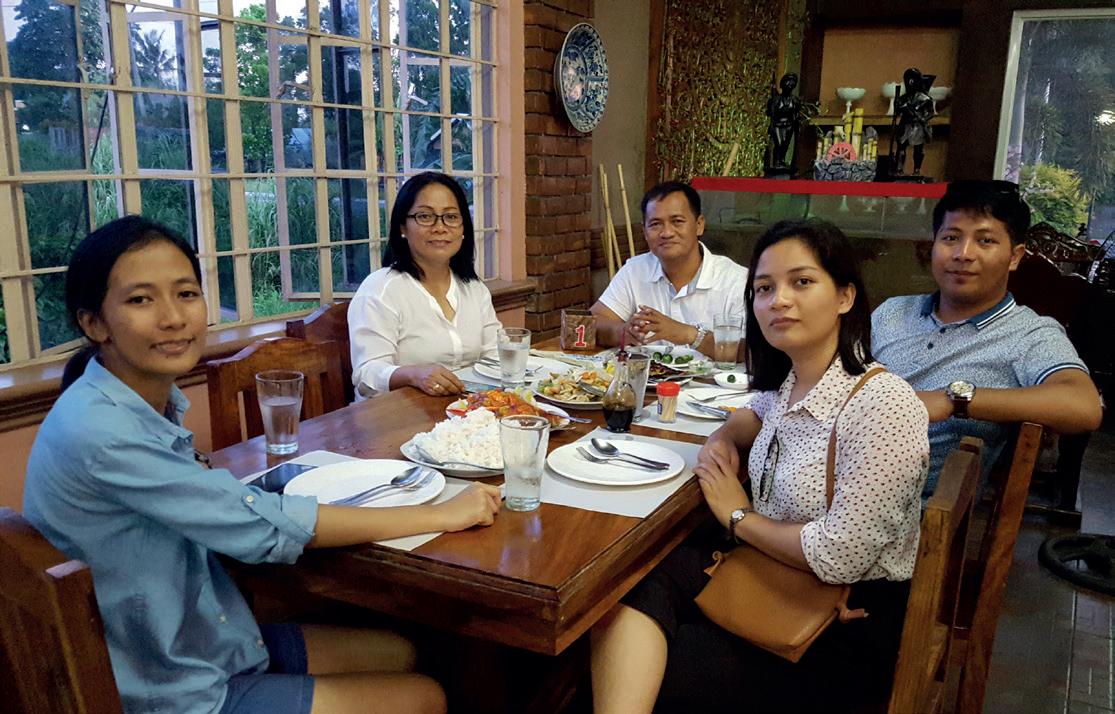
WHICH CREWMEMBER HAS MADE AN IMPACT ON YOUR CAREER OR THE WAY YOU LOOK AT YOUR JOB?
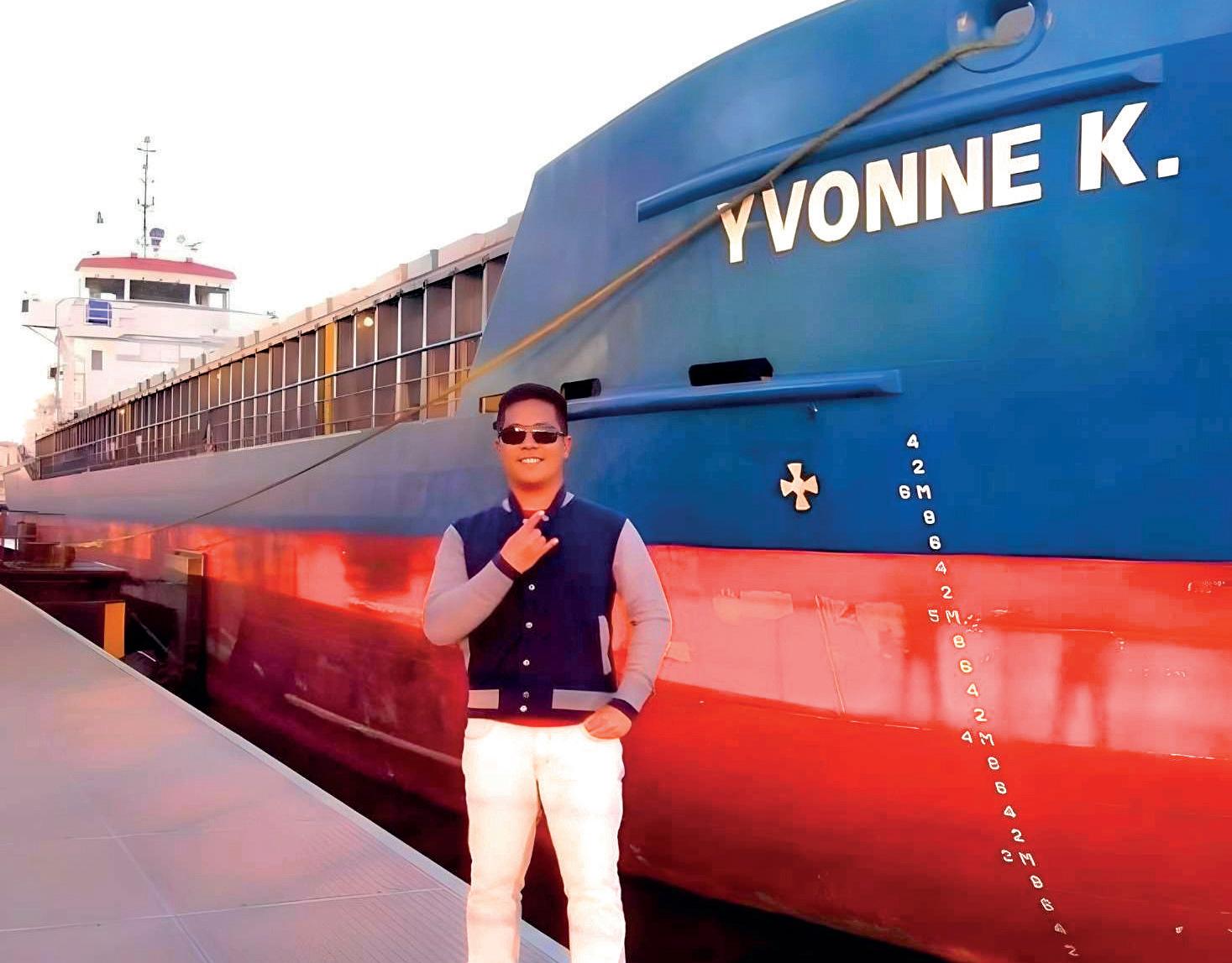
I can think of many crew members who have influenced my career. Most of them have provided constructive leadership to their subordinates. I cannot name them all, but I am grateful and honoured to have sailed with them. Each of them has their own way of motivating crewmembers and it’s important for me to be positive, however difficult it is to get along sometimes.
SHARE YOUR BEST SEAMAN STORY
I would say it was a remarkable experience. This is when we had to render assistance to a fishing vessel who had her own nets stuck to its propeller. Our vessel was on its way to Kristiansund, Norway, to unload the rest of its cargo. As agreed with the VTS, the vessel will use its own rescue boat to keep the fishing vessel away from shore, or at least hold it in position until further assistance arrives. After receiving confirmation from the VTS, our vessel set course and arrived at the position of the fishing vessel 15 minutes later. It was an unforgettable experience for me because it was the first time I had been involved in a real rescue/assistance operation. The pressure and stress was really high, especially as I was in charge of the lifeboat. By the time I was in the water and heading towards the fishing vessel, the feeling was less intense, it seemed like we were just doing a rescue drill. When we arrived at the position of the fishing vessel, we carried out a kind of towing operation. We tried to tow them into deeper water, but unfortunately the towing power and strength of the lifeboat was not enough. Me and my team suspected that somehow their nets were also stuck in the rocky seabed. So what we did was keep them in position until the rescue boat from Kristiansund arrived. After about 15 minutes, a more powerful rescue boat from the RCC arrived and took over. We went straight back to the vessel and brought the MOB boat back on board. This is one of the best experiences of my life. I don’t know if I’d call it ‘lucky for me’, because this is what we’ve been trained to do and we’re finally doing it.

19
The EU Emissions Trading
System (EU ETS)
Impact on Shipping and our Company
The EU Emissions Trading System (EU ETS) is a cornerstone of the European Union’s efforts to combat climate change and reduce greenhouse gas emissions. Introduced in 2005, it is the world’s first and largest carbon market. The EU ETS is a very volatile and competitive market, since it covers various industries, such as stationary installations (electrical and heat generation industry), aviation and shipping. This article is explaining the EU ETS and the effects on the shipping industry and the implications for MF Shipping Group.
How does the EU ETS work?
The EU ETS is a cap-and-trade system that sets a cap on the total amount of greenhouse gas emissions that can be emitted by covered industries. Within this cap, shipping companies must buy allowances, each representing one ton of CO2 equivalent. These allowances can be bought, sold, or traded among shipowners. The overarching goal is to incentivize shipping companies to reduce their greenhouse gas emissions efficiently.
What is the effect on the Shipping Industry?
a. Inclusion of Shipping in EU ETS: In 2020, the European Parliament voted to include maritime transport in the EU ETS, making it the first international sector to be brought under the system. The EU ETS is applicable for vessels above 5000 GT. The geographical scope under the EU ETS is: 100% of emissions on voyages between EU/EEA ports and 50% of emissions on voyages between an EU/EEA (including Norway and Iceland) port and a non-EEA port. This scope is illustrated in the figure below.
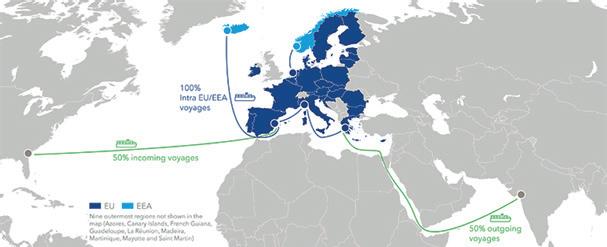
The EU ETS will take place in a phase-in period:
• 2025: 40 % of emissions reported in 2024
• 2026: 70 % of emissions reported in 2025
• 2027 onwards: 100 % of emissions reported in previous year.
Scope of EU Emissions Trading System (DNV Maritime)
b. Compliance and Emission Reduction: Shipping companies operating in EU/ EEA ports must hold enough allowances to cover their emissions or face penalties for non-compliance. This has incentivized MF Shipping Group to adopt more sustainable practices and invest in technologies to reduce fuel consumption and emissions. An example of that is the Eefting Energy measurement system.
20
Effect on Our Company
a. Compliance Costs: As the majority of the clients of MF Shipping Group is operating in EU waters, the shipowners will be required to hold a sufficient number of allowances to cover the emissions. This may lead to increased compliance costs if emissions reduction measures are not adequately implemented.
b. Technological Investments: To remain competitive and compliant within the EU ETS, MF Shipping Group is embracing and recommending to owners to invest in modern vessels, fuel-efficient technologies, adopt cleaner fuels, onshore power supply, among other measures. Although these investments may incur initial costs, they can lead to long-term benefits through lower fuel consumption.
c. Awareness: Onboard as well as ashore, the environmental awareness must be part of the day-to-day routine. At MF Shipping Group, the focus is on improving energy efficiency and reduce fuel consumption while prioritizing safety and environmentally friendly practices. For example, when new technologies are introduced, the crew onboard and the ashore team will be informed and trained, with the target of reducing the vessel’s emissions and associated costs under the EU ETS.
d. Measuring, Recording and Verification (MRV): The MRV is an important part of the awareness, and it is very meaningful work and serves to create good analyses on how the vessels are operating. For example, the logbooks and voyage data registration are essential for analysis, and with this data is possible to investigate possible alternatives and technical
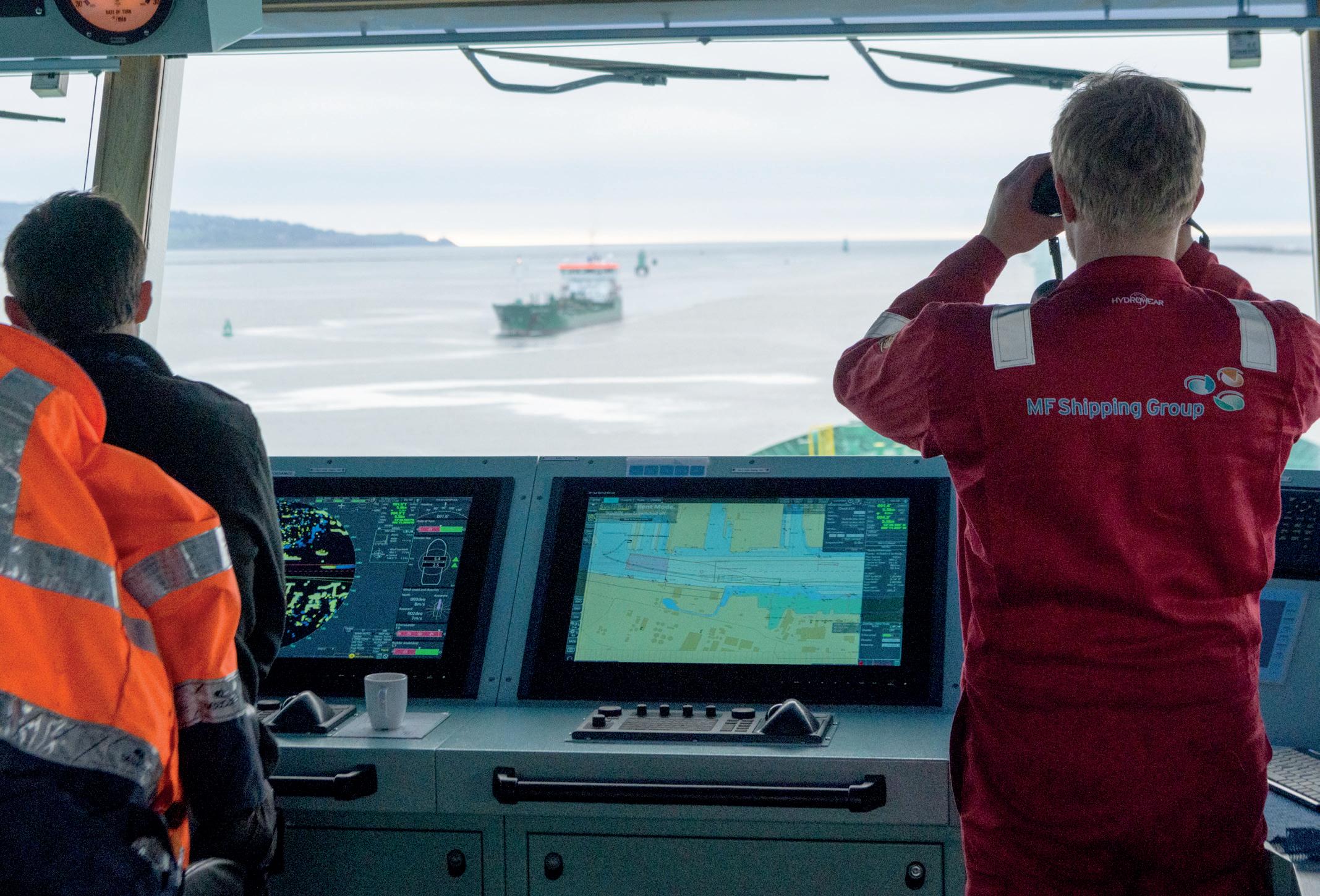
21
By proactively addressing emissions reduction, MF Shipping Group can embrace opportunities for growth and contribute to a greener, more sustainable future
EU-ETS Extension to Maritime Transport
improvements. It is important to mention that the EU ETS will be reported and verified through the MRV system. e. Competitive Advantage: Embracing sustainability and achieving emissions reduction targets can provide MF Shipping Group with a competitive edge in the market. Customers and stakeholders increase value environmentally responsible practices, which can attract more business opportunities and partnerships.
The EU Emissions Trading System represents a significant step towards combatting climate change and reducing greenhouse gas emissions in the European shipping industry. As our company operates in EU waters, we must be prepared to
comply with the EU ETS regulations, which entail investing in emission reduction measures. While these measures may initially lead to increased costs, the long-term benefits of sustainability and market competitiveness can outweigh the challenges. By proactively addressing emissions reduction, MF Shipping Group can embrace opportunities for growth and contribute to a greener, more sustainable future.
Erik Zwijghuizen Chief Technical Officer
Source:
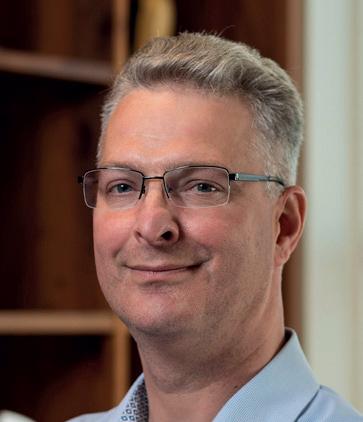
22
2023 2024 2025 2026 2027 2028+
Introduction Timeline
Under MRV scope Under MRV and EU ETS scope Ship sizes and types MRV Review ETS Review Cargo / passenger ships* (5000 + GT) Offshore ships (5000 + GT) Offshore and general cargo ships (400 - 5000 GT) First surrendering year on 2023 emissons-First surrendering year on 2027 emissons Inclusion in the EU ETS to be considered as part of the ETS review Greenhouse Gases Carbon Dioxide (CO2) Methane (CH4) and Nitrous Oxide (N20)Phase-In % of emissions to be surrendered as per the EU ETS Directive - 100% 100% 100% 70% 40%
* Ships already covered today by the EU MRV regulation
The Passion of....
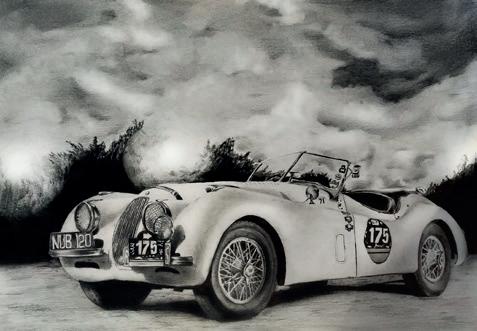
Sergei Ivanchikov
Many people have hobbies they enjoy in their spare time, but a hobby is not to be confused with a passion. A passion is something you can’t live without, something that becomes a significant part of your life and fills you with immense joy and energy. While those at MF Shipping Group display their passion for the maritime industry daily, let’s explore the passions of our colleagues in other realms. In this issue, we shine a spotlight on Sergei Ivanchikov, the Chief Officer on board the Thun Britain. He’s not just a dedicated maritime professional but also an outstanding artist with a talent for creating incredible drawings.
Sergei, who is 38 years old and has been a part of MF Shipping Group for a decade, initially joined as a third mate on the Thun Glory in 2013. Unlike his maritime career, which required formal education and training, Sergei’s talent for drawing was entirely self-taught. “My true passion is drawing. I primarily work with pencils, including charcoal and colored ones, although occasionally I use pens or paint. You may have come across some of my drawings featured as Christmas cards from various vessels,” Sergei shared.
Drawing wasn’t always a consistent pursuit for Sergei. However, after nearly a decade-long hiatus, he rekindled his artistic side and found his talent as strong as ever. “I dabbled in drawing during my school days, often leaning towards graffiti. But after ten years, while sailing and having moments of downtime in my cabin, I began sketching portraits. The initial results weren’t necessarily ‘wow,’ but I found increasing enjoyment in the process, and my skills improved over time.”
Much like any family, Sergei’s biggest fan is his mother, who proudly displays several of his beautiful drawings on her home’s walls. Sergei also takes great pleasure in creating portraits for others upon request. “Crafting a lovely portrait for someone gives me tremendous satisfaction,” he added.
Sergei dedicates approximately 1 to 2 hours each day to his beloved hobby, which might sound like a substantial commitment. However, for someone who considers it their true passion, time seems to fly by. “On average, it takes me about 8 hours to complete an A4 portrait, though the duration can vary depending on the level of detail involved in the drawing,” Sergei explained.

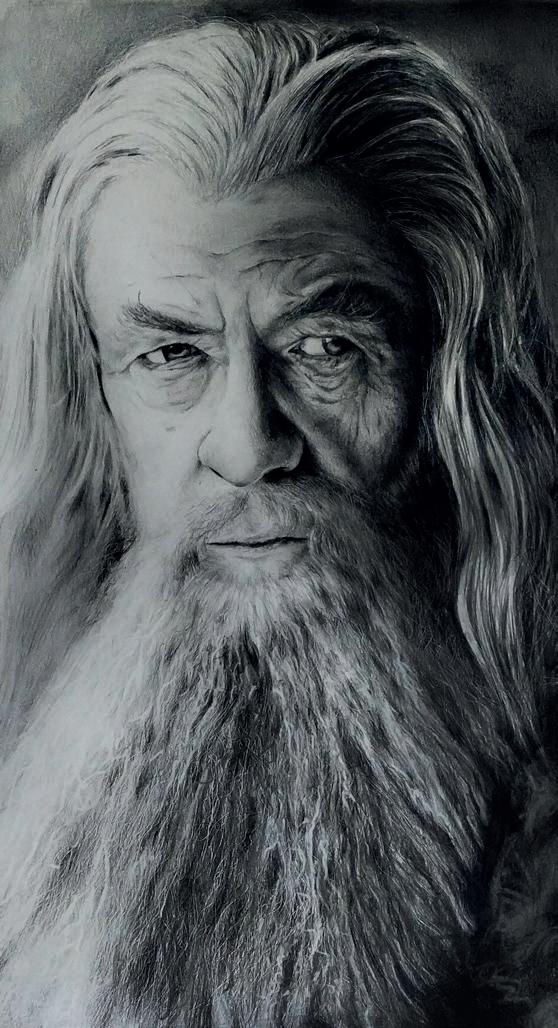
His job as a seafarer affords him the opportunity to travel and interact with new people, which, in turn, fuels his inspiration for creating more beautiful art. “Meeting new people and exploring new places through my work is a constant source of inspiration for my drawings,” Sergei concluded.
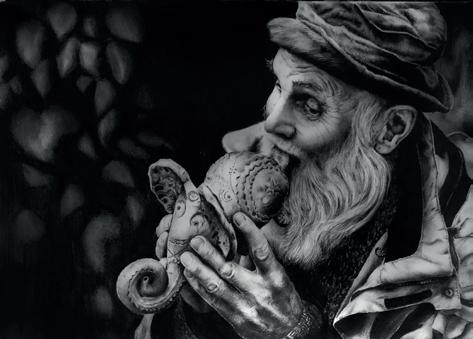
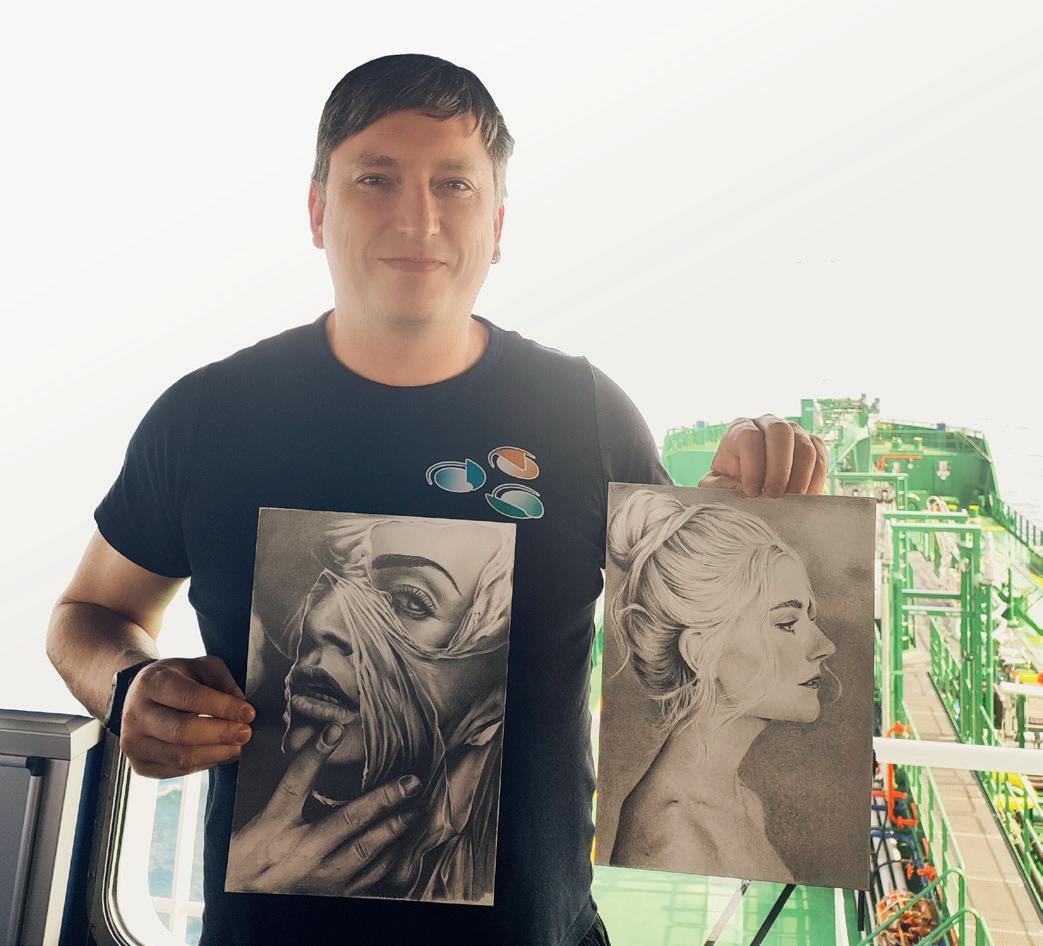
23
mv Shetland & mv Greenland
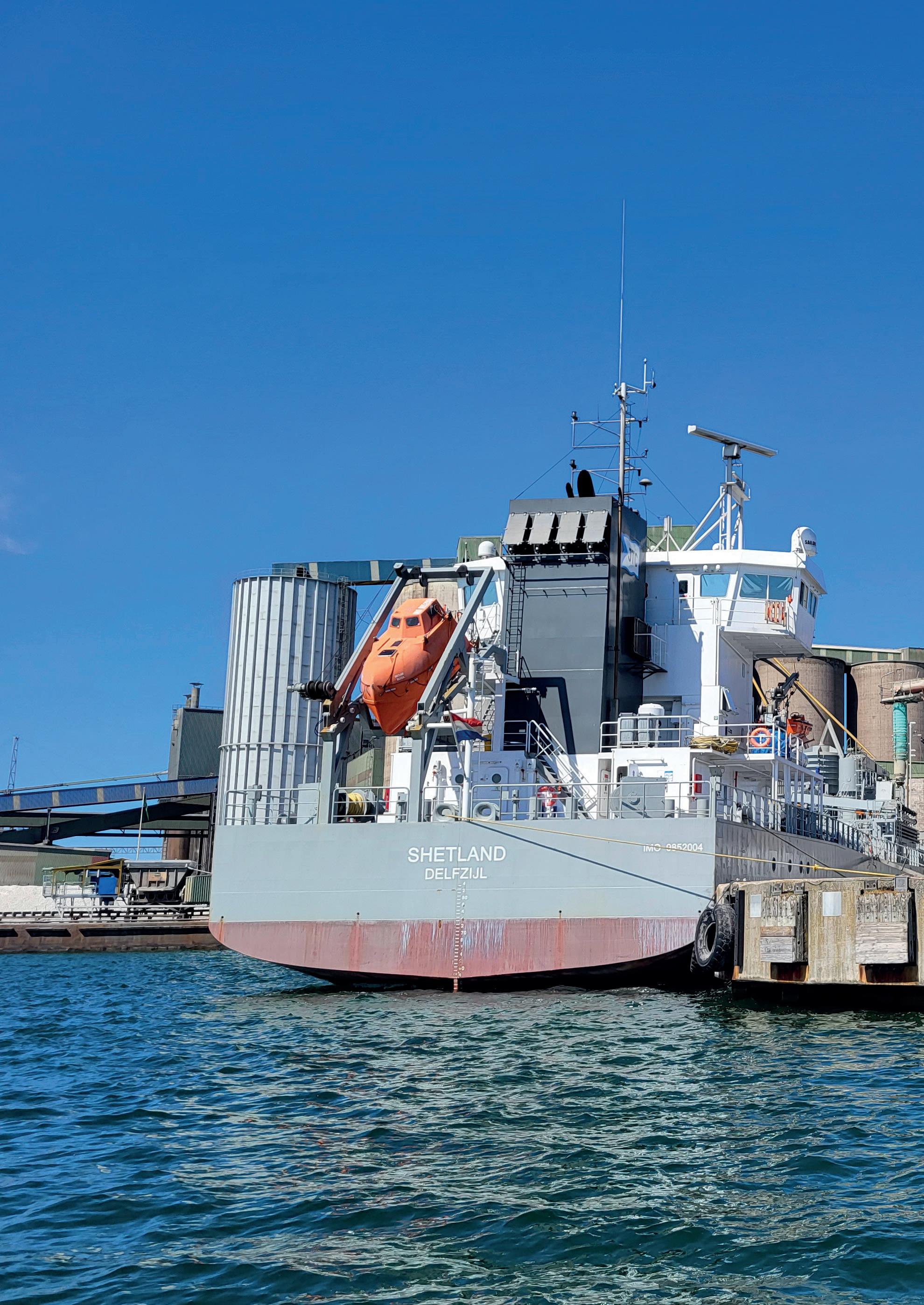 Photo captured by Captain Robert Irek in port of Slite
Photo captured by Captain Robert Irek in port of Slite
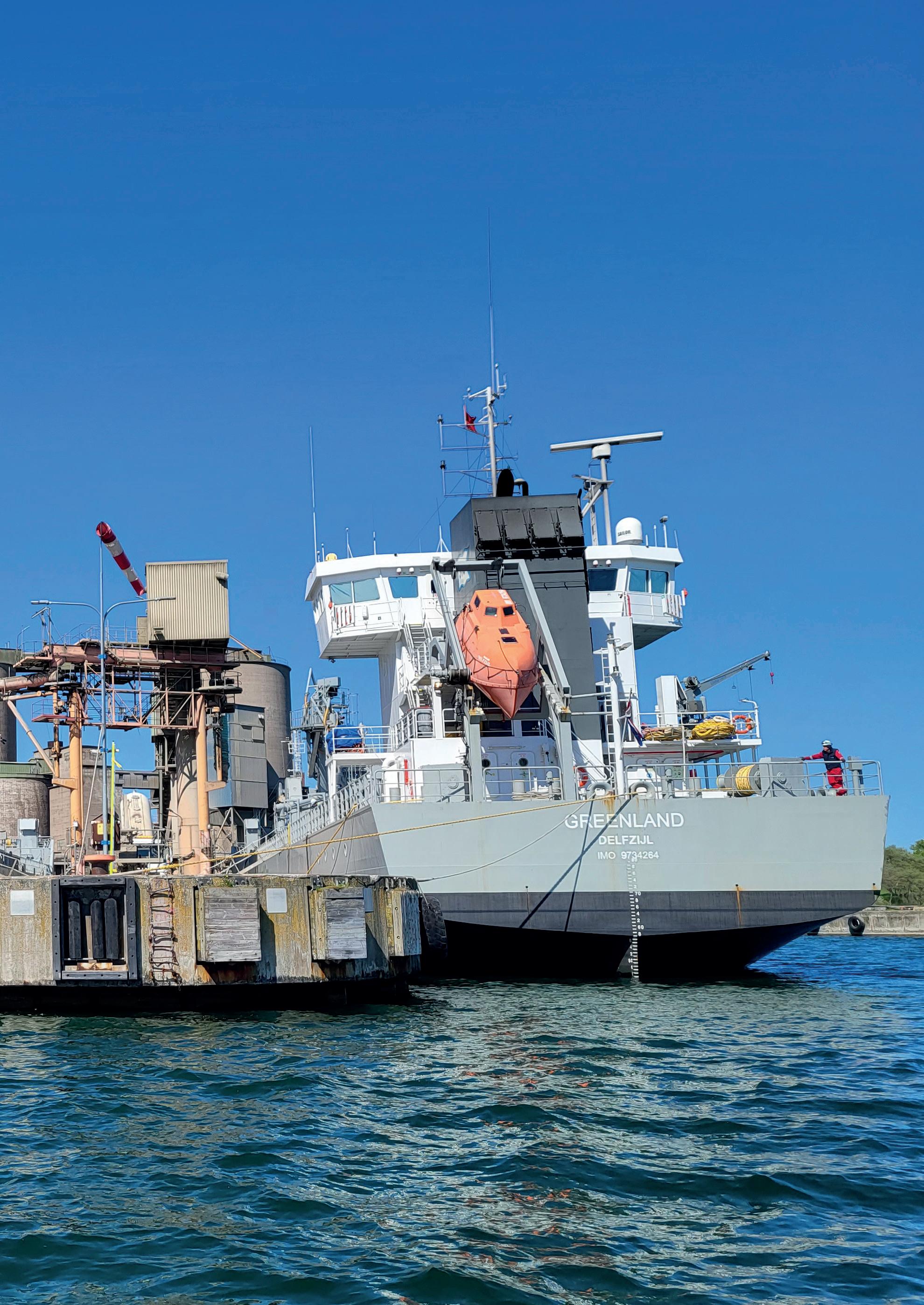
Dry docking of the Thun L-Vessels
To ensure that a vessel remains seaworthy, safe and efficient throughout its operational life, docking is a crucial part of the vessel’s lifecycle.
The specific reasons for docking can vary widely depending on the type of vessel, how it’s used and regulatory requirements:
• Inspection and Maintenance
• Hull Cleaning and Painting
• Repairs and Upgrades
• Overhaul and Refurbishment
• Safety and Regulatory Compliance
• Damage Assessment
From June 2022 to July 2023 the entire L-series was in dock. The Thun Lidkoping & Thun Liverpool were docked at Damen Shiprepair in the Netherlands. For the other three vessels, Thun London, Thun Liffey and Thun Lundy, the dock in Emden, Germany was chosen. This was a major operation that required a lot of planning on the part of everyone involved, including Thun Tankers, the superintendents and the vessel crews.
During dry docking, the rudders and shafts were dismantled on all vessels, with welding work performed to repair the stern tubes. Galvanic separation of the stern tubes was executed, and the stern tube bearings and seals were renewed.
All the vessels were in the dock for an average of about 25 days during the beautiful summer weather! So we can imagine that it was not a punishment at all. Looking back on this exciting journey, there were some exceptional pictures taken that we can’t wait for you to see!
We want to express our heartfelt thanks to everyone involved in the dry docking of the Thun L-Series vessels. This significant achievement wouldn’t have been possible without the dedication and hard work of our Thun Tankers team, our diligent superintendents, and the committed vessel crews. We also extend our appreciation to our valued partners and service providers who contributed to the success of this operation. Your collective efforts have been truly exceptional, and we look forward to our continued journey of success together.
Do you have beautiful photos, don’t hesitate and send them to communication@mfgroup.nl!
26
We want to express our heartfelt thanks to everyone involved

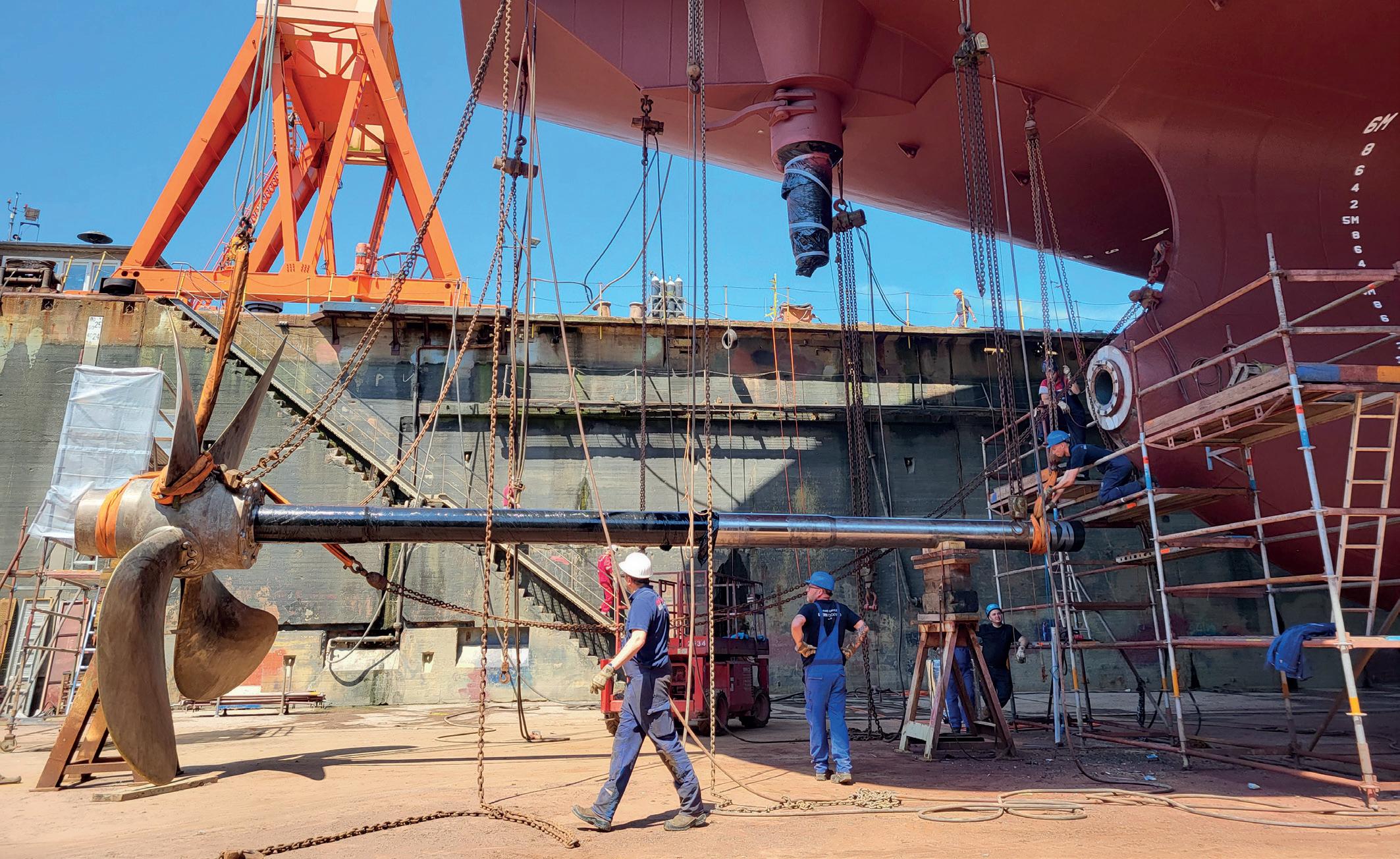
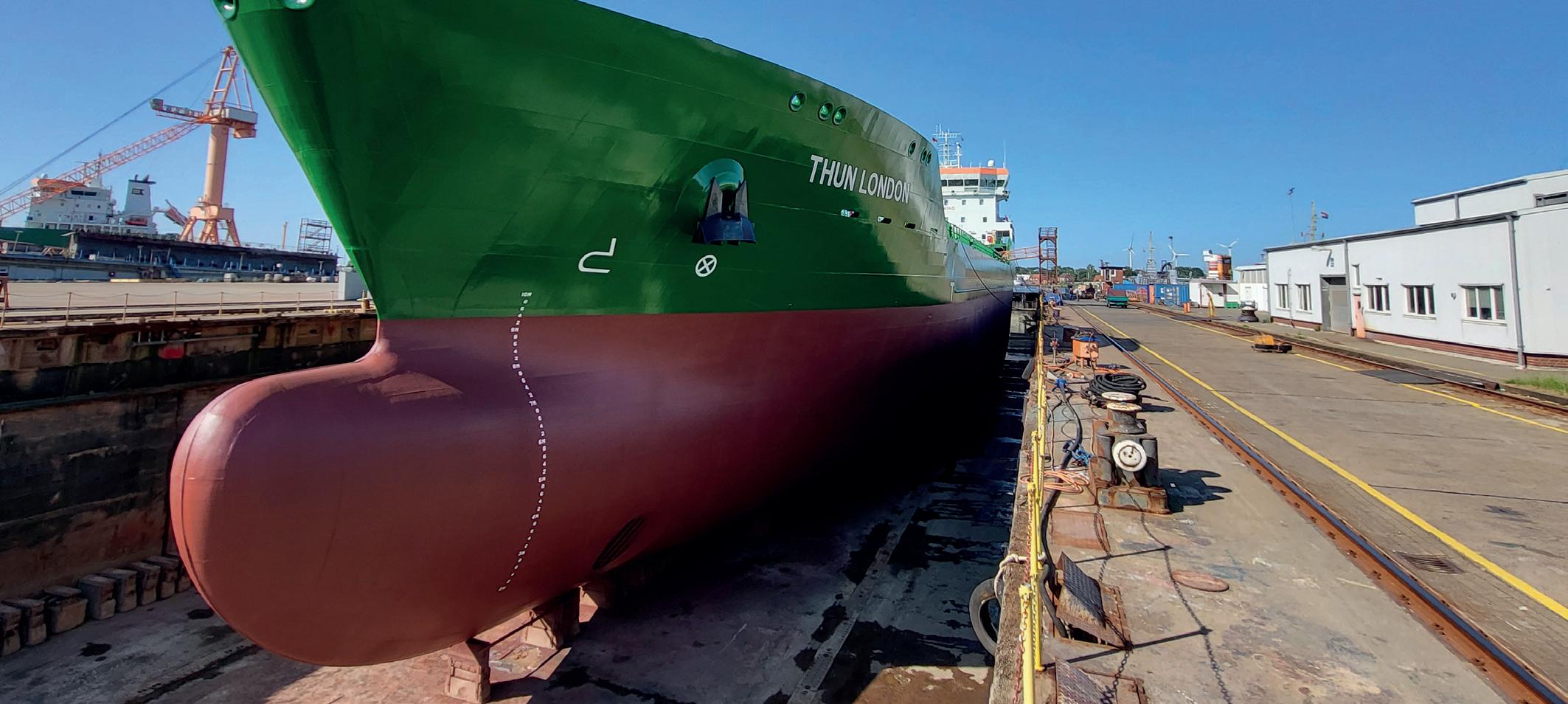
27
^ Two sister vessels side by side at the yard in Emden. One leaving (Thun London) and the other arriving (Thun Lundy)
^ Repair of the sterntube
^ Bright and shiny like new!
Corporate Personnel Overview
Jubilees, promotions, new borns and farewells
Promotions seagoing staff
Jubilees office staff
New Born
Anna
Congratulations proud parents Sergey (3/O) & Anastasia Elagin on the arrival of your daughter Anna! We wish you and your beautiful baby girl a lifetime of health and happiness!
Anna was born on 17 June 2023, she weighed 3920 grams and measured 56 cm.
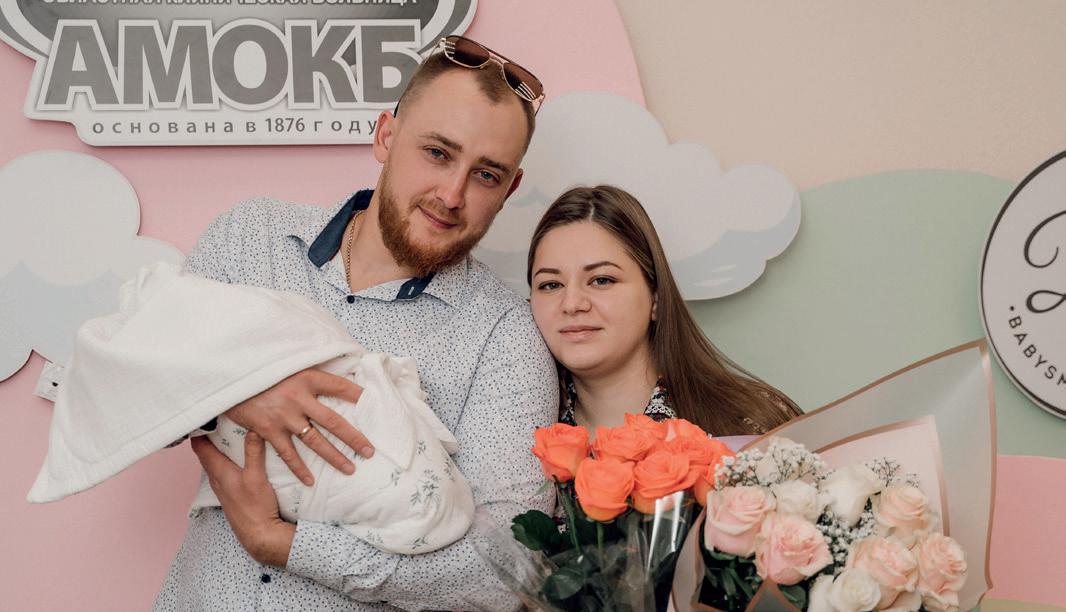
28
Name Former rank New rank Date
M.P.J. Hodge Apprentice Integrated 3rd Officer 05 - 07 - 2023 A. Siusiukalov 3rd Officer 2nd Officer 08 - 07 - 2023 F. Dam Apprentice Integrated 3rd Officer 11 - 07 - 2023 A. Boronenko Chief Officer Master 19 - 07 - 2023 J. Blom 2nd Engineer Chief Engineer 21 - 07 - 2023 K. Rozhkov Able Bodied Seaman 3rd Officer 22 - 07 - 2023 J.T.R Rodilla Able Bodied Seaman Bosun 22 - 07 - 2023 A. Maltsev 3rd Officer 2nd Officer 22 - 07 - 2023 C.W.H. Geeve Apprentice Integrated 3rd Engineer 30 - 07 - 2023 J.C. Colo Ordinary Seaman Able Bodied Seaman 18 - 08 - 2023 J.M.D. Duran Apprentice Engineer Wiper 19 - 08 - 2023 R. Susloparov Wiper 3rd Engineer 19 - 08 - 2023 A. Y. Pura 3rd Engineer 2nd Engineer 23 - 08 - 2023 F.M. Fernandez Munoz Apprentice integrated 3rd Officer 10 - 09 - 2023
Name Rank Date Years
Henriëtte Kleefman Crew Specialist 15 - 07 - 2023 15 years Tineke van Dam Quality Department Assistant 18 - 08 - 2023 15 years Arnold Smid Accounting Specialist 01 - 09 - 2023 15 years Theo Dik Chief Finance Officer 01 - 09 - 2023 25 years Ivo Ramakers Chief Projects & Information Officer 01 - 09 - 2023 25 years
Mr Shapochkin switched ranks from 2/O (dry cargo) to 3/O (tankers) he appeared in Fleetlog 2-2023 on the list with his “new” rank. This is no promotion although it is mentioned as such now. Our apologies for the fact this was overlooked.
Jubilees seagoing staff
29 Name Rank Date Years
O. Ryaboshapka 2nd Engineer 11 - 07 - 2023 5 years I.C.B. Baylon Able Bodied Seaman 29 - 07 - 2023 5 years E.D.E. Mate 3rd Engineer 05 - 08 - 2023 5 years P. Nasman Master 05 - 08 - 2023 5 years A.D.A Amorin 2nd Officer 16 - 08 - 2023 5 years M. C. Victorino 3rd Officer 17 - 08 - 2023 5 years E.B.S Socito Fitter 21 - 08 - 2023 5 years J.M.A.L Lago 2nd Officer 19 - 09 - 2023 5 years R.M. Salva 3rdrd Officer 29 - 09 - 2023 5 years J. Mata 2nd Officer 09 - 07 - 2023 10 years O.I. Galaiko Chief Officer 15 - 07 - 2023 10 years J.A. Ampodia 2nd Officer 18 - 07 - 2023 10 years R.M. Sumampong Electrician 05 - 08 - 2023 10 years D. Kondrashkov Chief Engineer 09 - 08 - 2023 10 years A.P. Gudymchuk Able Bodied Seaman 14 - 08 - 2023 10 years D. Gashkov Chief Officer 15 - 08 - 2023 10 years V. Makaruk Chief Engineer 16 - 08 - 2023 10 years R.A. Irisary 2nd Officer 01 - 07 - 2023 12.5 years J. Pinero Able Bodied Seaman 01 - 07 - 2023 12.5 years R. De la Rosa Able Bodied Seaman 01 - 07 - 2023 12.5 years O. A. Inoc Able Bodied Seaman 01 - 07 - 2023 12.5 years M.A. Duja Able Bodied Seaman 01 - 07 - 2023 12.5 years V. Katin Chief Officer 01 - 07 - 2023 12.5 years J.H. Ibong Able Bodied Seaman 28 - 07 - 2023 12.5 years F. Calaguin Chief Officer 10 - 08 - 2023 12.5 years E. Tined Able Bodied Seaman 09 - 09 - 2023 12.5 years A. Ledama Able Bodied Seaman 10 - 09 - 2023 12.5 years R. Sanchez 2nd Officer 21 - 09 - 2023 12.5 years C.A. Rijks Master 31 - 07 - 2023 20 years C.J.W. Herfst Master 02 - 08 - 2023 20 years Y. Batashev Master 29 - 08 - 2023 20 years M.J. Leering Master 12 - 08 - 2023 25 years
AB Mark A. Duja
On 1 July, AB Mark A. Duja celebrated his 12.5 year anniversary. Captain E. Andringa presented him with his gifts on board mv Leckö. Mr. Duja has been one of the fixed AB’s on board this vessel since 2015. We appreciate Mr. Duja’s hard work and loyalty throughout the years.
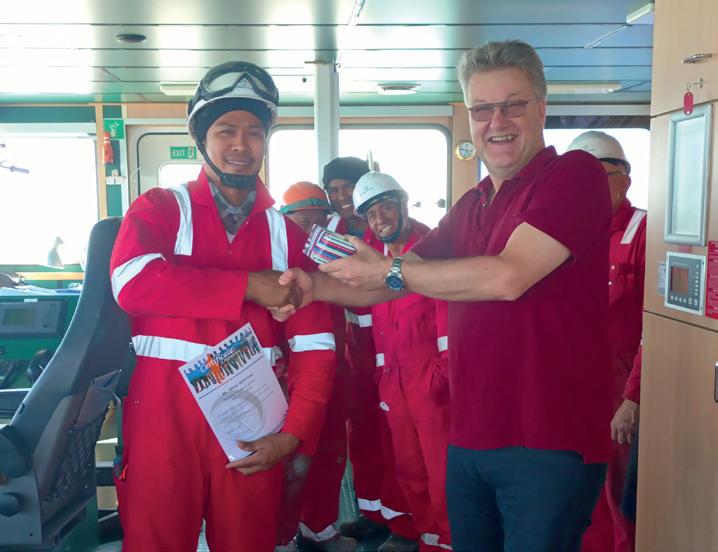
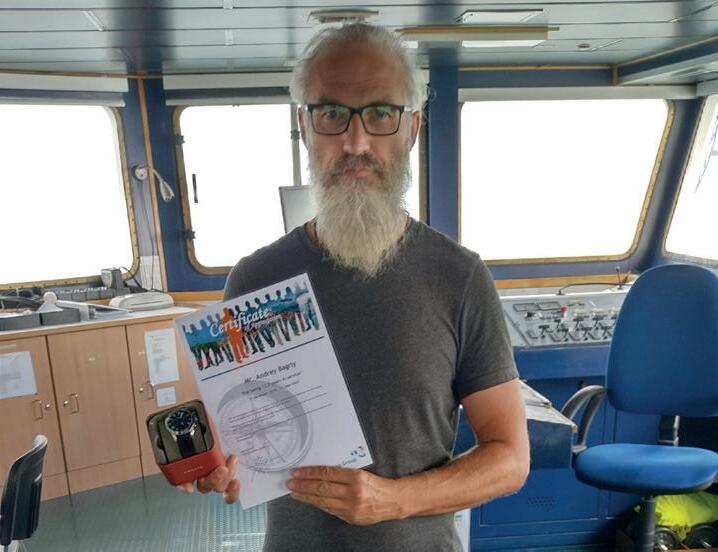
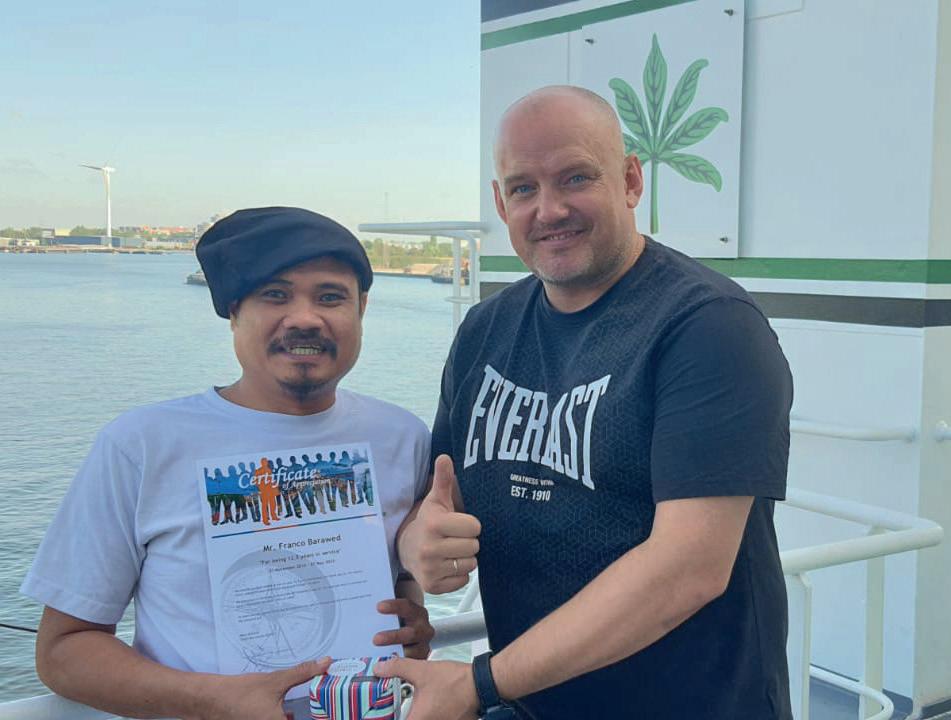
Cook F. Barawed
On 27 May, CK Franco S. Barawed celebrated his 12.5 year anniversary. When he embarked mv Berthold K. in July, he received his presents from Captain Aleksandr Boronenko. Throughout his career with us, Mr. Barawed has rotated on the various Thun Dry Cargo vessels and is presently sailing on board mv Berthold K. We appreciate his loyalty and dedication and are looking forward to continuing our cooperation for many years to come.

C/O A. Bagriy
On 11 June C/O Andrey Bagriy served our company for 12.5 years. He started his career on board mt Bro Gratitude and has since sailed on various Thun G-class tankers, in addition to several periods on board mv Silver Freya and Silver Kenna. The photo was taken on board mt Thun Gratitude. Mr. Bagriy is a well-respected, loyal and trustworthy C/O and we look forward to continuing our cooperation for many years to come.
AB J.H. Ibong
On 28 July AB Jesus Jr. II H. Ibong celebrated his 12.5 year jubilee. Captain Kushnir of mv Elisabeth K. presented him with his gifts. Mr. Ibong first joined our company when he embarked on mv Fingard in 2011. Since then he has mainly sailed on various Alster Ship vessels. We would like to thank Mr. Ibong for his hard work and dedication over the years.
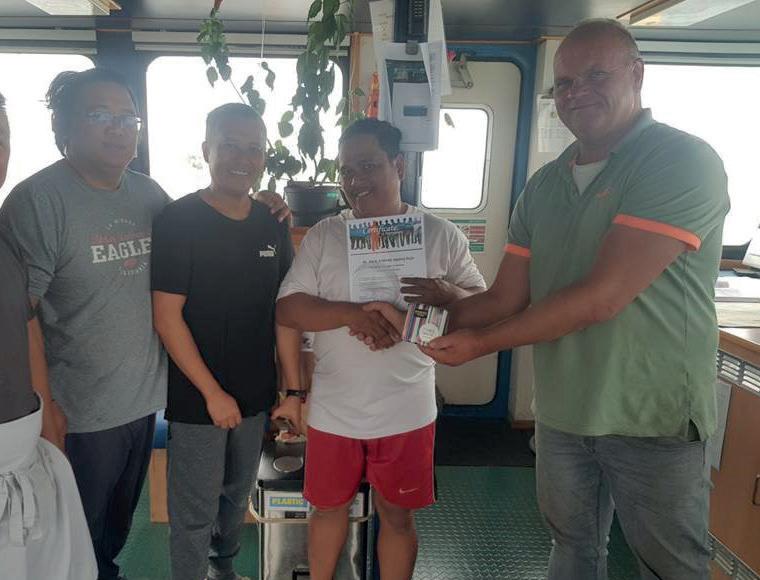
AB Oliver A. Inoc
AB Oliver A. Inoc was all smiles as he received his jubilee gifts from an equally cheerful Captain F. Broeksma, witnessed by some of their colleagues on board mv Vestanhav. Mr. Inoc’s anniversary date was 1 July last year. With the exception of his first 3 terms, mv Vestanhav has been his fixed vessel. We are honoured to have had you on board this wonderful vessel for so long.
30
AB Roy C. De La Rosa
Captain Sergejev of mv Gotland had the honour to congratulate AB Roy C. De La Rosa with his 12.5 year jubilee which was on 1 July. Mr. De La Rosa has sailed on various dry cargo vessels and, in recent years, on board cement carriers mv Iceland and mv Gotland. We thank you for your commitment and loyal service in the past years and wish to continue our cooperation for many years to come.
AB D. Kononov
On 27 July, AB Dmitry Kononov sailed 12.5 years for our company! Captain Mikhail Sindetskiy proudly presented Mr. Kononov his anniversary gifts. Mr. Kononov’s first term was as OS on board mv Zillertal. Since then he has sailed as AB on both mv Zillertal and mv John Paul K. We appreciate his diligence and commitment and look forward to working with him for many years to come.
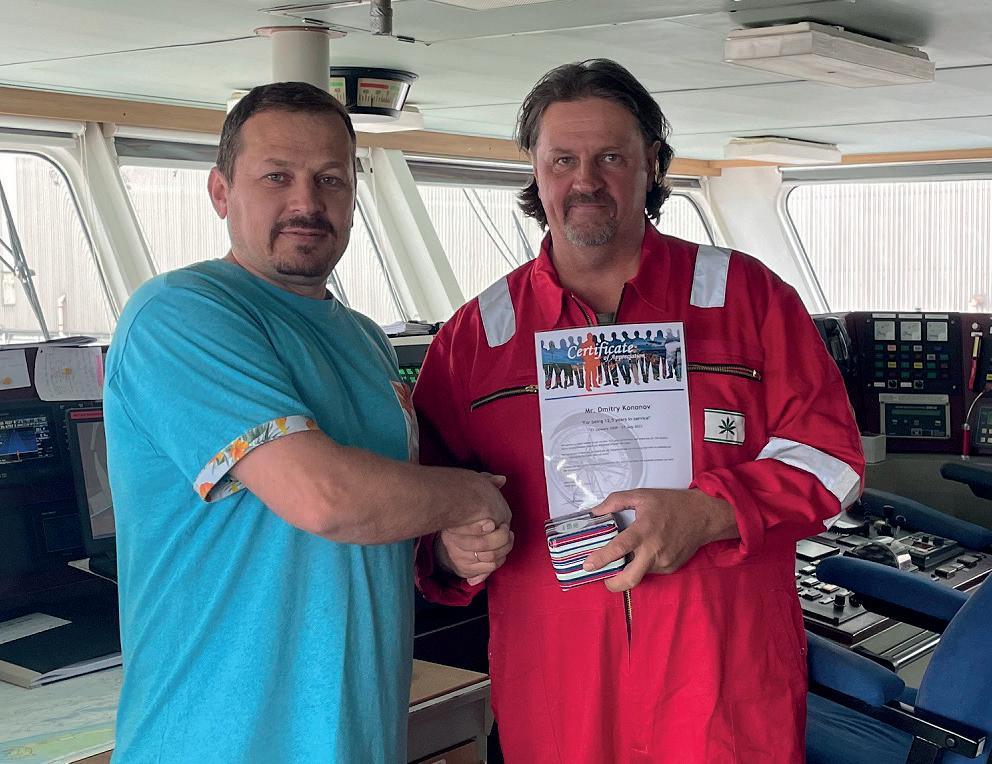
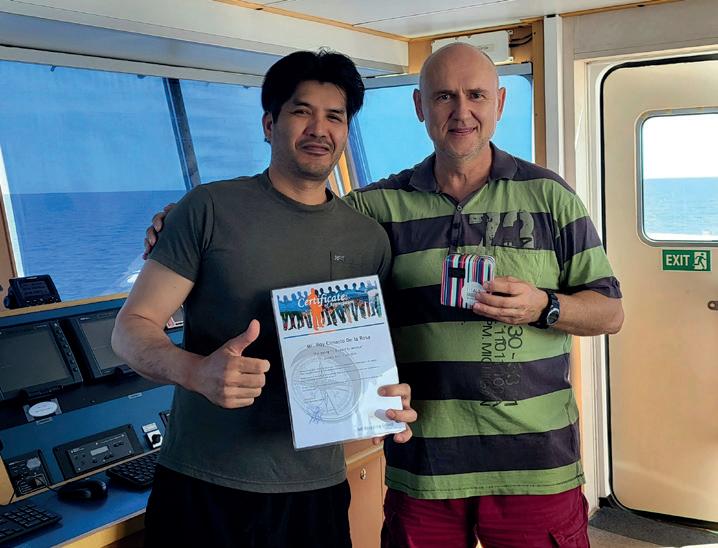
Captain Mark Leering
On 12 August Captain Mark Leering celebrated his 25 year anniversary. Mark is a well-respected, very experienced and dedicated Master and we are honoured to have him on board our company for such a long time. Mark has started his career with us on board mv Tuna but switched to mv Kinne in 2015 and has been sailing on board this fine vessel ever since. We surprised Mark with a nice cake and bouquet of flowers in order for him and his family to properly celebrate this milestone!
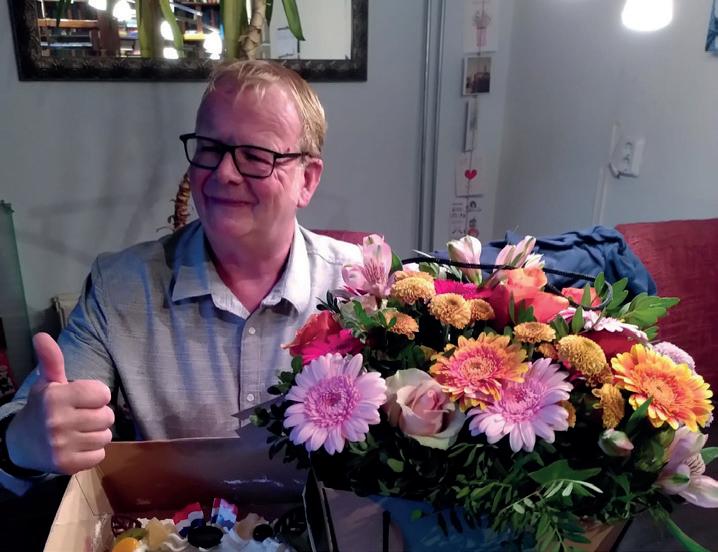
CFO Theo Dik & CPIO Ivo Ramakers
During a festive meeting at the office on Monday 11 September, the anniversaries of Theo Dik, Chief Financial Officer, and Ivo Ramakers, Chief Projects & Information Officer, were celebrated. CEO Karin Orsel congratulated them on their 25 years of service with the company. Theo celebrated on 1 September and Ivo on 21 September! You can read more about Ivo and his MF Shipping Group journey in this issue of Fleetlog.
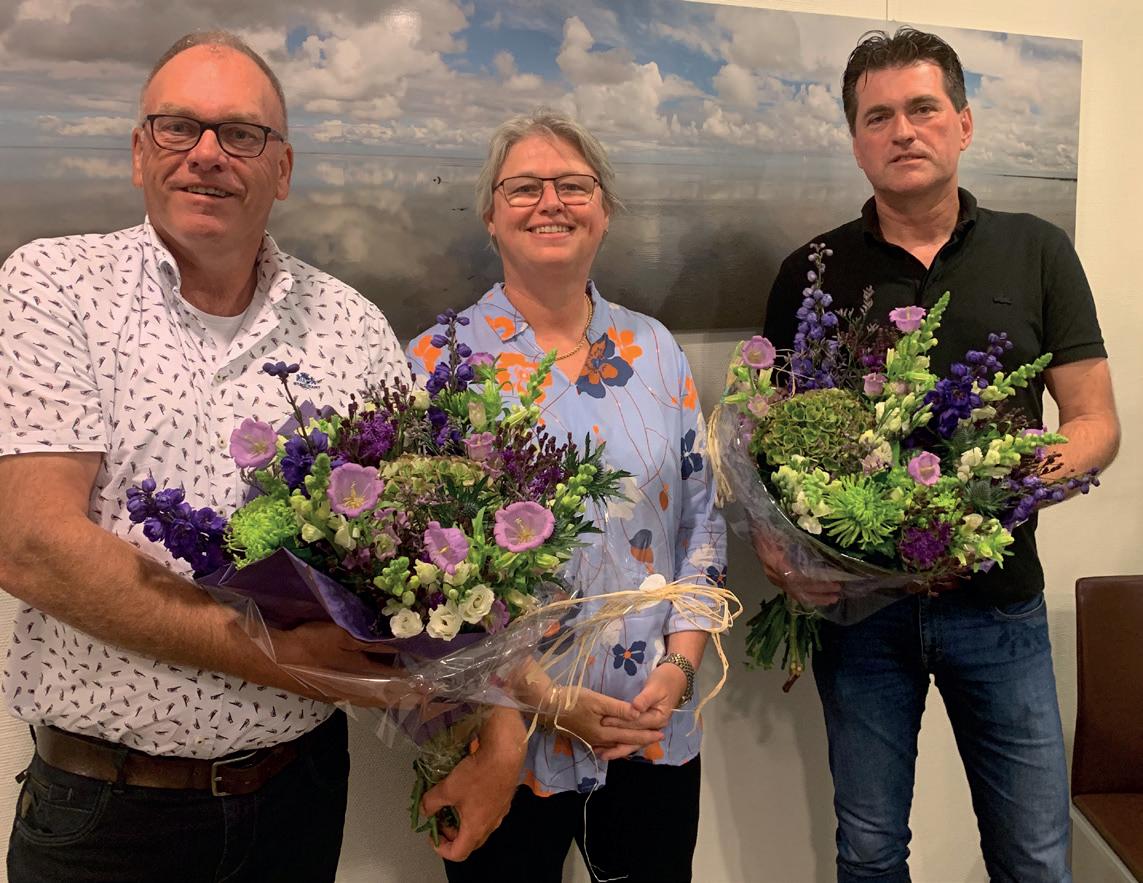
31
A shot in the dark
On board Thun Lidkoping from the point of view of a trainee
My name is Jiwan I. Autar and I recently joined MF Shipping Group as an apprentice. In March, I was struggling to find a fitting company to apply for my second term as a deck cadet. My first term was on a general dry cargo ship that voyaged all throughout the North-West of Europe, ranging from Spain to Finland. We were a small skeleton crew that consisted of 8 lunatics (including me), so the pressure was high sometimes. Overall, it was a good experience, but I found it was time to try something else.
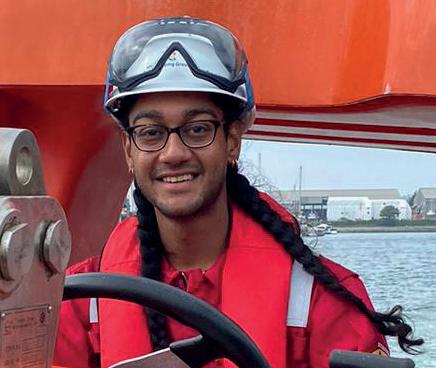
I am studying at the Maritime Institute Willem Barentsz on Terschelling in the Netherlands. Every year, the school organises a fair for shipping companies to stand at. Here, the companies can speak to future seafarers and the students can assess potential companies to apply to. I had done my research and made a selection of companies I wanted to speak to get a better understanding of them. I had already heard promising stories of MF Shipping Group from some of my friends who have worked or are still working here. When I approached the stand of MFSG, I was pleasantly greeted by Wendy van der Laan and Anita Gerritsen. They left a good impression, so I included them in my list of applications. They invited me for a job interview which ended on a positive note.
Upon embarking the vessel mid-August, I was welcomed by a fun and clever crew that were willing to teach me everything about their jobs. Honestly, I also found that I missed out on many things during my first term on board, so I have a lot to catch up on. In addition, working on tankers is very different than on a dry cargo ship. All in all, I have a lot to learn and I hope that my mentors will be patient with me and watch me grow.
My first voyage on the ship was from Pembroke to Plymouth. The vessel arrived in Plymouth on 17 August in the afternoon. Before arriving, we got an email from the agent, saying we were lucky to arrive that day. He informed us that tonight Plymouth will host the British Annual Fireworks Championships (day two) with three finalist teams competing for the New Year’s Eve fireworks contract in London.
After dinner that evening, my mentor said I could go ashore if I wanted to. When the sun had set, I had found a nice view of the bay and the start of the show was announced. The sky was lit up with beautiful colours and shimmered three times in a row for 10 minutes. After each team’s performance, I could hear the horn of the M/T Thun Liverpool sounding throughout the city. When the show was over I felt satisfied and made my way back to the ship.
After sending my certificates and meeting the other apprentices on the introduction day, I heard that I would join mt Thun Liverpool. All other apprentices were paired into groups of two, whereas I would go alone. This scared me a little bit, but nonetheless I pushed through. When I heard I would sign on the day after my birthday, the nerves really started to kick in. I have never been that nervous and uneasy on my own birthday; a terrible feeling really. However, the next day I grabbed my suitcase and drove to the airport.
So far, my time as an apprentice at MF Shipping Group hasn’t let me down in any way. I have found a warm and close crew, wonderful mentors and a great learning environment. I’m very excited about what’s to come. And with the blessing of the beautiful fireworks, it feels like the start of an amazing adventure.
32
I was welcomed by a fun and clever crew that were willing to teach me everything about their jobs
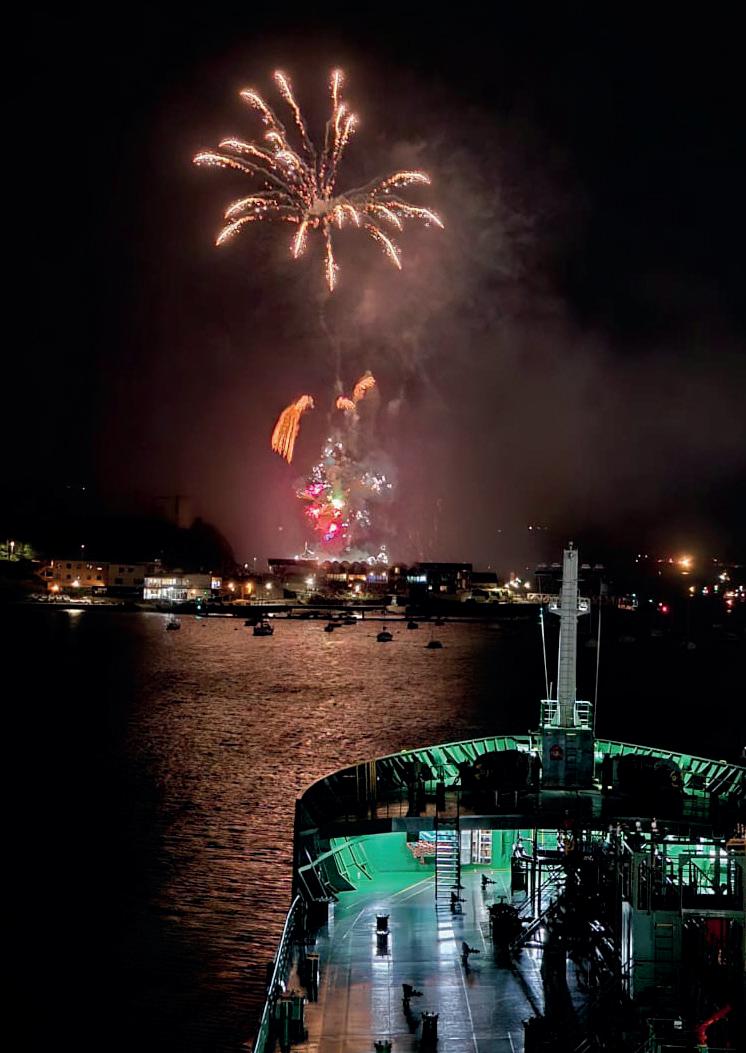
33
A life full of variety at sea and ashore
A look back at 25 years of maritime experience
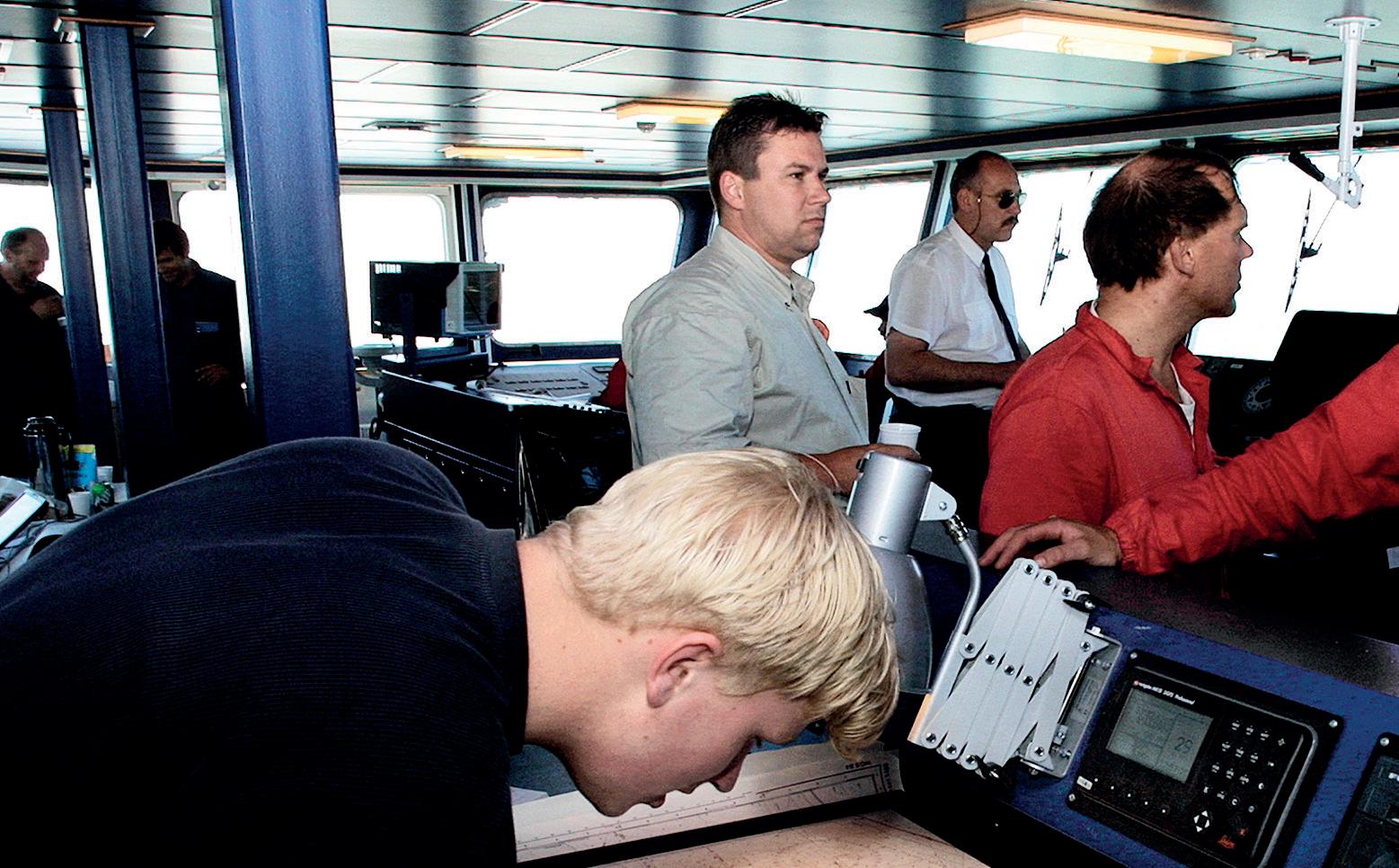
Ivo Ramakers, Chief Projects & Information Officer, reflects on a life filled with diversity at sea and ashore during his 25 years in the maritime industry. His adventure began at the maritime school, where he discovered his passion for the sea. After completing his education, Ivo had the opportunity to work aboard various vessels, ranging from dry cargo to Ro-Ro and merchant vessels. His initial steps in the maritime world were taken at Sandfirden, the predecessor of MF Shipping Group.
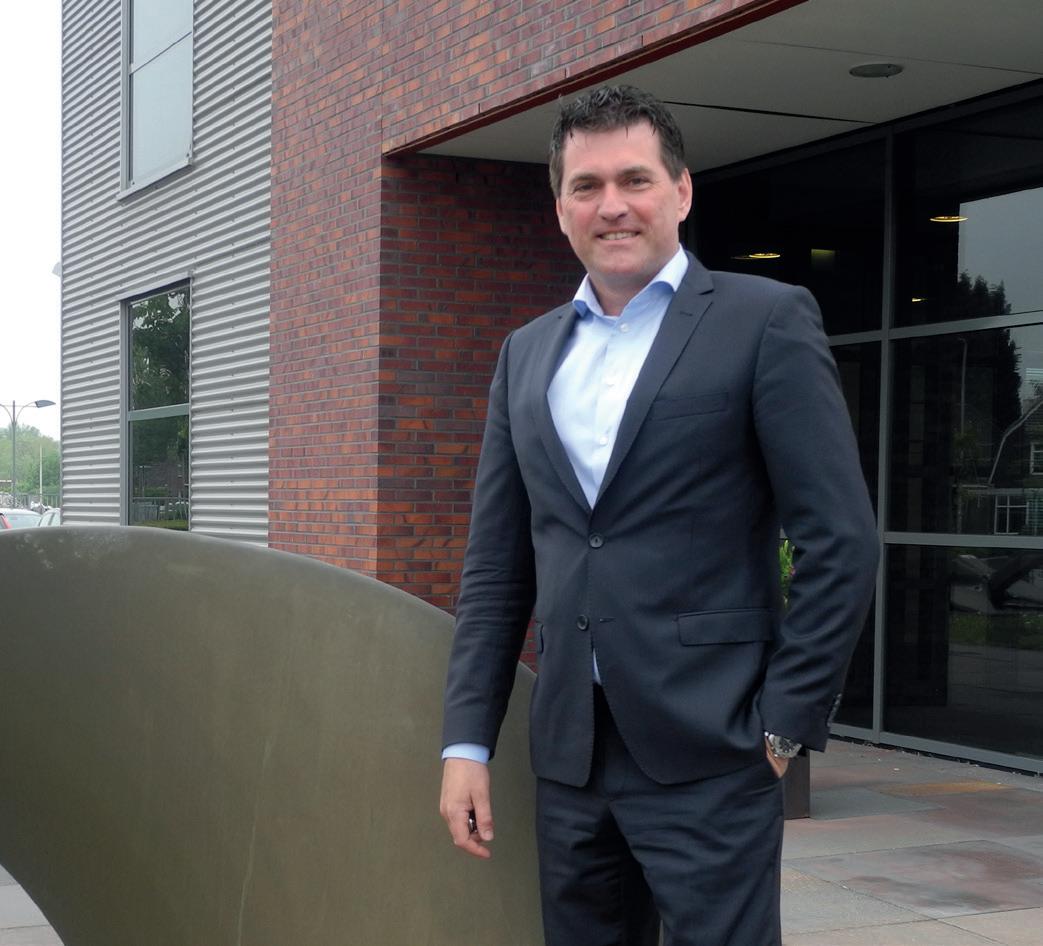
34
During the sea trials of the Bro Globe
Ivo sailed on various ships in Northwestern Europe, rising to the position of Third Engineer, acquiring the necessary certifications along the way. His sea adventures were diverse; he served as Second Engineer on a voyage to the South Pole and spent time on the Baltic Sun in North America, Canada, the Caribbean, and Northwestern Europe. However, as life often unfolds, his course changed. Ivo left the ship and transitioned to an office role, where he leveraged his maritime knowledge and experience for a new phase in his career.
From sea to office
After a brief period where he served as a Chief Engineer sailing to Africa and the Caribbean, Ivo was approached by MF Shipping Group in 1996 to oversee the final construction phase of the Ice Star at the Ferus Smit shipyard. “After the vessel’s completion, I was given the opportunity to sail on it.” Given his familiarity with the Ice Star, he was appointed Chief Engineer on the Snow Star, followed by a couple of years sailing on the Nordanhav, a self-unloading vessel.
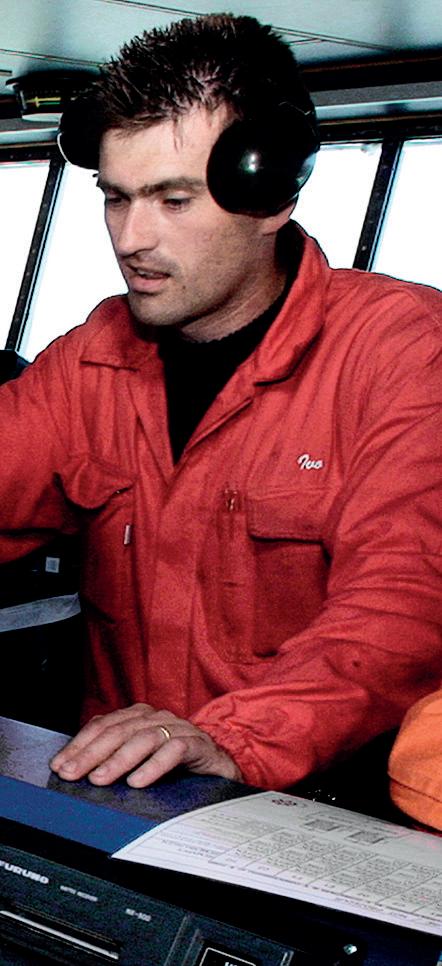
“When Thun decided to build two new tankers and preferably didn’t want to send a Swedish Superintendent to the Netherlands, it was a logical choice to ask me to oversee the construction. My sea experience, technical knowledge of shipbuilding, and understanding of onboard systems were invaluable. I knew the type of ship inside out, from
construction to practical operation. The construction of the first two tankers went smoothly and efficiently, resulting in a growing demand for such vessels. At the same time, Thun decided to expand its dry cargo fleet, leading to orders for new vessels and my transition to an office role. This change came at the right time, as I was also buying and renovating a house, and starting a family during that period.”
Ivo’s extensive knowledge of vessels and his ability to bridge the gap between seafarers operational needs and shipyard construction processes were invaluable. “With my experience, I could provide valuable input to Ferus Smit shipyard where the construction took place. I understood the needs of seafarers and could brainstorm ways for the shipyard to work more

35
I am proud of my role in the growth of MF Shipping Group. Throughout my career, I constantly faced new challenges and opportunities, and I grew along with the company’s evolution
Ivo and daughter Amy
efficiently, contributing to daily practices on board. I acted as the link between the demands and desires of the shipping company, their customers, the shipyard, and MF Shipping Group’s ship management requirements. I ensured that the entire process ran smoothly, within agreed-upon timelines, and in compliance with regulations. Additionally, I actively contributed ideas on how to improve the ships’ performance, such as simplifying piping systems, building ships in series for greater efficiency, and optimizing the construction process.”
Another client of MF Shipping Group, Bror Hussel, also began ship construction at a shipyard in Kampen, with technical management being awarded to MF Shipping Group. This created a demand for Superintendents, which led to Ivo’s role as Superintendent, given his experience. “In this role, I constantly monitored external developments in the maritime industry, stayed abreast of applicable laws and regulations, and had contacts with various industry associations, such as shipowners’ associations. Moreover, I actively participated in committees and had contacts with classification societies, as well as involvement with international organizations like ECSA. Thanks to these networks, I could enrich my insights and better anticipate the direction of future developments and regulations, which is crucial given the long lifespan of vessels”
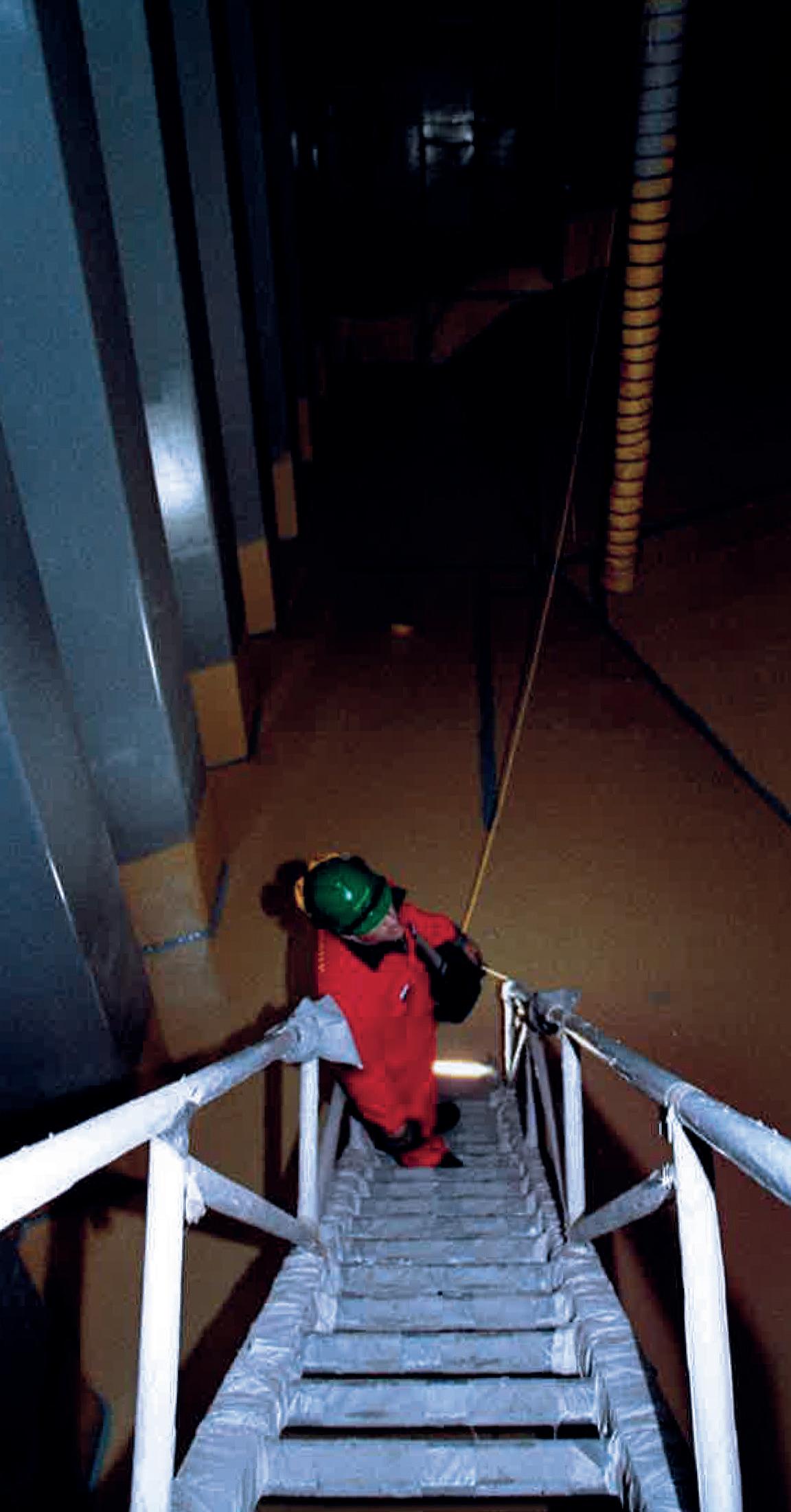
“I am proud of my role in the growth of MF Shipping Group. Throughout my career, I constantly faced new challenges and opportunities, and I grew along with the company’s evolution. I have held various roles over the years, from Superintendent to Head of Technical Services, Fleet Director, DPA, and even Head of Quality. Each step allowed me to learn. My positions were never dull, partly due to the diversity of our fleet.”
Collaboration in innovation
When it comes to shipbuilding, the wishes of customerowners, and even those of our customers’ customers, take center stage. Designing ships that provide relief to seafarers and are flexible for owners is a challenge. Maintaining a good relationship with the customers of our customers is crucial.
“The pre-construction phase is therefore crucial. We strive to align everyone’s goals during this phase to avoid surprises later in the process. Fortunately, we often share the same vision and a keen eye for people’s needs. We aim to stay ahead in the ever-changing world, especially regarding regulations, environmental requirements, and new technologies. It’s a complex interplay between the owner, the customer, and MF Shipping Group to ensure the safety and well-being of the crew while also representing the interests
of various parties as effectively as possible. Ultimately, to maintain a strong market position, competitiveness is key. At MF Shipping Group, we prioritize long-term relationships with our customers and maintain open communication with short lines of communication. The collaboration doesn’t end with me and the ship’s delivery; it’s an ongoing process. My colleagues within MF Shipping Group also maintain close contact with customers.”
Collaboration with Ferus Smit has led to fruitful ideas and innovations, including improvements in hull design and optimizing the power required for cargo transportation. “Our experience at sea, material knowledge, and understanding of various regulations contribute to the success of the different vessels they build,” says Ivo.
36
Looking ahead
With a total of 10 vessels planned at Ferus Smit for Thun between now and 2027, there is plenty of work ahead. The newbuilding program includes the replacement of 2 tankers for Nynas, 4 dry cargo ships, and 4 tankers to replace the G-class ships (the new R-class). Which will be managed by Erik Thun AB or MF Shipping Group. But that’s not all. Ivo has also been involved in parts of newbuilding projects for the Krohn-family and other clients.
Considering the substantial workload, we are delighted to announce that Superintendent Jaap Dijkhuis will be joining the Projects department as the Projects & New Building Superintendent, starting from 1 October 2023.
“We take into account the diversity of future cleaner fuels and use ‘futureproof’ engines capable of running on multiple fuel types, making it easy to transition to fuels like methanol. We are exploring for example hybrid propulsion, allowing us to add extra power when needed. Our goal is to generate power on board more efficiently. An example of this is switching from hydraulic cargo pumps to electric pumps, which yield efficiency benefits. We are also studying how to use battery technology and the ship’s network more efficiently to reduce fuel consumption. Batteries can potentially replace the third auxiliary engine, allowing us to make optimal use of the generated energy.
For many years, we have strived for maximum efficiency, aiming to transport as much cargo as possible within the constraints of ship measurements and applied engine power. Within these parameters, we are now searching for space for batteries that meet safety requirements. Creating space where there isn’t any is a challenge, as our ships are already optimally configured. Here, too, listening to the customer’s long-term vision is essential. We are pleased that they are committed to sustainable investments rather than focusing on short-term gains.”
Modifications to existing vessels
“In my role, I have also had the pleasure of being involved in the purchase or sale of ships and guiding modifications to existing vessels, such as at JT Cement AS, where we purchased
and converted several dry cargo ships into cement carriers. For the Projects Department, this meant a lot of calculations, including those related to electrical power on board and the optimal placement and type of unloading equipment. We also looked at cargo handling and equipment. Our role was to brainstorm how these modifications seamlessly integrate with the rest of the vessel.
In addition to our collaboration with Ferus Smit, we have also had positive experiences with other shipyards such as Royal Bodewes. We consider Ferus Smit our “homeyard” due to their efficiency and excellent engine room designs. We strive to reuse those successful designs on other vessels, resulting in significant cost and time savings. This also benefits our Technical Department. Furthermore, we benefit from procurement advantages by using series of engines and auxiliary engines on different types of ships, rapidly improving our levels of knowledge. Through our decades-long collaboration with Ferus Smit, we have built a strong relationship and a deep mutual understanding.”
At one point, Thun urgently needed larger tonnage. Within two years, five ships were required. The lead time at Ferus Smit was longer at that time, partly due to a lack of newbuilding slots and manpower, which led Ivo to China. “Designing the vessels was very challenging due to language barriers and convincing Chinese shipyards of our designs and philosophy. This required weeks of intensive communication after carefully auditing which shipyards met our requirements. Sometimes, I hear doubts about the quality of ships not built in the Netherlands, which I find unjustified. The basic design, along with the quality of the shipyard, determines the quality of the vessel, and we have had good experiences with the Chinese shipyard.”
As for his own future, Ivo sees plenty of challenges ahead. “The dynamics in the shipping industry remain significantly high. There is still much to do and learn, and, above all, I still enjoy my work at MF Shipping Group. My career has been a versatile journey so far. Shipping continues to be my passion, and I am ready for whatever the future holds.”
37
Shipping continues to be my passion, and I am ready for whatever the future holds
The Happiness Index
Measurement of happiness onboard
In the fast-paced world of shipping, the well-being of our seafarers is of utmost importance. At MF Shipping Group, we understand the significance of ensuring a healthy and happy working environment onboard our vessels. To achieve this, we have decided to implement the Happiness Index. This enables us to periodically measure the well-being and satisfaction of our seafarers, as we believe that happy employees contribute to the safety and effectiveness of our operations. But why do we pursue this approach, you might wonder?
There are three distinct reasons.
1 2 3
Firstly, our seafarers are the cornerstone of our operations. We acknowledge that their well-being significantly influences onboard safety and performance. Through investing in the well-being of our staff, we not only foster a positive and supportive working environment, but also amplify their engagement and motivation. Content employees exhibit heightened alertness, motivation, and enhanced teamwork, ultimately elevating the comprehensive quality and safety of our endeavors.
Secondly, the Happiness Index enables us to benchmark our performance against the broader industry landscape. We aim to gauge whether we are surpassing or lagging behind our competitors. Through consistent measurement, we can identify industry trends and shifts, thus adapting our policies accordingly.
Thirdly, the index serves as a tool to evaluate the effectiveness of our internal policies. For instance, upon implementing a vitality program, we aim to gauge the authentic elevation in happiness and contentment among our employees resulting from these endeavors.
For this initial measurement of the Happiness Index, we reached out to 950 seafarers, out of which 258 responded. Although this serves as a baseline measurement, it has already provided us with valuable insights. What stands out is that we outperform the competition on all aspects. This is a great encouragement and indicates that we are generally doing well. Additionally, there are variations among different groups of employees. For instance, younger employees give lower
scores compared to older ones, and Dutch colleagues tend to be more critical than colleagues from other nationalities. We also observe differences in “happiness” across segments in which our vessels operate. The busier it is onboard, the happier the seafarers seem to be. This implies that a “onesize-fits-all” policy is not suitable; instead, we need to focus on specific target groups and their needs to improve life onboard. Moreover, aspects such as family contact, crew
38
interaction, and inclusivity receive high ratings. This suggests that the overall atmosphere onboard and within teams is positive.
What comes next? Our plan is to conduct this survey periodically, perhaps every quarter. This will allow us to keep a close eye on the situation and monitor changes in sentiment onboard. Furthermore, the results will inspire us to delve deeper into certain topics. For instance, why are younger employees less happy than older ones? And what resources are necessary to enhance well-being in terms of “fitness and health” onboard? We need your feedback and ideas, and we hope for an abundance of responses next time.
We also wanted to share these pictures from the Thun London & Thun Lundy with you. It’s really great to see their enthusiasm and how they are working on their wellbeing on board. A good example for other ships and crew members.
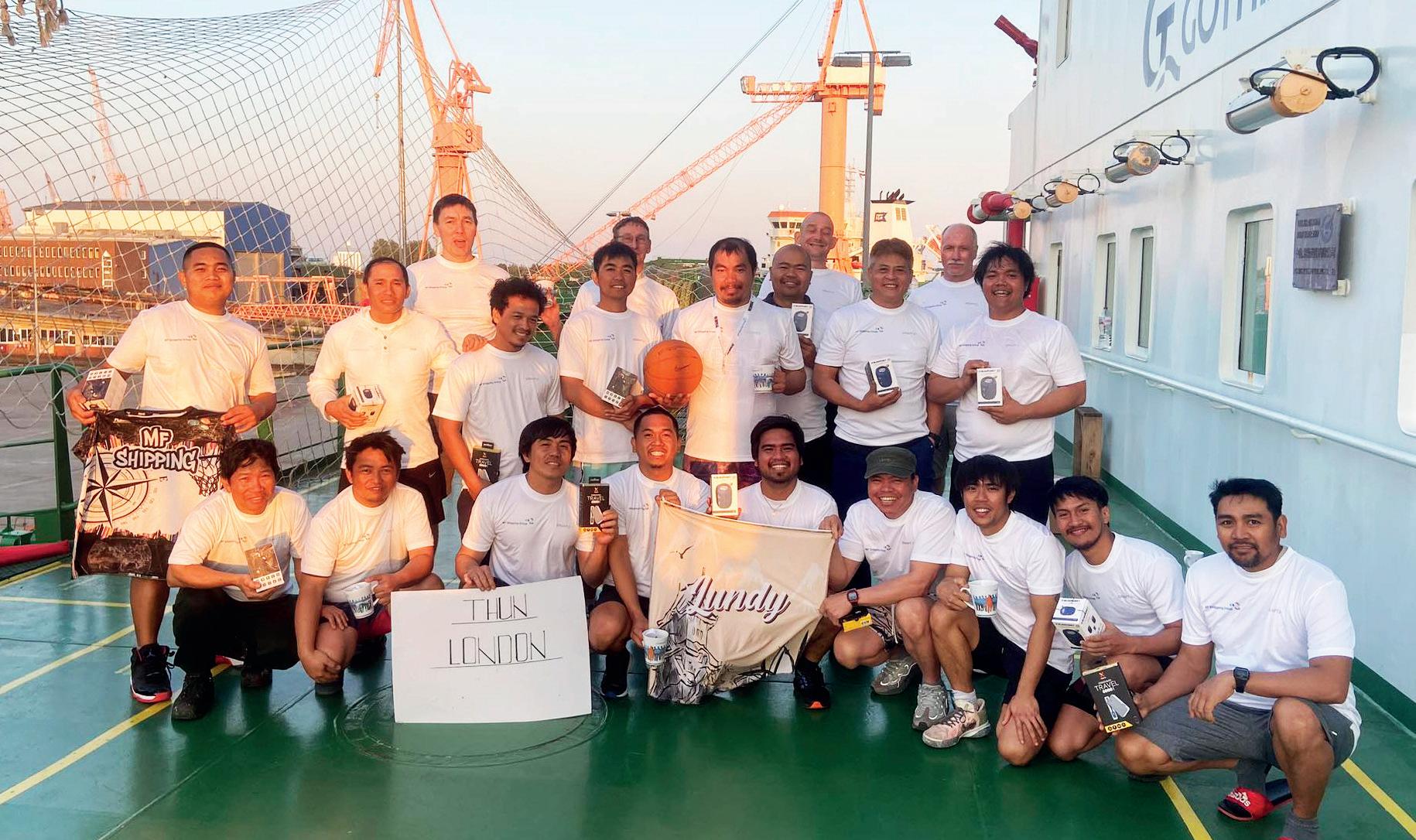
We invite you to share your photos, stories and experiences. Have you also initiated inspiring initiatives on board to promote the well-being and happiness of the crew? Or have you organised fun activities to build team spirit?
Send your contributions to communication@mfgroup.nl and who knows, you might be the one to shine in the next Fleetlog.
A competition between vessels!
In mid-June in Emden, Germany, two of the L-tankers were in the yard at the same time for dry-docking. During the days we were together at the shipyard, the crew of Thun London and Thun Lundy held a basketball tournament after work.
The Thun London’s basketball court was the venue for the games. The crew of the vessels made both teams compete against each other. The games were played with high intensity to defend the honour of the prestigious ships. The game was of a high standard and stamina as the temperatures on deck were still above 25 degrees Celsius and there were prizes to be won. As we are all from Team MFSG, all participating crews wore the same white MF shipping Group sports outfit.
After the games were played, we lost track of the score, so we agreed that the winner was the entire crew of both vessels.
Dennis van der Zwaard – Master of mt Thun Lundy
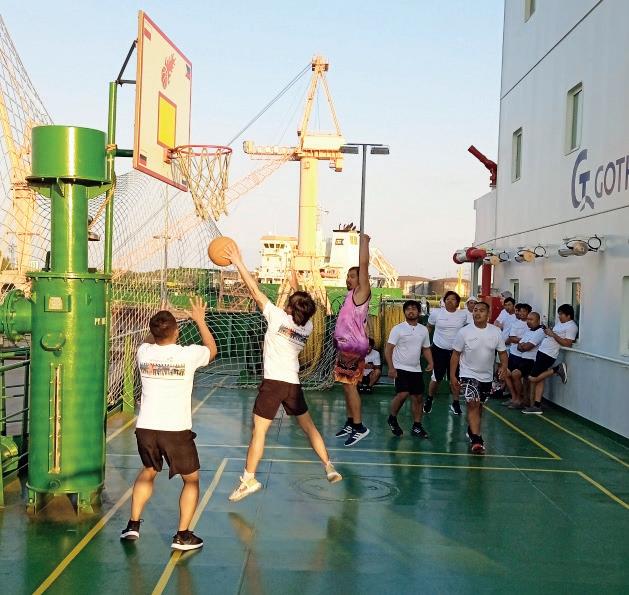
39
^ Winning players and their prizes!
Welcome on Board
Marisa Gacela Crew Specialist
I’m Marisa Gacela, Crew Specialist at MF Shipping Group. Originally from the Philippines, I moved to the Netherlands last October to start this exciting journey in the shipping industry. As a newcomer to the industry, I’m eager to learn and grow, bringing my enthusiasm and dedication to fostering strong crew relationships.
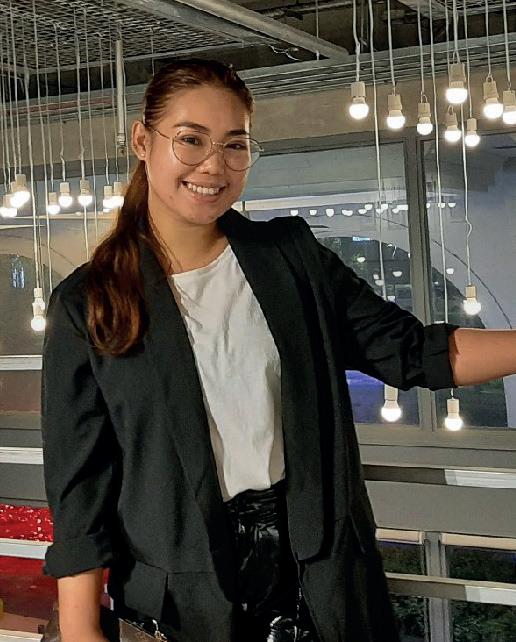
At MF Shipping Group, I feel fortunate to work in a welcoming environment where I can make a positive impact on the lives of seafarers. Outside of work, I love exploring new places and experiencing different cultures. With an open heart and a passion for what I do, I’m thrilled and excited to contribute my skills and take on new challenges on this rewarding journey in the maritime world.
Muhammed Yavascay Accounting Assistant
My name is Muhammed Yavascay and I am 22 years old. I joined MF Shipping Group in February this year as a trainee in the Finance Department. This internship program was part of my final year at school. After graduating I will continue my studies at the Hanzehogeschool in Groningen.
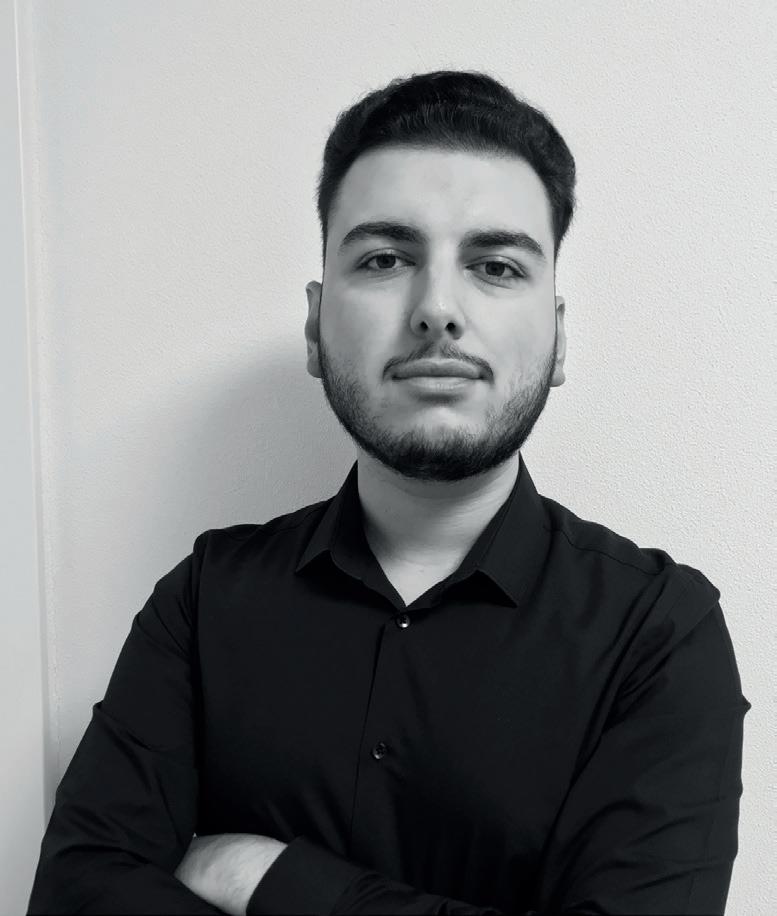
As from August I will continue as an Accounting Assistant. This is the first time that I have been involved in the shipping business and ship management, and I am eager to experience and master the new challenges that lie ahead.
I am happy and proud to join this welcoming and respected company that is MF Shipping Group.
40
Vladislav Vasilyev Crew Specialist
My name is Vladislav Vasilyev and I joined MF Shipping Group in July last year. I started as a trainee in the Secretary Department for my university internship. As for my career in our Crew Department - I started as a Crew Assistant in February this year and have been a Crew Specialist since July.
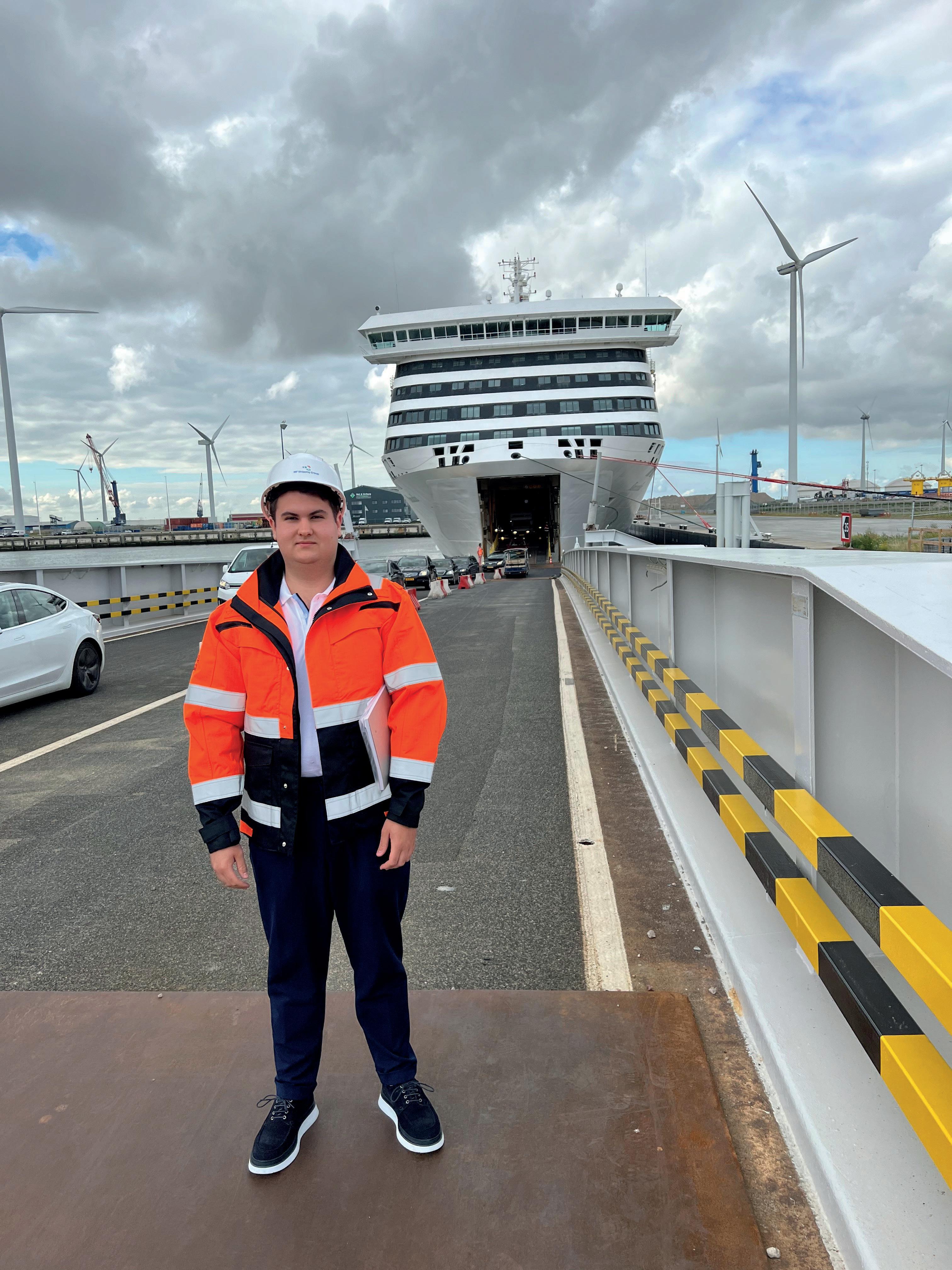
In terms of my academic background, I am a Bachelor of two universities - British and Polish. After spending three years in Warsaw studying at the university, I finally moved to the Netherlands this summer. I am currently based in Farmsum, just a few minutes from our office.
My aim as Crew Specialist is to contribute to the creation of a friendly atmosphere on board our vessels and to ensure that crew changes take place on time, which can be achieved by building up a trusting relationship with each crew member. I believe that the most important aspect of the relationship between the Crew Department and the crew is good communication. I look forward to meeting you during a vessel or an office visit.
Back on solid ground, I share my life’s voyage with my wife, a women’s health coach. Together, we embark on a different kind of journey, exploring remote places during day-long hikes in the mountains. It’s during these treks that we find serenity and inspiration, fuelling our passion for the great outdoors and well-being.
Recently, I have navigated the seas aboard the Thun Lidkoping, immersing myself in the life of seafaring to better understand your world. From this unique vantage point, I step into the role of Crew Health & Welfare Specialist.
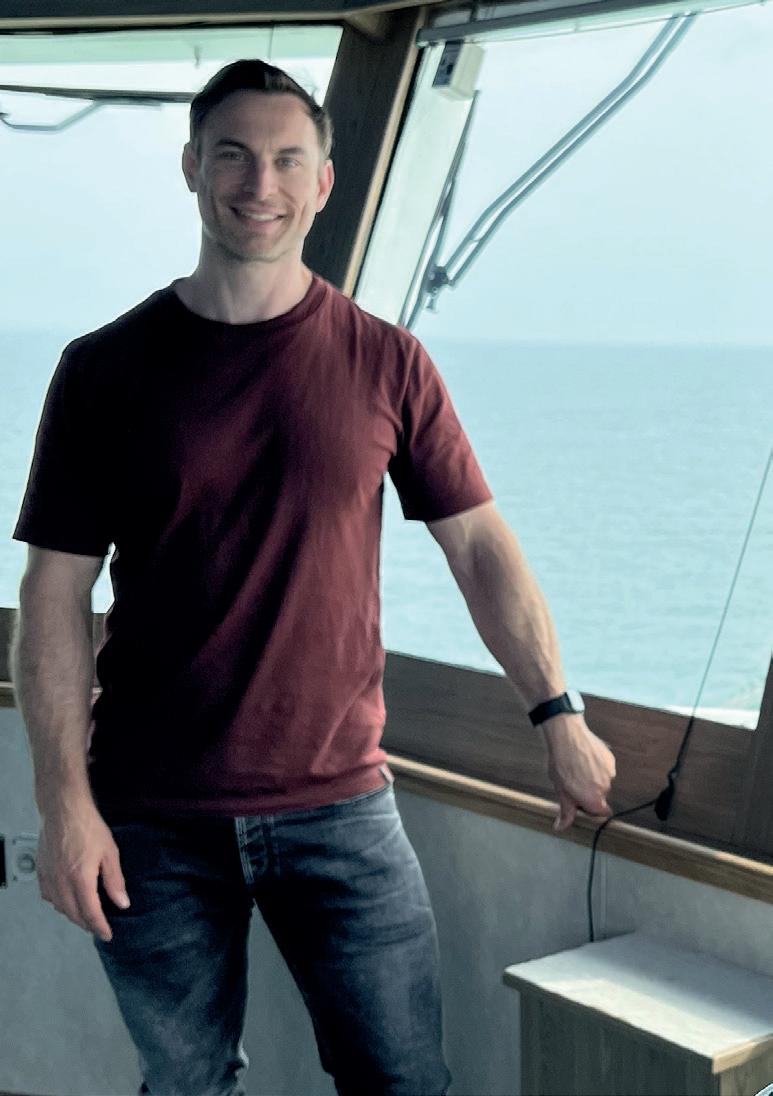
Before my maritime adventures, I charted a different course as a personal training club owner, guiding diverse individuals toward better health. My journey also ventured into the realms of technology, encompassing projects like Fitness in VR and fitness marketing tools.
As we sail together into uncharted waters, I invite you to share your thoughts and ideas. Let’s set a course for a healthier, happier voyage ahead.
41
Crew on Board
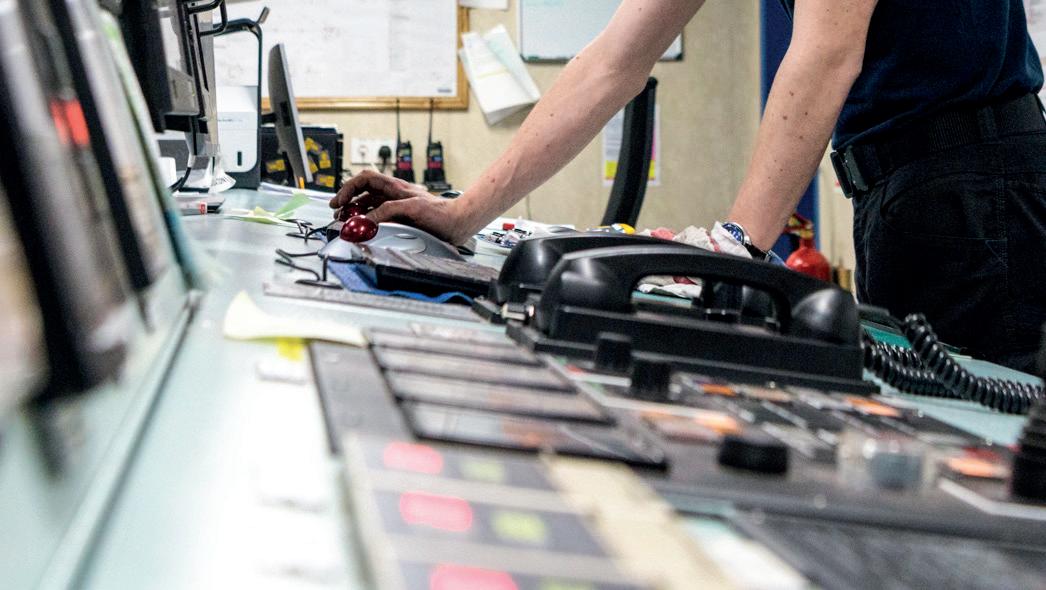
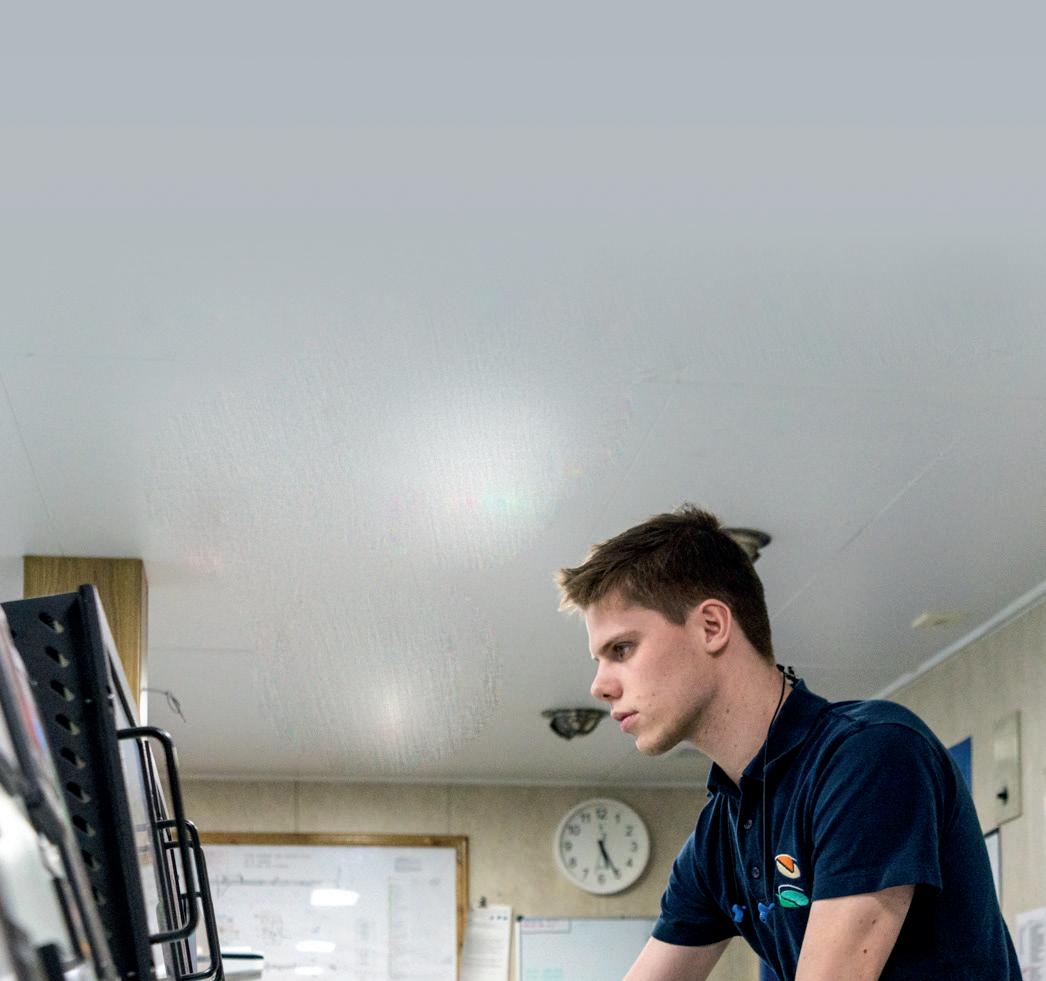
42
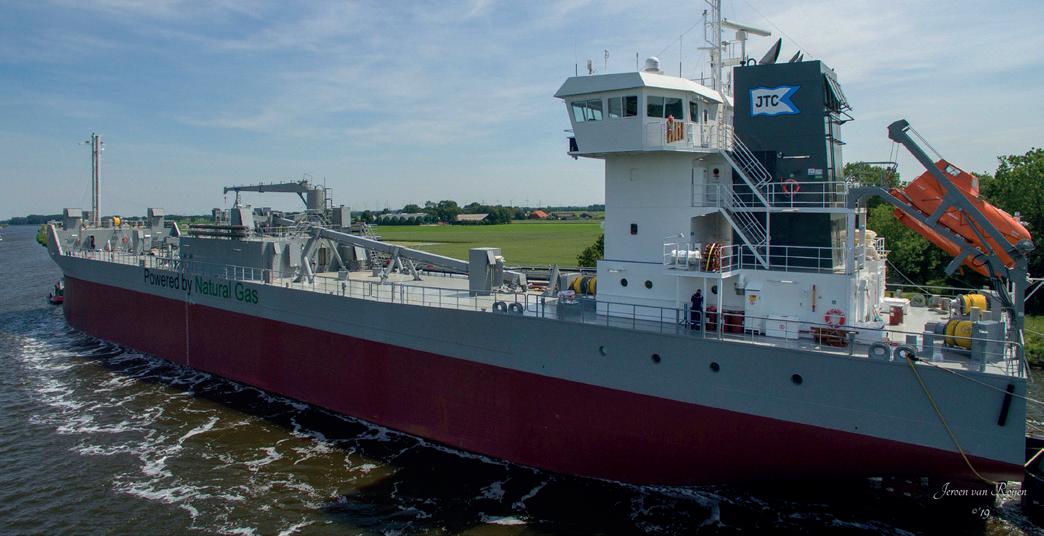
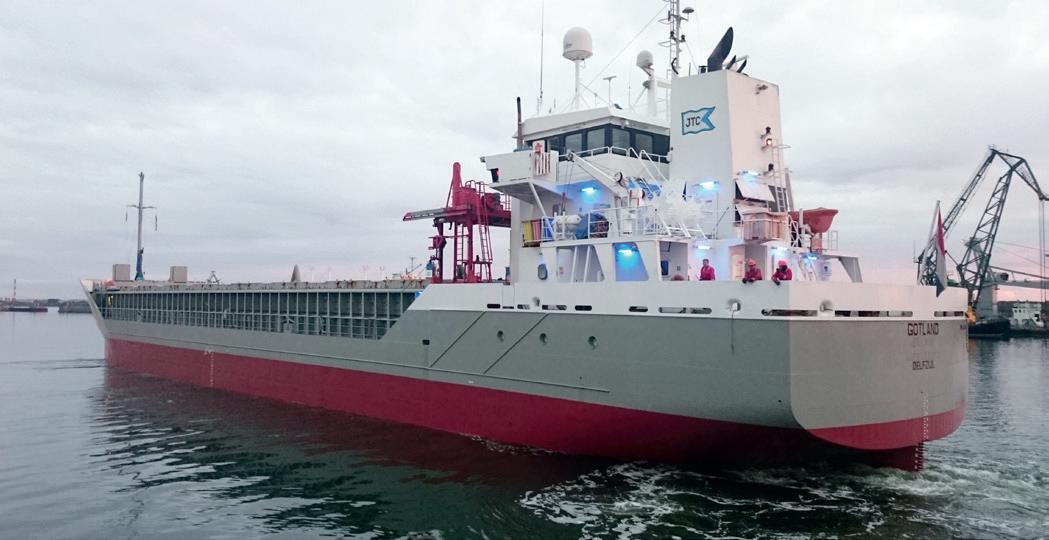

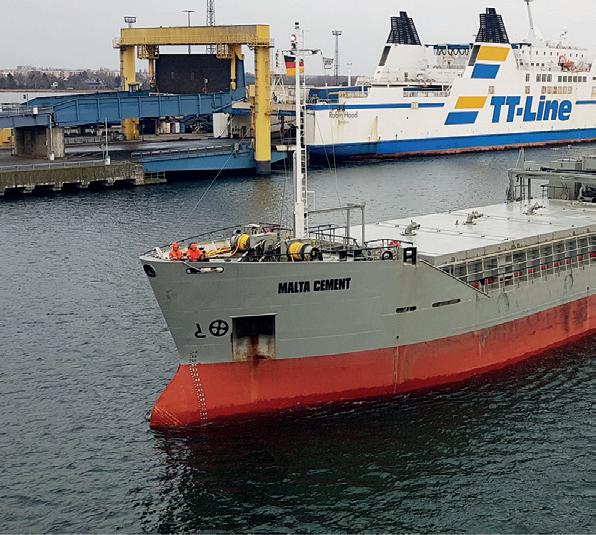
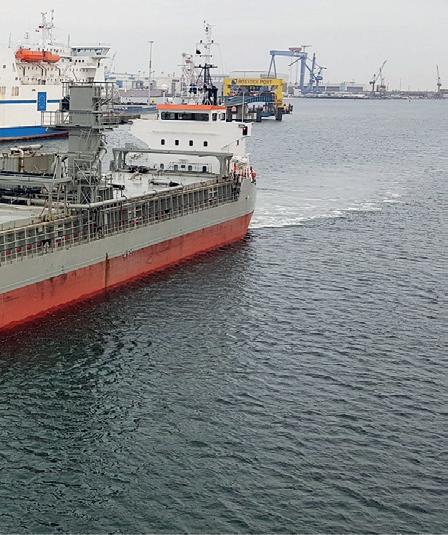
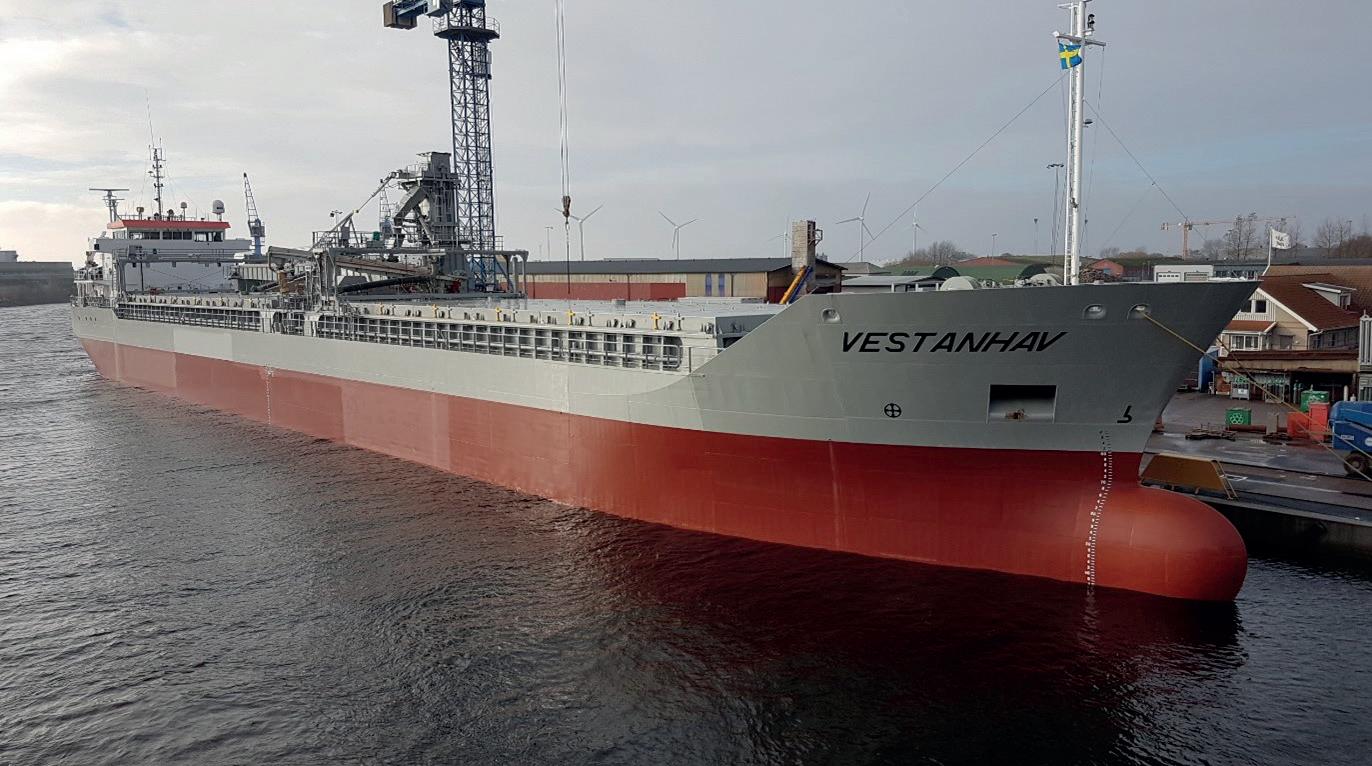
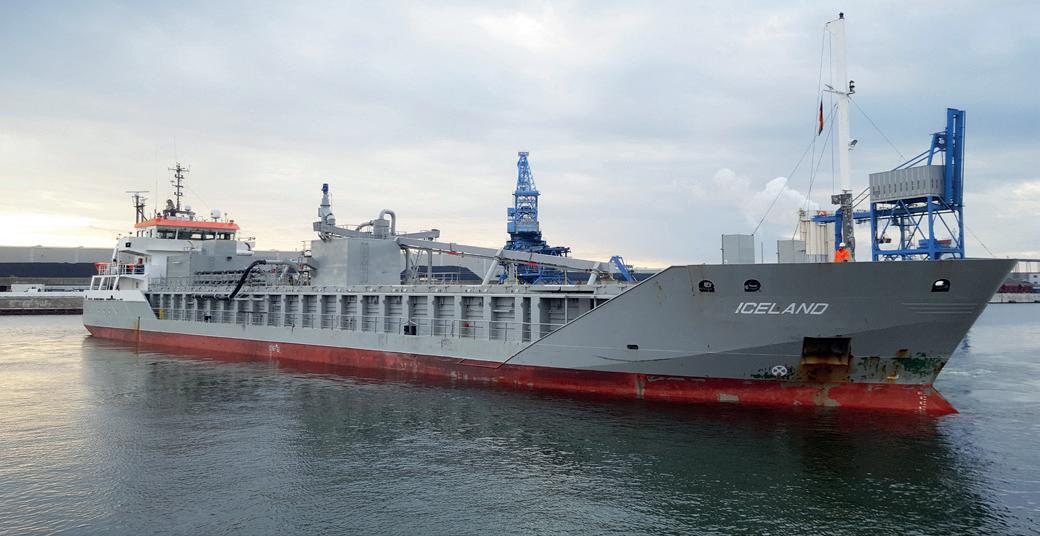
43 Shetland Master Chief Officer 2nd Officer 2nd Officer 2nd Officer Chief Engineer A. Petsevich I. Vityazev R.P.F Putol Fiel A.D.A Dano Amorin A.D.A Dano Amorin E. Zolovskiy A. Rakhunok A.G.C. Cantilero F.M.F Frejoles J. Lim R.M.C. Cara-os 3rd Engineer AB AB OS Cook Bornholm Gotland Master Chief Officer 2nd Officer Chief Engineer Fitter AB AB AB Cook/AB R. Bazalij E.B. Bolos Macasil J.R.S Salilin S. Baklagov R.R.H Ramirez Hirang J.L.B.A Alcantara A.S.J. Juridico F.A.R Ragusta M.A.R Managbanag N. Padzior V.A. Drynkin J.M.A.L Lago V.V. Yurchenko Y. Mykhalchenko E. Rosales I.C.B. Baylon N.B.C.G Gabrinao R. Garcia Pagtulon-an Greenland Ireland Master Chief Officer 2nd Officer 2nd Officer Chief Engineer 2nd Engineer AB AB OS Cook Apprentice A. Vokulov S. Kishchenko R.D.A Anagap R.M.C Cayanong M. Brysin G. Panasenko C.L. Vargas M.L.G.P. Perey C.P. R Romulo E.I. Omandam M. Uzliakov A.N. Kalashnikov E.V. Gromov J.R.M. Maraviles C.L.G Lucaylucay Gonzales A.N. Kolpakov P. Artemov J. Pinero D. JR. Balbanida R.A.V Albay Veloria R.D. Layawon Cyprus Cement Malta Cement Master Master Chief Officer 2nd Officer 2nd Officer Chief Engineer Chief Engineer 3rd Engineer Fitter AB AB OS Painter Cook A.A. Erin S. Nedvigin A.U. Panta L. JR. DelaCruz Bernabe A. Vakurov R. Susloparov A. Boyarchuk R. Baba Flores M.F.A.C Ang Cebreros C.J. Molleno Aso M. Zakharov R.P. Plaza A.P. Guanco O.S. te Loo O. Vasyltsev V.V. Dacal V. Didenko M. Radomskiy E.B.S Socito C.D.F Felizarta J. Balbaguio I.P.T. Nomus M.S. Saenz Vestanhav Master Chief Officer 2nd Officer 3rd Officer Chief Engineer 2nd Engineer M.L. van Straten E. Bodrov E. Tantuan F.M. Fernandez Munoz D. Morozov A. Pisanov E.P.L. Lopez F.L.V Valerio R. A. Enriquez O. A. Inoc E. Tined P. Kokorev Fitter AB AB AB AB Cook Iceland Master Chief Officer 2nd Officer Chief Engineer 3rd Engineer E.A. Kizimov V. Lykov K. D. LLanes O. Alexandrov V.V. Bezrodnyy J.M.M Magnawa J.A. Masiado Arbiz P.J.M.S Mejorada Son R.P.T Tion AB AB AB Cook/AB
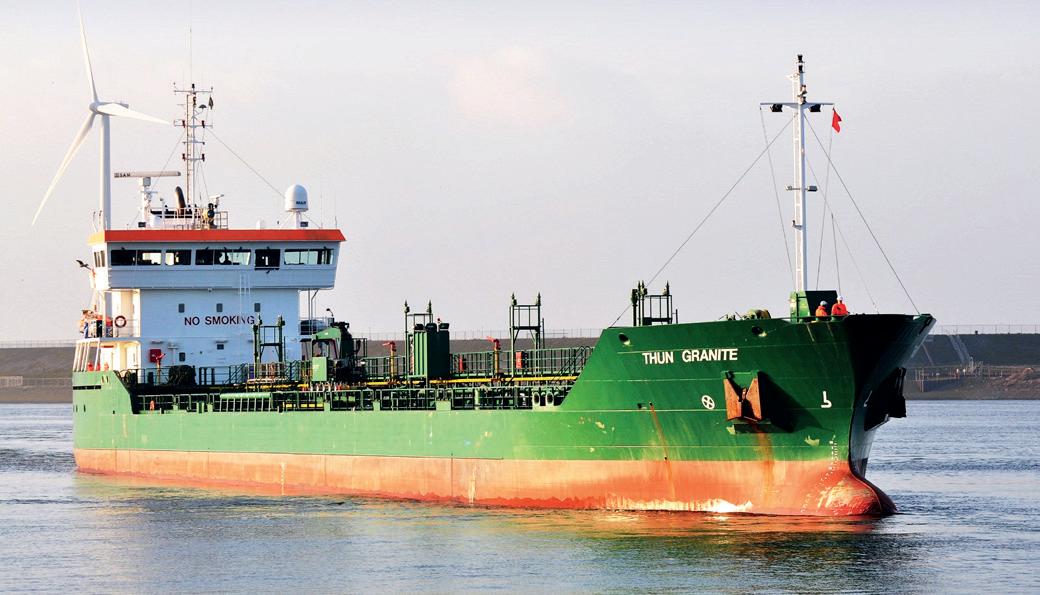
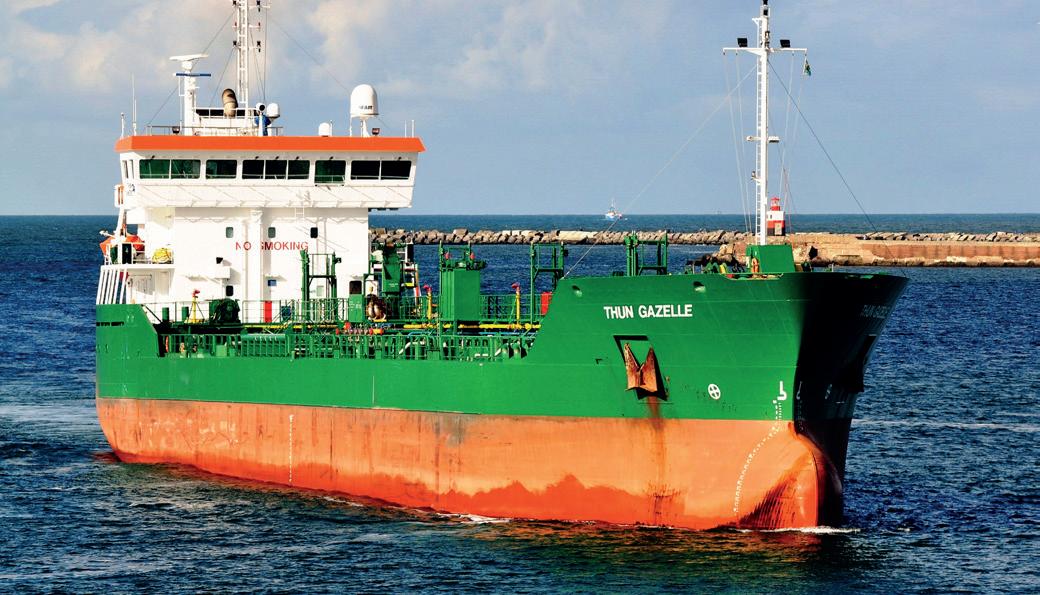
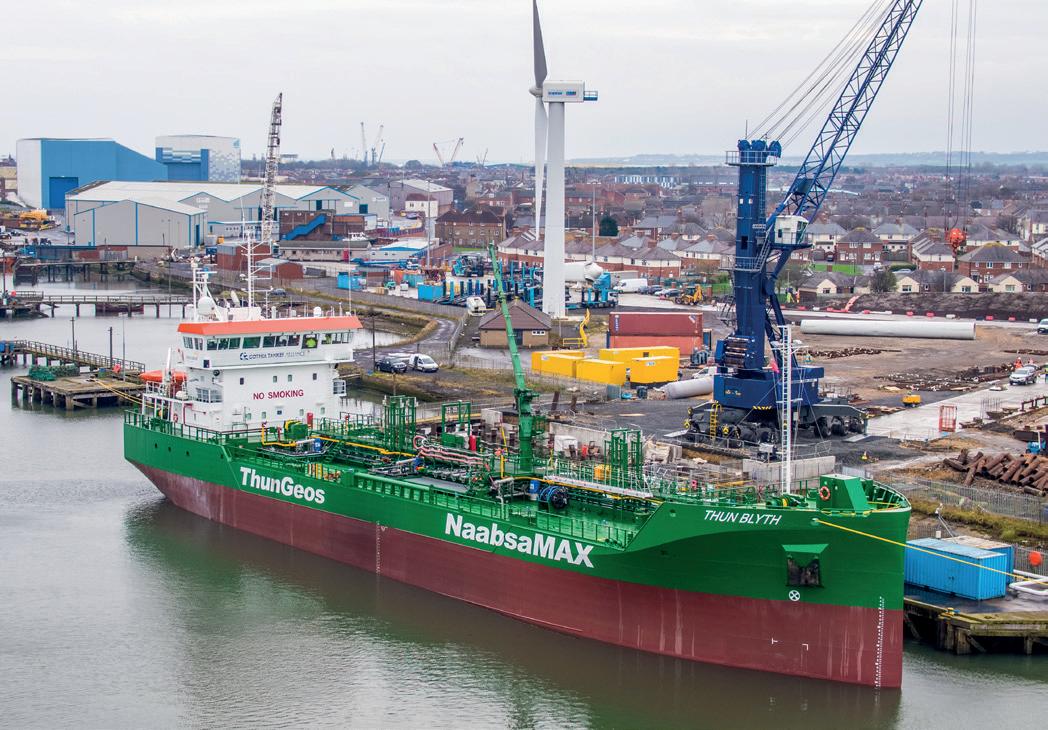
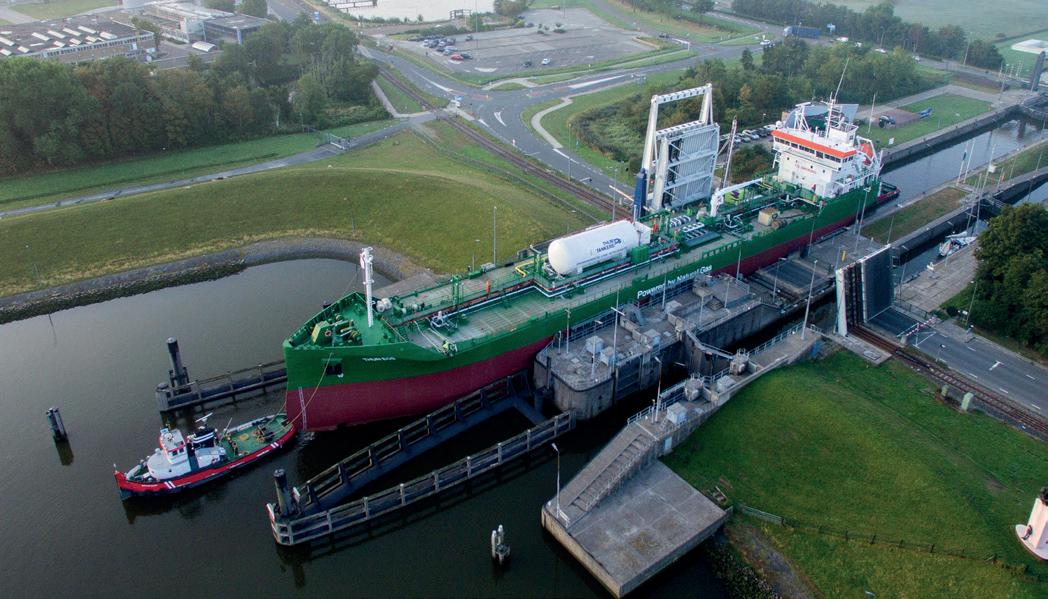
44 Thun Gemini Thun Genius Thun Granite Master Chief Officer 2nd Officer 2nd Officer 3rd Officer Chief Engineer 2nd Engineer AB AB AB Cook/AB E. Grebnev V.V. Andreev P.K. Poplawski A. Bos A. Danilov M. Ilichev L.H. Magwali N.Q. Perez J.P. Perez M. Surkov N.A. Torres D.B Amolat JR R. Berkhamov F. Dam M. Velikorodov A. Gordiyenko R.P. Franco K.L. Cananes R. P Carreon L.D.V Villar H.F.M. Kat D. Gashkov D. Ramirez C.E.A. Arends A. Dubinin M.A.D. Gocela D.F. Barrera T.E. Evora Tolentino N M Bernil M. Kinash Thun Gratitude Master Chief Officer 2nd Officer 3rd Officer Chief Engineer 2nd Engineer AB AB AB Cook/AB F.J.M. Kruidenier A. Bagriy M. Vasin K. Rozhkov R. Krivtsov A. Shapovalov F.T. Panganiban R.T. Tarrosa B. Jacinto A.J. Gimao Thun Garland Thun Gazelle Master Chief Officer 2nd Officer 3rd Officer 3rd Officer Chief Engineer 2nd Engineer AB AB AB Cook/AB I. Chumakov G. Kolobkov J.M. Lagunday A.A.T. Surdivillar B.O. Bibar D. Fedorin O. Serikov A.C.C. Asturias C. Reyes D. P. Cole A F Brieva Jr A. Kulikov P. Makshanov B.P. Projo R.C. Pogado V R.Y Galaura A. Garin E. Ong A.N. Nualda J.G. Villanueva P.T. I. Ofamin E. Silverio Thun Blyth Thun Britain Master Chief Officer 2nd Officer 2nd Officer Chief Engineer 2nd Engineer AB AB AB Cook/AB G. M. Matusiak E. Golovanov A. Maltsev G. Makurin A. Shishkin I. Serenko JP. F. Galvan E.C. Camia K. Fedotov C. M. Casilagan J. Makal M. Diuzhakov S. Zhulin P. Kuznetsov A. Zubin A. Tyapkin V. Stratienko R. Denisov A.V. Shakhaev S. Philippov Thun Empower Thun Eos Thun Equality Master Chief Officer 2nd Officer 3rd Officer 3rd Officer Chief Engineer 2nd Engineer AB AB AB Cook/AB Apprentice P. Nasman A. Hut H.C. Pablo A.N.C.U Cayanes Urbano J.K. Cabeza W. S. Bak O. Ryaboshapka J. P. Desesto F M Masalonga M.G Sanchez R. S. Arceo M.W. Bak P.S. Cornelissen A. Kuraev P. Korkosz M.G Napenas S.V. Samsonov A. Zaitsev V. Karpunin A.S. Zamora J.J.Q. Romero G.C.B. Bardinas Magno A.M. Ascan L.M. Hansen D. Myagkov F.L. Patungan S.M.G. Ngipin N.G. Amolat O. Raisuotis A. Chetyrkin J.M. Manalo W.L. Puyawan A.P. Soriano S. Concepcion A Naumov Thun Evolve Master Chief Officer 2nd Officer 3rd Officer 3rd Officer Chief Engineer 2nd Engineer AB AB AB Cook/AB D. Vorobev J. Hut R. Abrigonda J.M. Melgar G.S. Arradaza R.A. Veltman V. Alekseev A.G. Gaurana J A S Sibonga J.A. Pahaganas R.I.C Cabreros
Technical Management
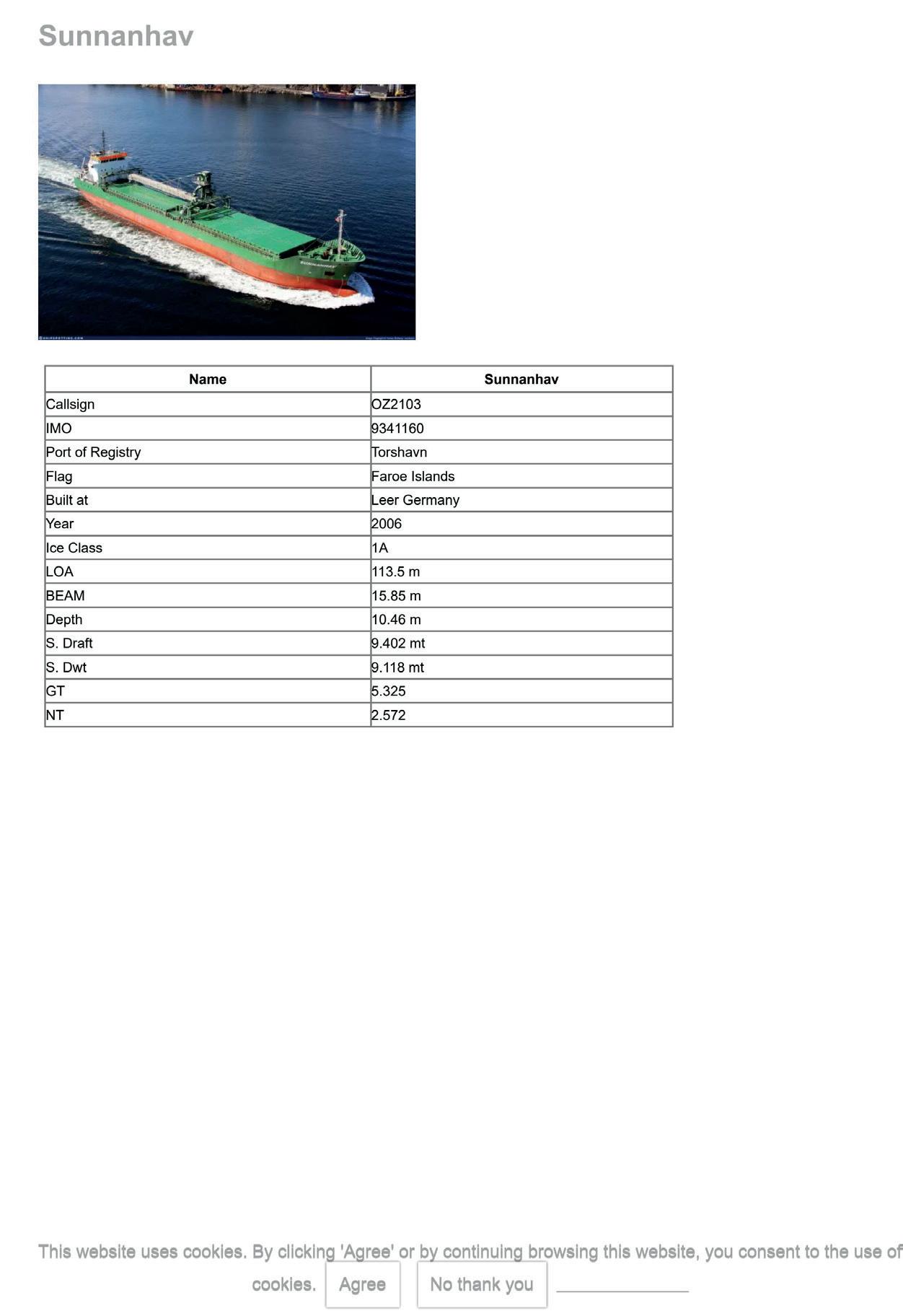
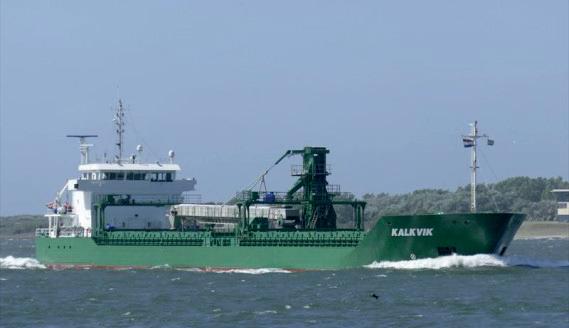
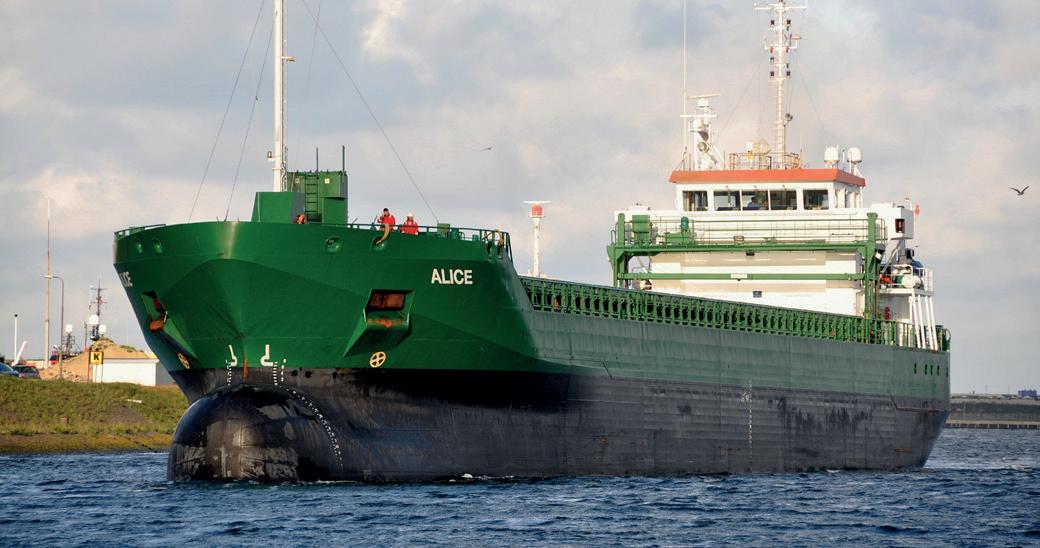
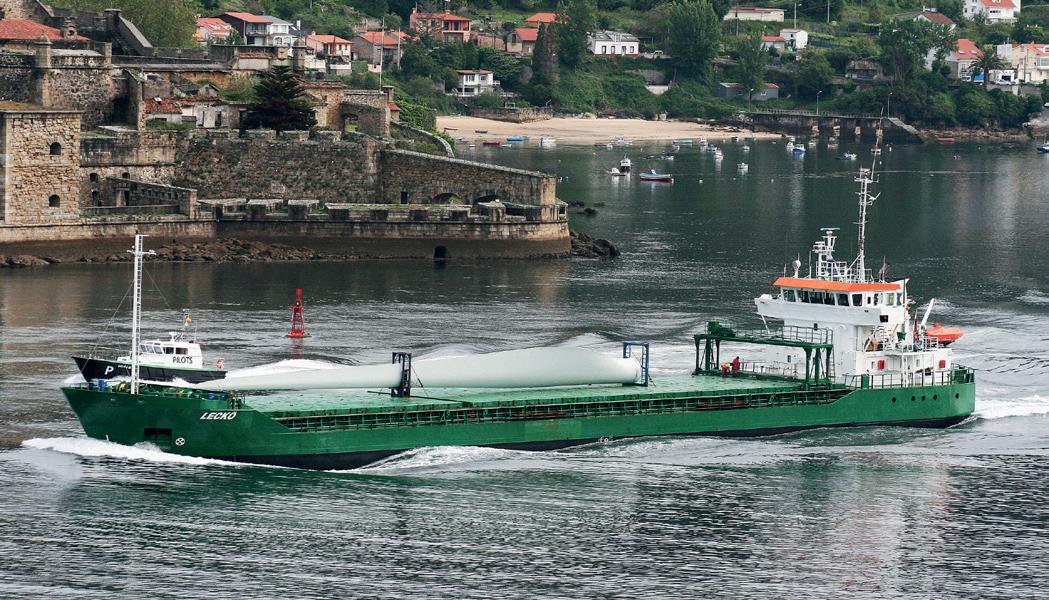
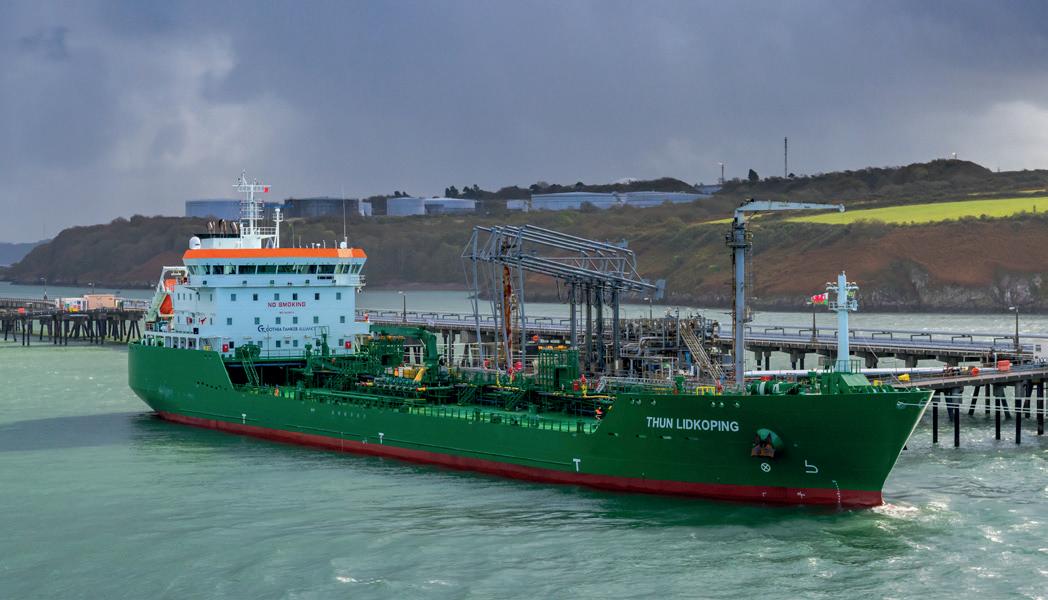
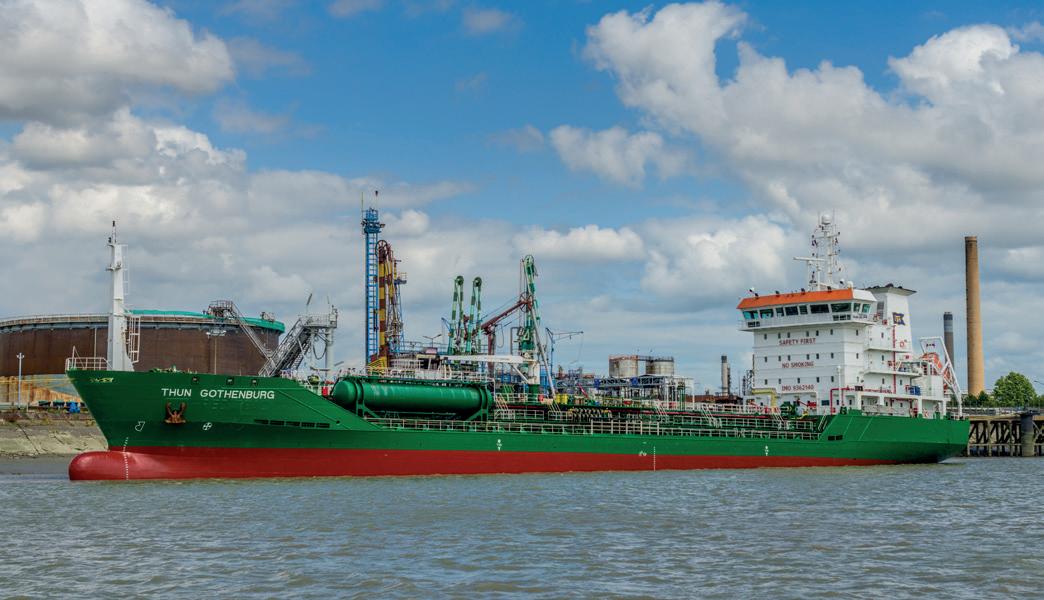
Thun Gothenburg Master Chief Officer 2nd Officer 3rd Officer Chief Engineer 2nd Engineer 3rd Engineer V. Beloborodov E.G. Pineda J.A. Ampodia B.L. Nabehet V. Skorobogatov A. Y. Pura R. Pahamutang O.V. Jorolan M.V.G.T. Gabriel Tero B.O. Esteban J.N. Ceros V. Marcelo J M V Desabella Pumpman AB AB AB OS Cook/AB Thun Lidköping Thun Liffey Thun Liverpool Master Chief Officer 2nd Officer 3rd Officer 3rd Officer Chief Engineer 2nd Engineer 3rd Engineer Bosun AB AB AB OS Cook/AB Apprentice Apprentice F.B.A. van der Elsen V. Khalkin A. Kalnev S. Elagin J. A. C. Cajucom N. Klyuev I. Gordin J.P. D Dumaran E.P. Parco Carls R. Zarate RC Malinis E. Marata Undaloc J. II Felisilda F. Wania M. Zwan van der K.L. van Weije Y. Batashev D. Lisitskiy J.C. De Los Reyes M.P.J. Hodge B.F.G. Verginie J.A. Enem P.G. Leeuwestein D. Lupescu G. Garin C. Post T.B. Torres J.K. Abalorio R.L. Dizon J. Palmes J.C.A Abueva H. Bognot P.J van Houten A. Syrovatkin E.C. Matinong M. C. Victorino C.J.B. Turalde A.D. Axalan A.G. Alega O. Mutalienko G.B. Jimenez V. Pavlovskii J.C. Colo V. Demchenko J. E. A. RAMOS L. Onas M. Woning S.N. Schaap Thun London Thun Lundy Master Chief Officer 2nd Officer 3rd Officer 3rd Officer Chief Engineer 2nd Engineer 3rd Engineer Bosun AB AB AB OS Cook/AB Apprentice C.H. Meijvogel A. Korovkin J. Jakubowski J.P. Santana J.A. Adornado S. Ridukha E. Z. Flores J Gutierrez A.C. Escabusa J P M Driz E.T. Lagura M.M. Baldicantos R.C. S. Flores H. V. Hernandez S. Wageningen van P. Wiwacz A. Zamyatkin V.R. van Dijk R.M. Salva J.C. Sedillo V. Belotserkovskiy D.B. Banlota U. Saberon A.G. Singco L.S. Conde R.M. Adlawan J.L. Bete A. M. Maya S. V. Braza S.J. Alvarez Pinto Kinne Leckö Lurö Master Chief Officer 2nd Officer Chief Engineer AB AB Cook/AB M. Komshin A. Vlasov G.K. Salilin A. Dronov J.T.A. Abelong T.J. Ugalino J. G. Denaga V Zubov D. Osipov J.P. Cabonegro A. Kuznetsov F.M. Granada A. Ledama D.A. Diamola N. Belianin A. Gudkov B. Reynon M. Voronin M.A. Duja C. Ompoy C.B.B Bilaoen Tuna Master Chief Officer 2nd Officer Chief Engineer AB AB Cook/AB A Reznik M. Grebenkin A.P. Reandino E. Peretyagin V. Servidad J.P. Jaway E. Lopez Alice Helge Master Chief Officer 2nd Officer Chief Engineer AB AB Cook/AB S. Grishin V. Stepanov N.L. Bautistalla N. Kosov R.J. Carbonell H.S. Lavesores E.L.G. Garcia A. Vladimirov Y. Fioktistov D.K. Riel V. Makaruk R.M.P Paguia Y.S. Kwan C. Reynon
Kalkvik Sunnanhav
Technical & Crew Management
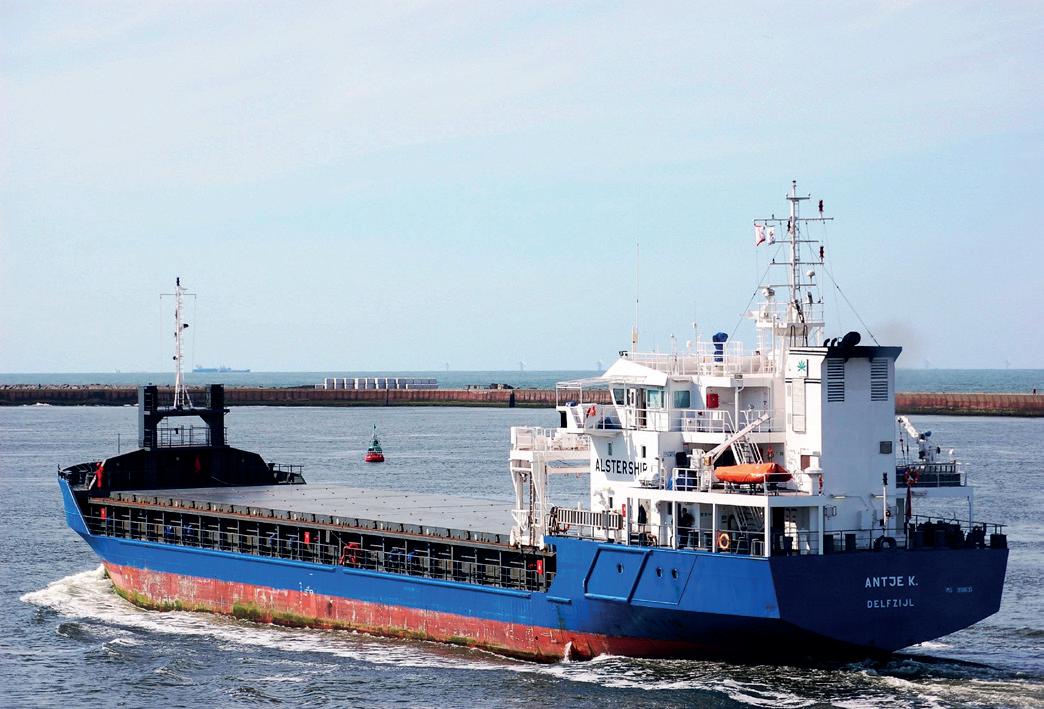
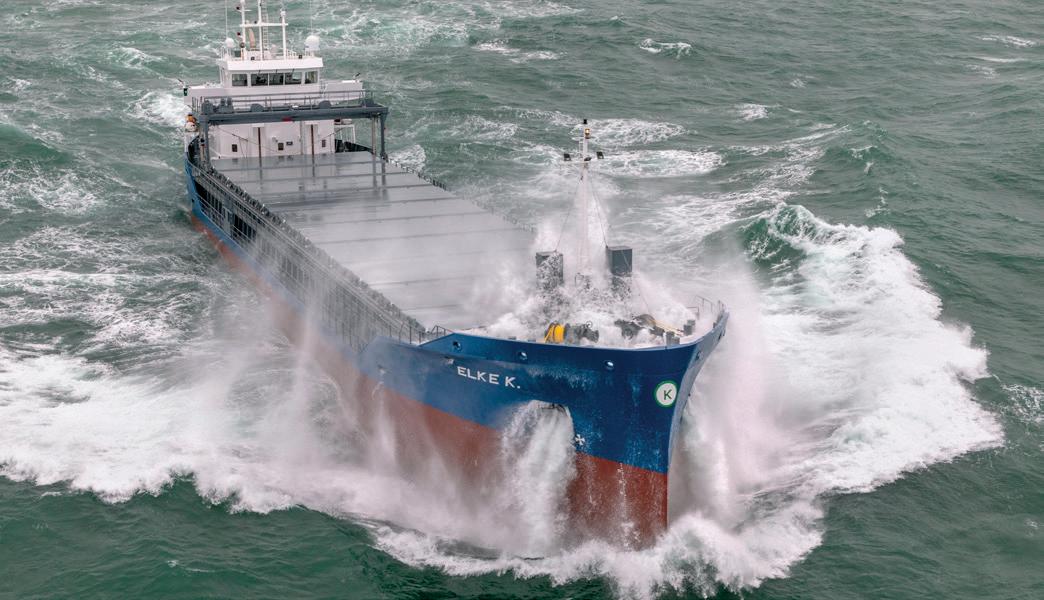
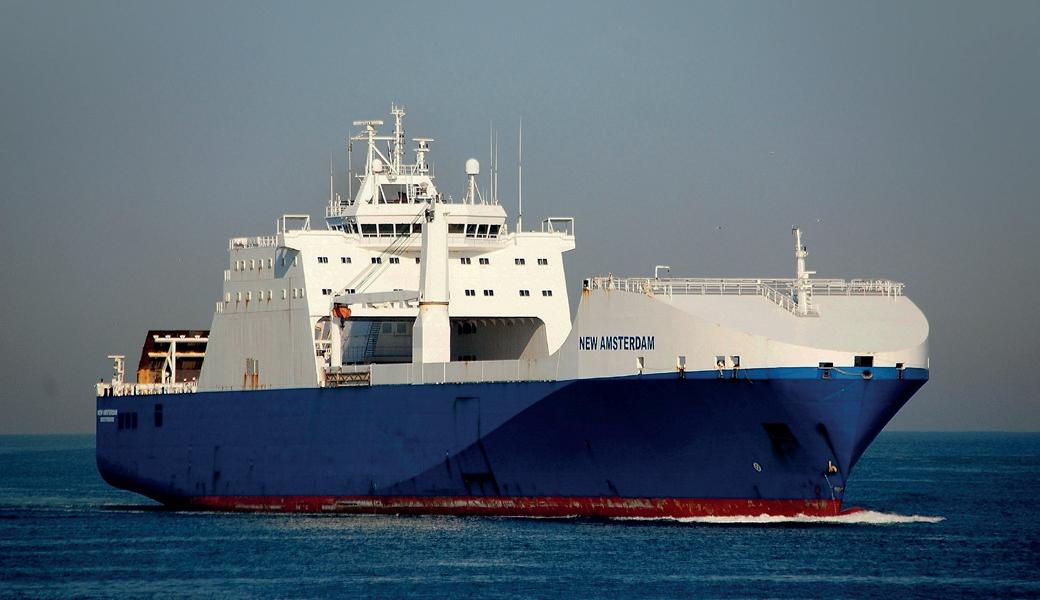
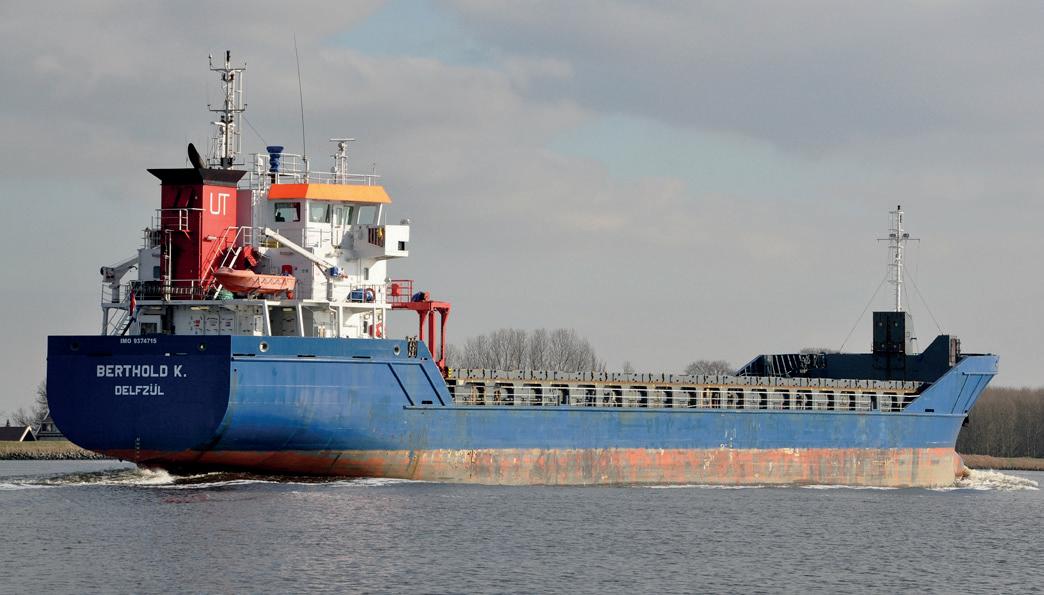
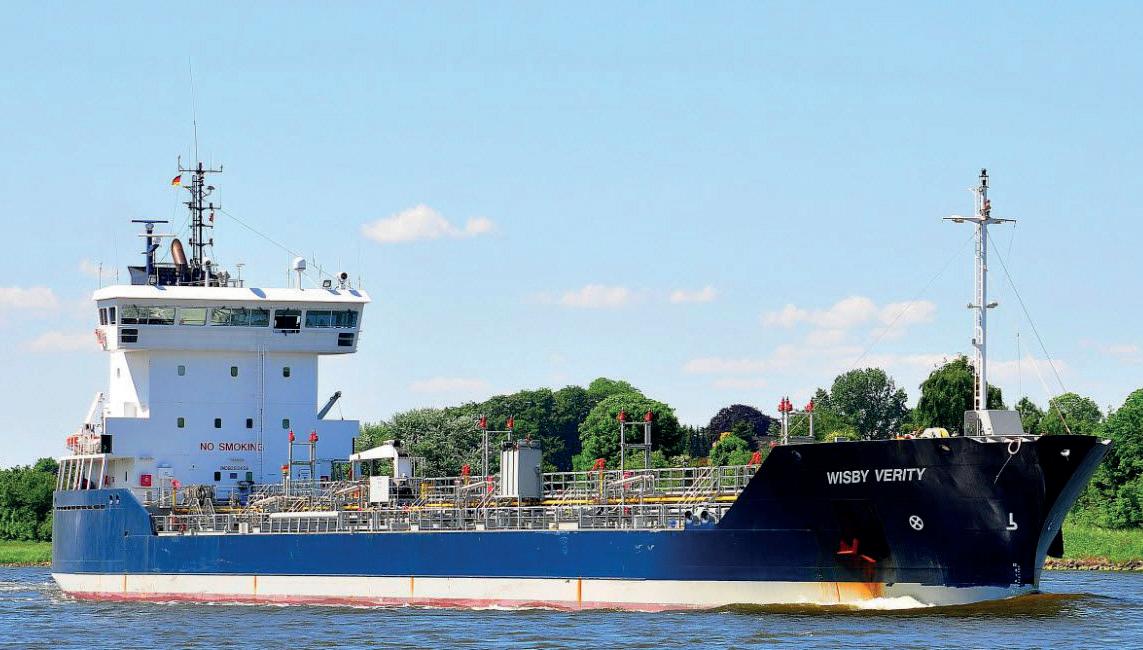
46 Wisby Argan Wisby Verity Wisby Wave Master Chief Officer Chief Officer 2nd Officer 2nd Officer 3rd Officer 3rd Officer Chief Engineer 2nd Engineer ETO Motorman Fitter AB AB AB N Guzman R Daniel A Gregorio R.N. Atienza R.C. Onsay A Matucad A Arcos R Labra H Pabilona R Daguplo P Naluis F Celerio L.M Ramirez A. Clarion B Macaylas M Cagata J.G.D. Marquez E. Pepito Fuerza S Tiongco W Santiago J Sumugat J Manansala M Cueno G Alcantara G Belarmino E Encargues R Amano D Yuzon S. Lysak D Adel L Garcia J.R. Bagares W Agravante J Delfin berthold k Master Chief Officer 2nd Officer Chief Engineer A. Boronenko E. Saleev R.M. Sambrano M. Burnashev J.M.D. Dile Duran C.S.O. Omandam M. C. Collado F.S. Barawed Motorman AB AB Cook/AB New Amsterdam Elisa K. Elisabeth K. Elke K. Master Chief Officer 2nd Officer Chief Engineer Wiper AB AB Cook/AB S.D. Lipinski D. Minin J.R.P. Pedregosa F. Varganov V. Tokarev H.P. Bullecer M.P.Q.E. Quino Escalera M.A.L Leyesa A. Romanovskii G. Zheleznyy I. Hukov S.V. Koval A. Evoyan V.S. Azhukaitis S. Petrov S. Kulitskov A. Kushnir S. Vyshinsky Y. Voropanov A. Trofimov A. Bovkin M.A. Perez J.H. Ibong R.CJ De Jesus Antje K. Clara K. Daniel K. Master Chief Officer 2nd Officer Chief Engineer Wiper AB AB Cook A. Bykov M. Sundukov E. Demidovich G. Mikhaylov A. Mikhalkov E. Zhuravlev A.P. Gudymchuk S. Alexanderov F. Oskalin V. Baryshnikov A. Chernovolov A. Mikhaylyuta A. Dmitriev V. Semenov A. Kharitonov V. Evglevskiy M. Tulupov D. Vargasov S. Demianovskii L. Shchekoldin A. Rodionov E. Egorov A. Tokarev N.V. Bobyr John-Paul K. Karl-Jakob K. Master Chief Officer 2nd Officer Chief Engineer Wiper AB ABn Cook A. Eliseev D. Ganin A. Zykov A. Kulikovskii S. Ageev A.K. Kasimov A. Satonin I. Katerov A. Andreev I. Kastrov D. Sitnikov V Titov M. Novikov O. Petrov V. Novgorodskii A. Kolesnichenko
Nordic Diana
Hereby we want to inform you that the Nordic Diana has been handed over to its new owners on 18 August 2023.
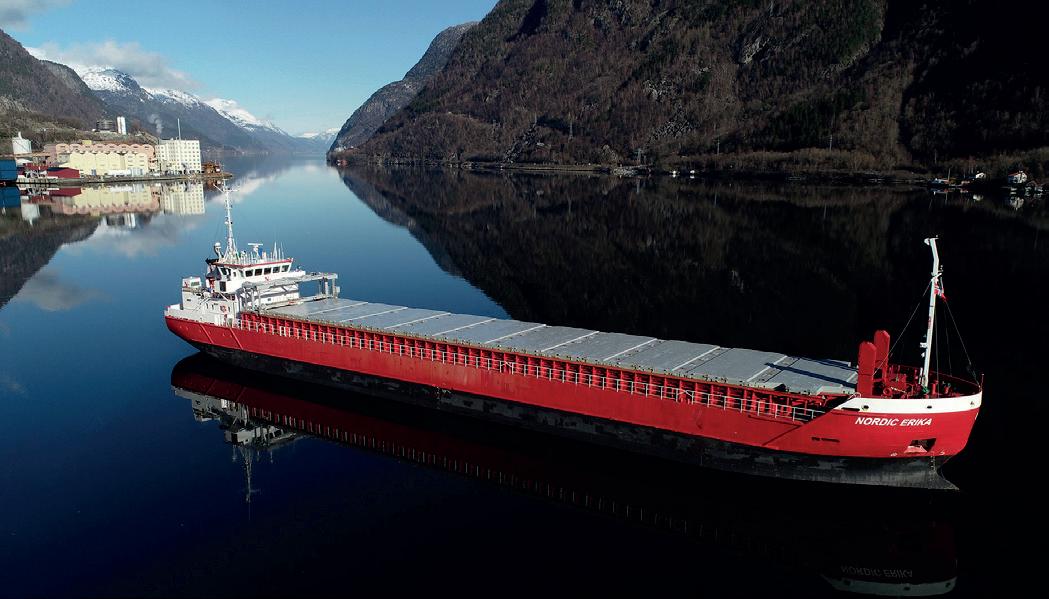
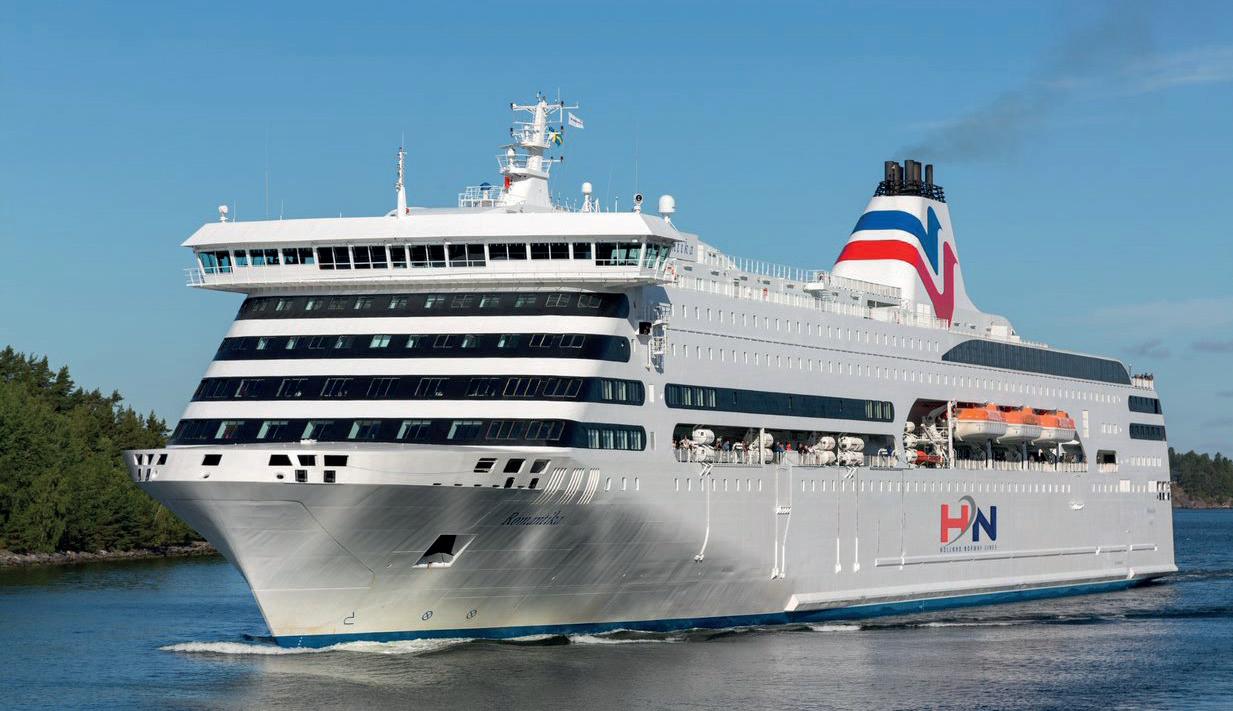
Romantika
Holland Norway Lines, owner of the mv Romantika, was declared bankrupt on Monday 4 September 2023. The project has required considerable commitment and effort from all of us. Despite our collective efforts, we must acknowledge that Holland Norway Lines has not achieved the intended results. This news impacts all of us, from our crew members to our suppliers.
We would like to thank everyone who has contributed to the project! Your help is well known and, despite the outcome, very much appreciated!
47
Nordic Erika O. Kamay Erimso E Cahyono V. Voronchenko F.P. Matulessy K Wijaya Master Chief Officer 3rd Officer Chief Engineer AB Cook/AB

together








 Colofon
Ellen Brugma Stephanie Kanon René Boerema Wendy van der Laan
Editor
Lucie Nicolai
Colofon
Ellen Brugma Stephanie Kanon René Boerema Wendy van der Laan
Editor
Lucie Nicolai








 Lucie Nicolai, Chief Corporate Communications & PR Officer Renée Seggelinck, PR & Communications Specialist
Lucie Nicolai, Chief Corporate Communications & PR Officer Renée Seggelinck, PR & Communications Specialist




























 Photo captured by Captain Robert Irek in port of Slite
Photo captured by Captain Robert Irek in port of Slite





















































